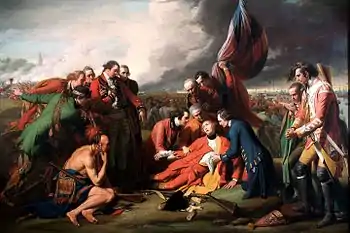List of last words
Last words or final words are a person's final articulated words, stated prior to death or as death approaches. Often they are recorded because of the decedent's fame, but sometimes because of interest in the statement itself. (People dying of illness are frequently inarticulate at the end,[1] and in such cases their actual last utterances may not be recorded or considered very important.) Last words may be recorded accurately, or, for a variety of reasons, may not. Reasons can include simple error or deliberate intent. Even if reported wrongly, putative last words can constitute an important part of the perceived historical records (according to Robin Winks, "[H]istory is what people believe to be true")[2] or demonstration of cultural attitudes toward death at the time.[1]
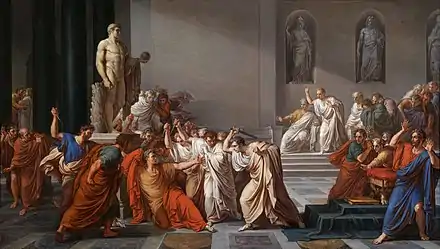
Charles Darwin, for example, was reported to have disavowed his theory of evolution in favor of traditional religious faith at his death. This widely disseminated report served the interests of those who opposed Darwin's theory on religious grounds. However, the putative witness had not been at Darwin's deathbed or seen him at any time near the end of his life.[3]
Both Eastern and Western cultural traditions ascribe special significance to words uttered at or near death,[4] but the form and content of reported last words may depend on cultural context. There is a tradition in Hindu and Buddhist cultures of an expectation of a meaningful farewell statement; Zen monks by long custom are expected to compose a poem on the spot and recite it with their last breath. In Western culture particular attention has been paid to last words which demonstrate deathbed salvation – the repentance of sins and affirmation of faith.[3]
Chronological list of last words
In rising chronological order, with death date specified. If relevant, also the context of the words or the circumstances of death are specified. If there is controversy or uncertainty concerning a person's last words, this is described in footnotes. For suicide notes, see Suicide note#Notable people who left suicide notes.
Pre-5th century
- "Draw thy sword, and slay me, that men say not of me, A women slew him."[5][6][7]
- ("כֵלָ֗יו וַיֹּ֤אמֶר לוֹ֙ שְׁלֹ֤ף חַרְבְּךָ֙ וּמ֣וֹתְתֵ֔נִי פֶּן־יֹ֥אמְרוּ לִ֖י אִשָּׁ֣ה הֲרָגָ֑תְהוּ וַיִּדְקְרֵ֥הוּ נַעֲר֖וֹ וַיָּמֹֽת׃")
- — Abimelech, king of Shechem (12th century BC). Mortally wounded in battle by a stone thrown by a woman, he asked his armor-bearer to kill him.
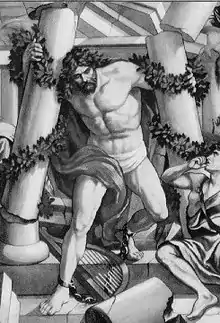
- "Let me die with the Philistines."[8][9]
- ("תמות נפשי עם־פלשתים")
- — Samson, judge of the Israelites (c. 1078 BC), prior to bringing down pillars of Philistine temple and killing 3000 people along with himself
- "Draw thy sword, and thrust me through therewith; lest these uncircumcised come and thrust me through, and abuse me."[10][11]
- ("שְׁלֹף חַרְבְּךָ וְדָקְרֵנִי בָהּ פֶּן יָבוֹאוּ הָעֲרֵלִים הָאֵלֶּה וּדְקָרֻנִי וְהִתְעַלְּלוּ בִי")
- — Shaul, king of Israel (c. 1012 BC), to his servant during the Battle of Mount Gilboa
- "My reputation carried me safe through Greece, but the envy it excited at home has been my ruin."[12][note 1]
- — Anacharsis, Scythian philosopher (6th century BC), mortally wounded with an arrow by his brother, King Caduidas
- "You know that during the long time I have been in the world, I have said and done many things; upon mature reflection, I find nothing of which I have cause to repent, excepting a case which I will now submit to your decision, that I may know whether I have acted properly or not.
- "On a certain occasion, I chanced to be one of three who sat in judgment on one of my own good friends, who, according to the laws, should have been punished with death. I was greatly embarrassed. One of two things was inevitable—either to violate the law or condemn my friend. After careful consideration, I devised this expedient. I delivered with such address all the most plausible arguments in behalf of the accused, that my two colleagues found no difficulty in acquitting him, and yet I, myself, condemned him to death without assigning any reason for my conduct. Thus I discharged two duties, those of friend and judge; yet I feel in my conscience something which makes me doubt whether my conduct was not criminal."[13]:131—132
- — Chilon of Sparta, philosopher (6th century BC), speaking to his friends before his death
- "It is better to perish here than to kill all these poor beans."[13]:130[note 2]
- — Pythagoras, Ionian Greek philosopher and founder of Pythagoreanism (495 BC), refusing to escape with his students from the Crotonians through a fava bean field
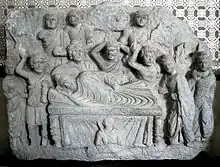
- "All compounded things are subject to vanish. Strive with earnestness."[14]
- ("वयधम्मा सङखार्आ अप्पमादेन सम्पादेथा")
- — Siddhārtha Gautama Buddha, Indian sage who founded Buddhism (c. 483 BC)
- "Heaven has turned against me. No wise ruler arises, and no one in the Empire wishes to make me his teacher. The hour of my death has come."[note 3]
- — Confucius, Chinese philosopher who founded Confucianism (479 BC)
- "Can you turn rainy weather into dry?"[13]:128
- — Heraclitus, Greek philosopher (c. 475 BC), asking his physicians for relief from dropsy
- "For, no Athenian, through my means, ever wore mourning."[13]:37
- — Pericles, Greek statesman (429 BC), discussing with his friends what his greatest accomplishment had been
- "Give the boys a holiday."[7][15][note 4]
- — Anaxagoras, Greek philosopher (c. 428 BC), in response to citizens of Lampsacus asking how they could honor his memory
- "Men, it is good for me to die on this spot, where honor bids me; but for you, yonder your path lies. Hurry and save yourselves before the enemy can close with us."[7]
- — Anaxibius, Spartan admiral (388 BC), before being killed in Athenian ambush
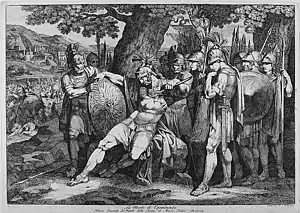
- "Then I die happy."[13]:46
- — Epaminondas, Greek general and statesman of Thebes (362 BC). He pulled out the weapon with which he had been impaled in battle once he heard the enemy was fleeing.
- "But Alexander, whose kindness to my mother, my wife, and my children I hope the gods will recompense, will doubtless thank you for your humanity to me. Tell him, therefore, in token of my acknowledgement, I give him this right hand."[13]:24—25
- — Darius III, Achaemenid King of Kings of Persia (330 BC), to a man who gave him water as he was dying
- "To the strongest."[7][16][note 5]
- ("τῷ κρατίστῳ")
- — Alexander the Great, conqueror and king of Macedonia (c. 11 June 323 BC), when asked to whom his vast empire should belong after his death
- "Now, as soon as you please you may commence the part of Creon in the tragedy, and cast out this body of mine unburied. But, O gracious Neptune, I, for my part, while I am yet alive, arise up and depart out of this sacred place; though Antipater and the Macedonians have not left so much as thy temple unpolluted."[13]:46
- — Demosthenes, Greek statesman and orator (12 October 322 BC), to Archias of Thurii; Demosthenes had taken poison to avoid arrest by Archias
- "Ah! poor hump-back! thy many long years are at last conveying thee to the tomb; thou shalt soon see the palace of Pluto."[13]:125
- — Crates of Thebes, Cynic philosopher (c. 285 BC), surveying himself when about to die
- "Now, farewell, and remember all my words!"[18]
- — Epicurus, Greek philosopher (270 BC); the majority of his writings are now lost
- "I come, I come, why dost thou call for me?"[19][note 6]
- — Zeno of Citium, Greek philosopher and founder of Stoicism (c. 262 BC), quoting Aeschylus' play Niobe and striking the ground with his hand after sustaining a minor injury, which he considered a sign that he was about to die. He then killed himself.
- "These, O Cephalon, are the wages of a king's love."[7][13]:109
- — Aratus of Sicyon, Hellenistic Greek politician and military commander (213 BC), after expectorating blood while allegedly being slowly poisoned on the orders of Philip V of Macedon, his former friend
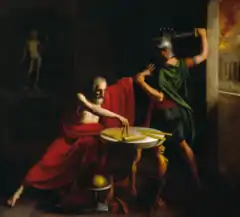
- "Do not disturb my circles."[7][20][21]
- ("Μη μου τους κύκλους τάραττε!")
- — Archimedes, Greek mathematician (c. 212 BC), to a Roman soldier who interrupted his geometric experiments during the capture of Syracuse, whereupon the soldier killed him
- "Go and give the ass a drink of wine to wash down the figs."[18]
- — Chrysippus, Greek philosopher (c. 206 BC), before dying of laughter
- "It is well that we have not been every way unfortunate."[13]:115
- — Philopoemen, Greek general and statesman (183 BC), sent a cup of poison to kill himself after being captured in battle. He asked the messenger with the poison about his cavalry and was told that most of them had escaped.
- "Let us ease the Roman people of their continual care, who think it long to await the death of an old man."[22]
- ("Liberemus diuturna cura populum Romanum, quando mortem senis exspectare longum censent.")
- — Hannibal, Carthaginian general (c. 182 BC)
- "Let no one weep for me, or celebrate my funeral with mourning; for I still live, as I pass to and fro through the mouths of men."[13]:74[23]
- — Ennius, writer and poet of the Roman Republic (c. 169 BC); lines dictated to be engraved on his memorial. Only fragments of his works now survive.
- "It is a cold bath you give me."[13]:18
- — Jugurtha, king of Numidia (104 BC), being lowered by the Romans into a damp dungeon to starve to death
- "When will the republic find a citizen like me?"[13]:48
- — Marcus Livius Drusus, Roman politician and reformer (91 BC), after being stabbed by unknown assassin
- "Fear not true Pharisees, but greatly fear painted Pharisees."[15]
- — Alexander Jannaeus, king of Judea (c. 76 BC), to his wife

- "I am not mistaken, surely, in believing you to have been formerly my fellow-soldier."[13]:118
- — Pompey, Roman general and statesman (28 September 48 BC), to Lucius Septimius, one of his assassins
- "You too, my child?"[note 7][25][26]
- ("καὶ σὺ, τέκνον;")
- — Julius Caesar, Roman dictator (15 March 44 BC), discovering that his stepson Brutus was among his murderers
- "There is nothing proper about what you are doing, soldier, but do try to kill me properly."
- ("Nihil propriis quid facis, latro, autem non tentant recte ut interficias me.")
- — Cicero, Roman statesman (7 December 43 BC), facing an assassin sent by an enemy
- "Through too much fondness of life, I have lived to endure the sight of my friend taken by the enemy before my face."[13]:121
- — Gaius Cassius Longinus, Roman senator and general, one of Julius Caesar's assassins (3 October 42 BC), erroneously believing his comrade Titinius had been captured by Mark Antony's forces at the Battle of Philippi. Cassius then killed himself.
- "Yes, indeed, we must fly; but not with our feet, but with our hands."[13]:122
- — Marcus Junius Brutus, Roman senator and assassin of Julius Caesar (23 October 42 BC), after defeat at the Battle of Philippi. He then bade his friends farewell before killing himself.
- "You must not pity me in this last turn of fate. You should rather be happy in the remembrance of our love, and in the recollection that of all men I was once the most famous and the most powerful, and now, at the end, have falled not dishonorably, a Roman by a Roman vanquished."[7][note 8]
- — Mark Antony, Roman politician and general (1 August 30 BC); to Cleopatra before his suicide
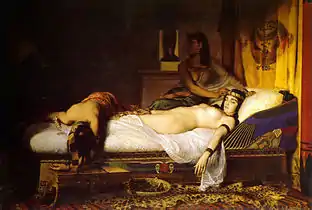
- "So here it is!"
- ("Τόσο εδώ!")
- — Cleopatra, pharaoh of Egypt (12 August 30 BC), right before she reportedly committed suicide by letting an asp bite her
- "Extremely well, and as became the descendant of so many kings."[13]:106
- — Charmion, servant to Cleopatra (12 August 30 BC), when one of Augustus' men asked her, "Was this well done of your lady, Charmion?" She then fell dead.
- "The drama's over. Applaud."[25][27][28][note 9][note 10]
- ("Fabula acta est. Plaudite.")
- — Augustus, Roman emperor (19 August AD 14)
- "It is finished."[note 11]
- ("Ha m'shalam.")
- — Jesus, founder of Christianity (c. AD 30), right before his death by crucifixion
- "It is not painful, Paetus."[15]
- ("Non dolet, Paete!")
- — Arria, Roman woman (AD 42), to her husband, Aulus Caecina Paetus. He had been condemned to death but given permission to kill himself; when he hesitated to do so, his wife stabbed herself first and handed the dagger to him.
- "Strike here! Level your rage against the womb which gave birth to such a monster."[7][15]
- — Agrippina the Younger, mother of Nero (23 March AD 59), to her murderer
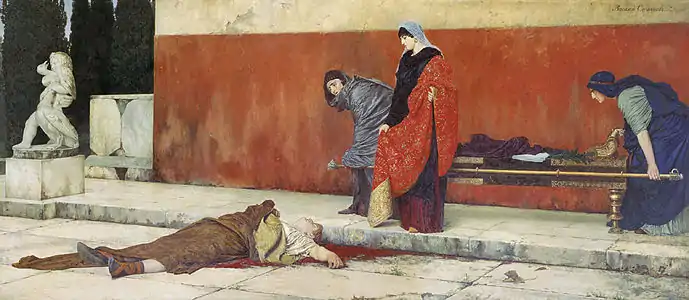
- "Late! That's fidelity!"[24]
- ("Sero... Haec est fides")
- — Nero, Roman emperor (9 June AD 68), to a soldier trying to save him after his suicide
- "Strike, if it be for the Romans' good."[13]:16
- — Galba, Roman emperor (15 January AD 69), prior to beheading by supporters of Otho
- "Go and show yourself to the soldiers, lest they cut you to pieces for being accessory to my death."[13]:25
- — Otho, Roman emperor (16 April AD 69), to a freedman, prior to committing suicide
- "Woe, I think I'm turning into a god... An emperor should die on his feet."[29][30]
- ("Vae, puto, deus fio... imperatorem stantem oportet mori.")
- — Vespasian, Roman emperor (24 June AD 79), ironically alluding to the Roman practice of posthumously deifying former emperors, before he collapsed and died when attempting to stand up
- "Equanimity."[7][13]:17
- ("Æquanimitas.")
- — Antoninus Pius, Roman emperor (7 March AD 161), giving the password for the night-watch
- "Think more of death than of me."[15]
- — Marcus Aurelius, Roman emperor and philosopher (17 March AD 180)
- "Hurry, if anything remains for me to do."[13]:22
- ("Adeste, si quid mihi restat agendum.")
- — Septimius Severus, Roman emperor (4 February AD 211)
- "I am making my last effort to return that which is divine in me to that which is divine in the Universe."[31][note 12]
- — Plotinus, Hellenistic philosopher (AD 270)
- "Let this word of mine be kept by you, so that no one shall know in what place my body reposes, for I shall receive it incorruptible from my Saviour in the resurrection of the dead. And distribute my garments thus: To Athanasius, the bishop, give one of my sheepskins, and the cloak under me, which was new when he gave it me, and has become old by my use of it; and to Serapion, the bishop, give the other sheepskin; and do you have the hair-cloth garment. And for the rest, children, farewell, for Anthony is going, and is with you no more."[15]
- — Anthony the Great, Christian monk from Egypt (17 January AD 356)
- "And yet Thou hast conquered, O Galilean!"[13]:30
- ("Vicisti, Galiaee.")
- — Julian, Roman emperor (26 June AD 363), mortally wounded in battle. He had rejected Christianity in favor of paganism; according to some accounts, he was assassinated by a Christian.
- "Old though he be, he is the best of all."[7][note 13]
- — Ambrose, Bishop of Milan (4 April AD 397), when Simplician was mentioned as his possible successor
5th to 15th centuries
- "Glory to God for all things!"[33][note 14]
- ("δόξα τῷ θεῷ πάντων ἕνεκεν")
- — John Chrysostom, Early Church Father and Archbishop of Constantinople (14 September 407), while traveling deeper into exile
- "And me as I am going towards the God of mine, and I thank His name, as the Lord gave me everything bless His name. And I am telling you, to stand firm on your faith and to search for death for Christ for His name and you will find the permanent glory. I for my life glorified you and all of our race. And do not insult our home and do not abandon the love of the Greeks."[34]
- ("მე ესე რა წარვალ წინაშე ღმრთისა ჩემისა, და ვმადლობ სახელსა მისსა, რამეთუ არა დამაკლო გამორჩეულთა წმიდათა მისთა. აწ გამცნებ თქუენ, რათა მტკიცედ სარწმუნოებასა ზედა სდგეთ და ეძიებდეთ ქრისტესთჳს სიკუდილსა სახელსა მისსა ზედა, რათა წარუვალი დიდება მოიგოთ. მე ჴორციელებრითა დიდებითა გადიდენ თქუენ ნათესავთა ჩემთა. და სახლსა ჩუენსა ნუ შეურაცხჰყოფთ, და სიყუარულსა ბერძენთასა ნუ დაუტეობთ".)
- — Vakhtang I, Georgian monarch (502/22), to his son Dachi.
- "Here must I stop. What follows, let Baithen write."[13]:173
- — Columba, Irish abbot and missionary evangelist (8 June 597), ceasing to transcribe a Psalter
- "Oh God, the Friend Most High!"[35][36][37]
- ("اللَّهُمَّ الرَّفِيقَ الأَعْلَى")
- — Muhammad, Prophet of God in Islam (8 June 632)
- "I desire that whatever merits I may have gained by good works may fall upon other people. May I be born again with them in the heaven of the blessed, be admitted to the family of Mi-le, and serve the Buddha of the future, who is full of kindness and affection. When I descend again upon earth, to pass through other forms of existence, I desire at every new birth to fulfill my duties toward Buddha, and arrive at the end to the highest perfect intelligence."[13]:139
- — Xuanzang, Chinese Buddhist monk, scholar, traveler and translator (5 February 664)
.jpg.webp)
- "You speak truth, all is finished now. Glory to God."[13]:175
- — Bede, English Benedictine monk (26 May 735); to a scribe to whom he was dictating a translation of the Gospel of John
- "Lord, into Thy hands I commend my spirit."[13]:25[22][38]
- — Charlemagne, European monarch (28 January 814), quoting Jesus
- "Thou my dear son, set thee now beside me, and I will deliver thee true instructions. My son, I feel that my hour is coming. My countenance is wan. My days are almost done. We must now part. I shall to another world, and thou shalt be left alone in all my wealth. I pray thee (for thou art my dear child) strive to be a father, and a lord to thy people. Be thou the children's father, and the widow's friend. Comfort thou the poor, and shelter the weak; and, with all thy might, right that which is wrong. And, son, govern thyself, by law; then shall the Lord love thee, and God above all things shall be thy reward. Call thou upon him to advise thee in all thy need, and so shall he help thee, the better to compass that which thou wouldest."[7][13]:20–21[note 15]
- — Alfred the Great, king of the Anglo-Saxons (26 October 899), to his son, Edward the Elder
- "I have now reigned above fifty years in victory or peace; beloved by my subjects, dreaded by my enemies, and respected by my allies. Riches and honors, power and pleasure, have waited on my call, nor does any earthly blessing appear to have been wanting to my felicity. In this situation, I have diligently numbered the days of pure and genuine happiness which have fallen to my lot: they amount to Fourteen:—O man! place not thy confidence in this present world!"[7][39][note 16]
- — Abd al-Rahman III, first Caliph of Córdoba (15 October 961)
- "I have loved justice and hated iniquity; therefore I die in exile."[13]:176[40]
- ("Dilexi iustitiam et odivi iniquitatem propterea morior in exilio.")
- — Pope Gregory VII (25 May 1085)
- "Then to our blessed Lady Mary, the mother of God, I commend myself. May she, by her holy intercessions, reconcile me to our Lord and Savior, Jesus Christ. God be merciful to—"[13]:26
- — William the Conqueror, King of England (9 September 1087), after hearing bell ringing Prime
- "Yes, if it be His will, I shall obey it willingly. But were He to let me stay with you a little longer till I have resolved a problem about the origin of the soul, I would gladly accept the boon; for I do not know whether anyone will work it out when I am gone. If I could but eat, I think I should pick up a little strength. I feel no pain in any part of my body; only I cannot retain nourishment, and that exhausts me."[7][note 17]
- — Anselm of Canterbury, Archbishop of Canterbury (21 April 1109)
- "I don't know."[7][41][42]
- ("Je ne sais.")
- — Peter Abelard, French philosopher and theologian (21 April 1142)
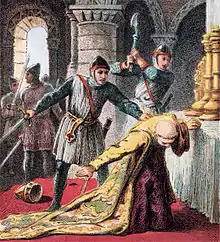
- "For the name of Jesus and the protection of the church I am ready to embrace death."[43][44][note 18]
- — Thomas Becket, Archbishop of Canterbury (29 December 1170), to his murderers
- "Let not my end disarm you, and on no account weep or keen for me, lest the enemy be warned of my death."[40]
- ("Миний төгсгөлийг чамаас гуйхгүй, ямар ч шалтгаангүйгээр битгий уйлж, дуулгавартай байгаарай, дайсан минь миний үхлээс сэрэмжлүүлцгээе.")
- — Genghis Khan, warlord and khan of Mongolia (18 August 1227)
- "I see my God. He calls me to Him."[7]
- — Anthony of Padua, Portuguese Catholic priest and Franciscan friar (13 June 1231)
- "Don't cut my face."[45]
- ("Ikke hugg meg i ansiktet")
- — Skule Bårdsson, Norwegian nobleman (24 May 1240), before being killed by supporters of King Haakon IV of Norway
- "I will enter thy house. I will worship in Thy sanctuary."[13]:17
- — Louis IX of France (25 August 1270)
- "I am on the way to Spires to visit the kings, my predecessors."[13]:26
- — Rudolf I of Germany (15 July 1291); he was buried at Speyer Cathedral
- "I have not told half of what I saw."[46]
- ("Non ho detto metà di quello che ho visto.")
- — Marco Polo, Venetian traveller in Asia (c. January 9, 1324), responding to skepticism about the content of his memoir, The Travels of Marco Polo
- "Now, God be with you, my dear children. I have breakfasted with you and shall sup with my Lord Jesus Christ."[43][47]
- — Robert the Bruce, King of Scotland (7 June 1329)
- "Jesus."[13]:18
- — Edward III of England (21 June 1377), kissing a crucifix
- "Make my skin into drumheads for the Bohemian cause."[48]
- — Jan Žižka, Czech general (11 October 1424)
- "I die content, after living the prescribed time, and leaving you, my sons, in affluence and health, placed in such a situation as, if you follow my example, will enable you to live honored and respected. I recall nothing in my life with so much pleasure as having given offence to no one, and having tried to serve all men as far as possible. I advise you to act thus, if you would live securely, accepting only those honors as the laws and favor of the state confer upon you; for it is the exercise of power that has been violently—not voluntarily—obtained, that occasions hatred and strife."[13]:89
- — Giovanni di Bicci de' Medici, Italian banker (February 1429)
- "O Gabriel, Gabriel, better would it have been for you to have been neither pope, nor cardinal, nor bishop, but to have finished your days as you commenced them, following peaceably in the monastery the exercises of your order."[13]:167
- — Pope Eugene IV (born Gabriele Condulmer) (23 February 1447)
- "Will not all my riches save me? What, is there no bribing death?"[49]:195[note 19]
- — Henry Beaufort (11 April 1447), Cardinal, Bishop of Winchester
- "Naciera yo hijo de un labrador e fuera fraile del Abrojo, que no rey de Castilla"[50]
- — John II of Castile (22 July 1454), King of Castile
- "I know only Jesus the crucified."[13]:167
- — Wessel Gansfort, Dutch theologian and humanist (4 October 1489)
16th century
- "Into Your hands, O Lord, I commend my spirit."[13]:62[51]
- ("In manus tuas, Domine, commendo spiritum meum.")
- — Christopher Columbus, Italian explorer (20 May 1506), quoting Jesus

- "I have offended God and mankind because my work did not reach the quality it should have."[28][49]:196[52][53][note 20]
- ("Ho offeso Dio e l'umanità perché il mio lavoro non ha raggiunto la qualità che dovrebbe avere.")
- — Leonardo da Vinci, Italian artist and scientist (2 May 1519), to King Francis I of France
- "I am curious to see what happens in the next world to one who dies unshriven."[54]
- — Pietro Perugino, Italian artist (1523), declining the last rites
- "I desire to go to hell and not heaven. In the former place I shall enjoy the company of popes, kings, and princes, while in the latter are only beggars, monks, and apostles."[18][49]:196
- — Niccolò Machiavelli (21 June 1527), Italian Renaissance diplomat, philosopher and writer
- "Master Kyngston, I pray you have me commended to his Grace, and beseech him, in my behalf, to call to mind all things that have passed between us, especially concerning good Queen Katharine and himself, and then shall his Grace's conscience know whether I have offended him or not. He is a prince of most royal courage, and rather than miss any part of his will, he will endanger one-half of his kingdom; and, I do assure you, I have often knelt before him, sometimes for three hours together, to persuade him from his appetite, and could not prevail.
- "And, Master Kyngston, had I but served God as diligently as I have served the king, he would not have given me over in my gray hairs. But this is my just reward for my pains and study, not regarding my service to God, but only my duty to my Prince."[13]:170—171
- — Thomas Wolsey, English archbishop, statesman and cardinal (29 November 1530); to the Lieutenant of the Tower of London, after falling ill on the way to London under arrest for treason
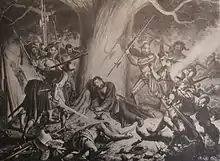
- "They may kill the body, but not the soul."[13]:169
- — Huldrych Zwingli, priest and leader of the Reformation in Switzerland (11 October 1531), killed at the Battle of Kappel
- "This is not my home."[15]
- — Ludovico Ariosto, Italian poet (6 July 1533)
- "Begone, thou wretched beast, which hast utterly undone me."[15][7][note 21]
- ("Abi perdita bestia, que me perdidisti.")
- — Heinrich Cornelius Agrippa, German polymath and occultist (18 February 1535), to his black dog (allegedly his familiar)
- "Mine eyes desire thee only. Farewell."[55]
- ("Oculi mei te solum desiderant. Vale.")
- — Catherine of Aragon, Queen of England (7 January 1536), closing her last letter to her former husband, Henry VIII of England
- "We are beggars, this is true."[56][57][note 22]
- ("Wir sind Bettler, Hoc est Verum.")
- — Martin Luther, German theologian who started the Protestant Reformation (18 February 1546)
- "Bring down the curtain, the farce is played out."[58][note 23]
- — François Rabelais, French writer and physician (1553)
- "Now I'm oiled. Keep me from the rats."[41][note 24]
- — Pietro Aretino, Italian writer and blackmailer (21 October 1556), after receiving the last rites
- "I'm still learning."[22]
- ("Ancora imparo.")
- — Michelangelo, Italian artist and poet (18 February 1564)
- "Tomorrow, at sunrise, I shall no longer be here."[22][28][7][52]
- ("Vous ne me trouverez pas vivant au lever du soleil.")
- — Nostradamus, French seer (2 July 1566), correctly predicting his death
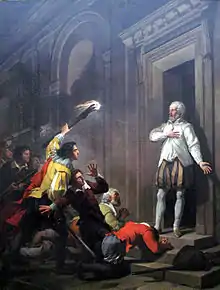
- "I am he; respect my gray hairs, young man!"[13]:42
- ("Mon Dieu, ayez pitié de mon âme; mon Dieu, ayez pitié de ce pauvre peuple.")
- — Gaspard II de Coligny, Admiral of France (24 August 1572), in response to one of his assassins asking, "Art thou Coligny?"
- "They may leave my corpse to rot where I die if they wish!"[18]
- — George Buchanan, Scottish historian and humanist scholar (28 September 1582)
- "We are as neare to Heaven by sea as by land."[59][60]
- — Humphrey Gilbert, English adventurer and explorer (9 September 1583), prior to sinking of HMS Squirrel with all hands
- "God have mercy upon me, and upon this poor nation."[13]:14
- ("Mon Dieu, ayez pitié de mon âme; mon Dieu, ayez pitié de ce pauvre peuple.")
- — William the Silent, Prince of Orange (10 July 1584), assassinated by Balthasar Gérard
- "Take it; thy need is greater than mine."[13]:122
- — Philip Sidney, English poet and soldier (17 October 1586), mortally wounded at the Battle of Zutphen, passing a cup of water to another wounded soldier
- "Let the pulse beat as it may, we know the mercy of God will never fail."[13]:22
- — Frederick II of Denmark (4 April 1588)
- "Do not announce my death."[61]
- ("나의 죽음을 알리지 마라.")
- — Yi Sun-sin, Korean naval commander (16 December 1598), telling his nephew to hide his death by gunshot from his soldiers to avoid demoralizing them during the Battle of Noryang
- "My days are passed as a shadow that returns not."[13]:168
- — Richard Hooker, English priest and theologian (3 November 1600)
17th century
- "May I not seem to have lived in vain."[13]:99[62]
- ("Ne frustra vixisse videar.")
- — Tycho Brahe, Danish astronomer (24 October 1601), to his assistant Johannes Kepler
- "All my possessions for a moment of time."[13]:16[47][63]
- — Elizabeth I, queen regnant of England (24 March 1603)
- "Ease and pleasure quake to hear of death; but my life, full of cares and miseries, desireth to be dissolved."[13]:88
- — Robert Cecil, 1st Earl of Salisbury, English statesman (24 May 1612)
- "I would say 'somewhat,' but I cannot utter it."[49]:198
- — Henry Frederick, Prince of Wales (6 November 1612), when asked if he was in pain
- "Already my foot is in the stirrup."[18]
- — Miguel de Cervantes, Spanish novelist (22 April 1616)
- "Oh would to God I had never reigned. Oh that those years in my kingdom I had lived a solitary life in the wilderness. Oh that I had lived alone with God. How much more secure should I have died. With how much more confidence should I have gone to the throne of God. What doth all my glory profit but that I have so much the more torment in my death?"[49]:195
- — Philip III of Spain (31 March 1621)
- "Villaine!"[64][note 25]
- — George Villiers, 1st Duke of Buckingham (23 August 1628); to his assassin, John Felton, after being stabbed by him
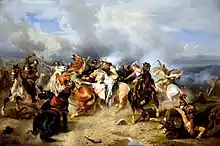
- "I am the King of Sweden, and I seal with my blood the liberty and the religion of the whole German nation."[13]:16
- — Gustavus Adolphus of Sweden (16 November 1632), killed at the Battle of Lützen (1632)
- "All right then, I'll say it. Dante makes me sick."[65][66]
- — Lope de Vega, Spanish playwright (27 August 1635)
- "I, feeble and of small virtue, have offended against Heaven; the rebels have seized my capital because my ministers deceived me. Ashamed to face my ancestors, I die. Removing my imperial cap and with my hair disheveled about my face, I leave to the rebels the dismemberment of my body. Let them not harm my people!"
- ("朕自登基十七年,虽朕薄德匪躬,上干天怒,然皆诸臣误朕,致逆贼直逼京师。朕死,无面目见祖宗于地下,自去冠冕,以发覆面。任贼分裂朕尸,勿伤百姓一人。")
- — Chongzhen Emperor, the last emperor of Ming Dynasty (24 April 1644)
- "O Lord, forgive me specially my sins of omission."[13]:168
- — James Ussher, Church of Ireland Archbishop of Armagh and Primate of All Ireland (21 March 1656)
- "I bless the Lord that he gave me counsel."[67]
- — Samuel Rutherford, Scottish pastor (29 March 1661)
- "Observe how they are swelled; time to depart."[7][15]
- — Anne of Austria, former Queen of France (20 January 1666), looking at her formerly beautiful hands
- "I shall have to ask leave to desist, when I am interrupted by so great an experiment as dying."[31][49]:195
- — William Davenant, English poet and playwright (7 April 1668), setting aside the manuscript of a new poem
- "Bad, bad! To judge by what I now endure, the hand of death grasps me sharply."[13]:95
- — Salvator Rosa, Italian artist and poet (15 March 1673), when asked how he was

- "I did not mean to be killed today."[49]:197
- ("Je ne veux point être tué aujourd'hui.")
- — Henri de La Tour d'Auvergne, Viscount of Turenne (27 July 1675), struck by a cannonball at the Battle of Salzbach
- "A great leap in the dark."[22][note 26]
- — Thomas Hobbes, English philosopher (4 December 1679)
- "I have been a most unconscionable time dying, but I beg you to excuse it."[49]:195[note 27]
- — Charles II of England (6 February 1685)
- "Take me, for I come to Thee."[68]
- — John Bunyan, English writer and preacher (31 August 1688)
18th century
- "Can this last long?"[13]:18
- — William III of England (8 March 1702), dying of pneumonia after breaking his collarbone, to his physician
- "I am about to—or I am going to—die; either expression is correct."[43][49]:198
- ("Je vais ou je vas mourir, l'un et l'autre se dit ou se disent.")
- — Dominique Bouhours, French priest and grammarian (27 May 1702)
- "Thy will be done."[13]:95
- ("Fiat voluntas tua.")
- — Jacques-Bénigne Bossuet, French bishop and theologian (12 April 1704)
- "...in perfect charity with all men and in sincere communion with the whole church of Christ, by whatever name Christ's followers call themselves."[13]:87—88
- — John Locke, English philosopher and physician (28 October 1704)[note 28]
- "Dear Bob, I have nothing to leave thee to perpetuate my memory but two helpless girls. Look upon them sometimes, and think of him who was to the last moment of his life thine, George Farquhar."[13]:79
- — George Farquhar, Irish dramatist (29 April 1707), to his friend Robert Wilks
- "Do you wish to hasten my last hour?"[49]:197[note 29]
- — Nicolas Boileau-Despréaux, French poet and critic (13 March 1711), to a playwright who asked him to read his new play
- "Not my will, but thine be done."[13]:73
- — François Fénelon, French Roman Catholic archbishop, theologian and writer (7 January 1715), quoting Jesus
- "I am leaving, but the State shall always remain."[note 30]
- ("Je m'en vais, mais l'État demeurera toujours.")
- — Louis XIV, king of France (1 September 1715)
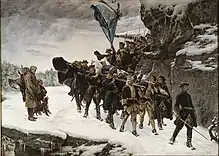
- "Don't be afraid."
- ("Var intet rädd.")
- — Charles XII of Sweden (11 December [O.S. 30 November] 1718), assuring his troops about his own safety minutes before being killed in battle
- "See in what peace a Christian can die."[15][22][7][41][note 31]
- — Joseph Addison, English writer and politician (17 June 1719), to his stepson, Edward Rich, 7th Earl of Warwick
- "I don’t know what I may seem to the world. But as to myself I seem to have been only like a boy playing on the seashore and diverting myself now and then in finding a smoother pebble or a prettier shell than the ordinary, whilst the great ocean of truth lay all undiscovered before me."[7][52]
- — Isaac Newton, English physicist (31 March [O.S. 20 March] 1727)
- "Is this dying? Is this all? Is this what I feared when I prayed against a hard death? Oh, I can bear this! I can bear this!"[69]
- — Cotton Mather, New England Puritan minister and author (13 February 1728)
- "One hundred and forty-four."[52][70]
- — Thomas Fantet de Lagny, French mathematician (11 April 1734), responding to the question “What is the square of 12?” on his deathbed
- "No, not quite naked. I shall have my uniform on."[63]
- — Frederick William I of Prussia, King in Prussia and Elector of Brandenburg (31 May 1740), in response to priest or family members quoting Job 1:21
- "Oh Lord! Forgive the errata!"[49]:198[71]
- — Andrew Bradford, American newspaper printer and publisher (24 November 1742)
- "I have something to say to you, sir... 'Tis gone."[13]:76
- — Richard Savage, English poet (1 August 1743), unable to remember what he wanted to say to his keeper at Bristol Newgate Prison. The keeper found Savage dead the next morning.
- "I am dying, sir, of one hundred good symptoms."[18][note 32]
- — Alexander Pope, English poet (30 May 1744)
- "Waiting God's leave to die."[13]:92
- — Isaac Watts, English Christian minister, hymn writer and theologian (25 November 1748)
- "Don't cry for me, for I go where music is born."[72]
- — Johann Sebastian Bach, German composer (28 July 1750)
- "I do not suffer, my friends; I only feel a certain difficulty of living."[13]:71
- — Bernard Le Bovier de Fontenelle, French author (9 January 1757), dying at the age of 99
- "Let all brave Prussians follow me!"[73][74]
- — Kurt Christoph Graf von Schwerin, Prussian Generalfeldmarschall (6 May 1757), just before being fatally struck by enemy fire at the Battle of Prague (1757)
- "Go, one of you, to Colonel Burton; tell him to march Webb's regiment down to Charles River, to cut off their retreat from the bridge. Now, God be praised, I will die in peace!"[75][note 33]
- — James Wolfe, British Army general (13 September 1759), mortally wounded at the Battle of the Plains of Abraham, on learning that the French forces were fleeing
- "So much the better; I shall not live to see the surrender of Quebec."[13]:116
- — Louis-Joseph de Montcalm, French general (14 September 1759), on being told the wound he had received at the Battle of the Plains of Abraham was mortal
- "It has all been most interesting."[69][76]
- — Mary Wortley Montagu, English traveler (21 August 1762)
- "Wait a second."[54]
- — Madame de Pompadour, chief mistress of Louis XV of France (15 April 1764), applying rouge to her cheeks before her death
- "What the devil do you mean to sing to me, priest? You are out of tune."[52][72]
- — Jean-Philippe Rameau, French composer (12 September 1764), to his confessor
- "It is a great consolation to me in my last hour that I have never wilfully offended anyone, and that there is not a drop of blood on my hands."[13]:21
- — Frederick V of Denmark (14 January 1766)
- "I could wish this tragic scene were over, but I hope to go through it with becoming modesty."[49]:196
- — James Quin (21 January 1766), English actor
- "I am dying."[13]:173
- — George Whitefield, Anglican cleric and evangelist (30 September 1770), to a servant
- "Molly, I shall die."[18]
- — Thomas Gray, English poet (30 July 1771)
- "Give Dayrolles a chair."[55]
- — Philip Stanhope, 4th Earl of Chesterfield, British statesman and diplomat (24 March 1773), asking a servant to seat his godson, Solomon Dayrolles
- "No, it is not."[13]:70
- — Oliver Goldsmith, Anglo-Irish novelist, playwright and poet (4 April 1774), in response to his physician asking if his mind was at ease
- "I am very ill. Send for Zimmermann. In fact, I think I'll die today."[31]
- — Ludwig Christoph Heinrich Hölty, German poet (1 September 1776)
- "My friend, the artery ceases to beat."[40][note 34]
- — Albrecht von Haller, Swiss anatomist and physiologist (12 December 1777), to his friend Dr. Rosselet
- "Bring me a chair; carry me forward; and there the surgeon will dress my wound."[13]:61
- — Nicholas Biddle, Continental Navy captain (7 March 1778), wounded in battle between USS Randolph and HMS Yarmouth. While the surgeon was treating Biddle, the Randolph exploded, killing all but four crewmembers.
- "Now is not the time for making new enemies."[77][note 35]
- — Voltaire, French writer (30 May 1778), when asked by a priest to renounce Satan before his death
.jpg.webp)
- "Take me to the boats."[22]
- — James Cook, British explorer and Royal Navy captain (14 February 1779), after being mortally wounded by a native Hawaiian
- "I thank you, sir, for your generous sympathy, but I die the death I always prayed for, the death of a soldier fighting for the rights of man."[79][80]
- — Baron Johann de Kalb, officer in the American War of Independence (16 August 1780), speaking to a British officer after being mortally wounded and captured at the Battle of Camden
- "No, but comfortable enough to die."[69][note 36]
- — Maria Theresa, Archduchess of Austria and Queen of Hungary and Croatia (29 November 1780), when her son said, "Your Majesty cannot be comfortable like that"
- "I die."[47][63]
- — Leonhard Euler, Swiss mathematician and scientist (18 September 1783)
- "The first step towards philosophy is incredulity."[13]:93
- — Denis Diderot, French philosopher (31 July 1784)
- "God bless you, my dear."[13]:79[18]
- — Samuel Johnson, English writer (13 December 1784), to Miss Morris, a young woman
- "I am tired of ruling over slaves."[24][49]:195
- ("Ich bin es müde, über Sklaven zu herrschen.")
- — Frederick the Great, king of Prussia (17 August 1786)
- "We are all going to Heaven, and van Dyke is of the company."[22]
- — Thomas Gainsborough, English painter (2 August 1788)
- "Waiting, are they? Waiting, are they? Well, God damn 'em, let 'em wait!"[7][22][41]
- — Ethan Allen, American patriot and militia general (12 February 1789), on being told the angels were waiting for him
- "Give me no monument, but lay me quietly in the earth; place a sun-dial over my grave, and let me be forgotten."[13]:137
- — John Howard, English philanthropist and prison reformer (20 January 1790), dying of typhus contracted on a prison visit in Kherson
- "Let my epitaph be, 'Here lies Joseph, who was unsuccessful in all his undertakings.'"[49]:197
- — Joseph II, Holy Roman Emperor (20 February 1790)
- "A dying man can do nothing easy."[22][47][7][65][52][81]
- — Benjamin Franklin, American statesman and scientist (17 April 1790), complaining about difficulty to assume a more comfortable position on his deathbed
- "I believe we shall adjourn this meeting to another place."[65]
- — Adam Smith, Scottish economist (17 July 1790)
- "Let me die to the sound of delicious music."[13]:36
- — Honoré Gabriel Riqueti, comte de Mirabeau (2 April 1791)
- "The taste of death is upon my lips... I feel something, that is not of this earth."[72][82][note 37]
- — Wolfgang Amadeus Mozart, Austrian composer (5 December 1791)
- "I have been fortunate in long good health and constant success, and I ought not to complain. I know that all things on earth must have an end, and now I am come to mine."[13]:94
- — Joshua Reynolds, English painter (23 February 1792)
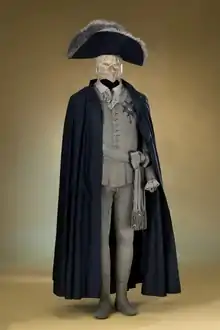
- "I feel sleepy, a short time of rest would do me good."
- ("Jag känner mig sömnig, ett kort ögonblicks vila skulle göra mig gott.")
- — Gustav III, king of Sweden (29 March 1792), in a hospital bed after being shot at a masquerade two weeks earlier
- "They shall be soon guillotined."[13]:42
- — Jean-Paul Marat (13 July 1793), prior to his murder by Charlotte Corday
- "His praise, ye winds, that from four quarters blow, / Blow soft or loud; and wave your tops, ye pines, / With every plant, in sign of worship, wave."[13]:93
- — Richard Burke Jr., English barrister and Member of Parliament (2 August 1794), quoting the Morning Hymn from Paradise Lost to his father, Edmund Burke; he then died in his father's arms
- "Don't let the awkward squad fire over me."[18][22][note 38]
- — Robert Burns, Scottish poet (21 July 1796)
- "Water."
- — Catherine the Great, empress of Russia (17 November [O.S. 6 November] 1796)
- "God bless you."[13]:47
- — Edmund Burke, Irish statesman and philosopher (9 July 1797)
- "I have lived as a philosopher. I die as a Christian."[22][55]
- — Giacomo Casanova, Italian adventurer and author (4 June 1798)
- "I die hard, but I am not afraid to go...[13]:53[81] I am just going. Have me decently buried, and do not let my body be put into the vault in less than two days after I am dead. Do you understand me? 'Tis well."[13]:53
- — George Washington, president of the United States (14 December 1799)
19th century
- "Only a soldier's blanket! Make haste and return it to him at once."[7]
- — Ralph Abercromby, Scottish soldier and politician (28 March 1801). Wounded at the Battle of Alexandria, he asked what had been placed under his head and was told it was "Only a soldier's blanket."[note 39]
- "Let me die in the old uniform in which I fought my battles for freedom. May God forgive me for putting on any other."[7]
- — Benedict Arnold, American military officer and traitor (14 June 1801), referring to his Continental Army uniform
- "Stop. Go out of the room. I am about to die."[49]:197
- — George Fordyce, Scottish physician (25 May 1802), to his daughter, who had been reading to him
- "Clasp my hand, my dear friend, I die!"[7][15]
- ("Stringetemi la mano, mi cara, mi sento morire.")
- — Vittorio Alfieri, Italian dramatist and poet (8 October 1803), to Princess Louise of Stolberg-Gedern
- "That is right; I have now done."[13]:94
- — Joseph Priestley, English chemist, natural philosopher and theologian (6 February 1804), while dictating revisions to his works
- "I have not yet lost my feeling for humanity."[13]:95
- — Immanuel Kant, German philosopher (12 February 1804), thanking his physicians and attendants
- "Remember, my Eliza, you are a Christian."[81][note 40]
- — Alexander Hamilton, American statesman (12 July 1804), addressing his wife after being mortally shot by his rival Aaron Burr in a duel
- "Many things are growing clearer and clearer to me."[13]:80
- — Friedrich Schiller, German writer, philosopher and physician (9 May 1805)
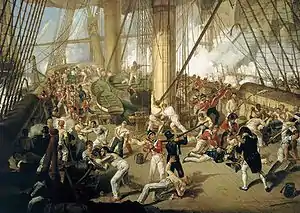
- "Thank God, I have done my duty."[13]:59[54][note 41]
- — Horatio Nelson, 1st Viscount Nelson, Royal Navy admiral (21 October 1805), mortally wounded at the Battle of Trafalgar
- "I think I could eat one of Bellamy's veal pies."[54][83][note 42]
- — William Pitt the Younger, Prime Minister of the United Kingdom (23 January 1806)
- "I'll be shot if I don't believe I'm dying."[15]
- — Edward Thurlow, 1st Baron Thurlow, British lawyer and politician (12 September 1806)
- "I die happy."[63]
- — Charles James Fox, British statesman (13 September 1806)
- "I am all yours."[84][85]
- ("Je suis toute à vous.")
- — Adrienne de La Fayette (24 December 1807), French marchioness who married Marquis de Lafayette
- "I have peace of mind. It may arise from stupidity, but I think it is founded on a belief of the Gospel. My hope is in the mercy of God[7][15] through Jesus Christ."[7]
- — Fisher Ames, member of the U.S. House of Representatives (4 July 1808)
- "Children be comforted, I am well."[7][72]
- — Joseph Haydn, Austrian composer (31 May 1809), reassuring his servants when cannon shot fell near his house during French bombardment of Vienna
- "Taking a leap into the dark. O mystery!"[13]:92
- — Thomas Paine, English-born American political activist and theorist, philosopher and revolutionary (8 June 1809)
- "I am not coward, but I am so strong. It is hard to die."[69]
- — Meriwether Lewis, American explorer (11 October 1809), apparent suicide/possible murder
- "I am dead."[13]:77
- ("Je suis mort.")
- — Antoine François, comte de Fourcroy, French chemist (16 December 1809)
- "It grows dark, boys, you may go."[7][15][86][note 43]
- — Alexander Adam, Scottish teacher (18 December 1809), imagining himself still at work
- "I am a queen, but I have not the power to move my arms."[47]
- — Louise of Mecklenburg-Strelitz, Queen of Prussia (19 July 1810)
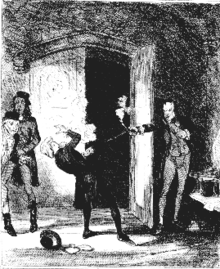
- "Oh!"[22][note 44]
- — Spencer Perceval, Prime Minister of the United Kingdom (11 May 1812), mortally wounded by gunshot
- "Don't give up the ship. Fight her till she sinks."[87][note 45]
- — James Lawrence, United States naval officer (4 June 1813), mortally wounded by British fire. His words became a popular naval battle cry.
- "Now let her sing and clash, / That glowing sparks may flash! / Morn wakes in nuptial pride. / Hurrah, thou iron bride! / Hurrah!"
- ("Nun lasst das Liebchen singen, / Dass helle Funken springen! / Der Hochzeitsmorgen graut. / Hurra, du Eisenbraut! / Hurra!")
- — Theodor Körner, German poet and soldier (26 August 1813); final lines of the "Schwertlied", written two hours before his death in battle[13]:71
- "Now I am satisfied; I die contented."[13]:62
- — William Ward Burrows II, United States naval officer (5 September 1813), mortally wounded while commanding USS Enterprise in the capture of HMS Boxer
- "I shall not in fact see the new year which I have just commemorated."[49]:198
- — Johann Georg Jacobi, German poet (4 January 1814), referring to a poem for New Year's Day that he had completed on New Year's Eve; he in fact lived 5 more days
- "Leave it alone; I need no medicine; I feel that I am well."[13]:88
- — Johann Gottlieb Fichte, German philosopher (29 January 1814), to an attendant who brought him medicine
- "L'Isle d'Elbe—Napoleon—"[13]:14
- — Empress Joséphine, former wife of Napoleon (29 May 1814), looking at a picture of her former husband, who was exiled to the island of Elba at the time
- "I am absolutely undone."[18]
- — Richard Brinsley Sheridan, Irish satirist, playwright and poet (7 July 1816), dying in poverty
- "I want nothing but death."[7][65]
- — Jane Austen, English novelist (18 July 1817), being asked by her sister Cassandra if she wanted something
- "That is surprising, since I have been practicing all night."[89]
- — John Philpot Curran, Irish orator, politician and wit (14 October 1817), when his doctor said he was coughing "with more difficulty"
- "An end of Poland."[13]:44
- — Tadeusz Kościuszko, Polish-Lithuanian military engineer, statesman, and military leader (15 October 1817)
- "Nostitz, you have learned many a thing from me. Now you are to learn how peacefully a man can die."[43]
- — Gebhard Leberecht von Blücher, Prussian field marshal (12 September 1819), to his aide-de-camp, August Ludwig von Nostitz
- "I am mortally wounded … I think."[63]
- — Stephen Decatur, United States naval officer (22 March 1820), mortally wounded in duel with James Barron
- "I can feel the daisies growing over me."[13]:73
- — John Keats, English poet (23 February 1821)
- "France, the army, the head of the army, Joséphine."[28]
- ("France, armée, tête d'armée, Joséphine.")
- — Napoleon, emperor of France (5 May 1821)
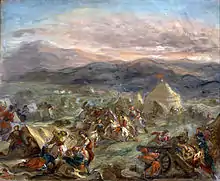
- "To die for liberty is a pleasure and not a pain."[13]:46
- — Markos Botsaris, Greek general, hero of the Greek War of Independence (21 August 1823), killed in action in attack on Karpenisi
- "Let not my body be sent to England. Here let my bones molder. Lay me in the first corner without pomp or nonsense."[90][note 46]
- — Lord Byron, English poet (19 April 1824), to his physician, Dr. Julius Michael Millingen
- "Is it the Fourth?"[13]:54[91]
- — Thomas Jefferson, president of the United States (4 July 1826), correctly remembering the national day of his country
- "Thomas Jefferson survives."[13]:54[92][93][94][note 47]
- — John Adams, president of the United States (4 July 1826), unaware that Jefferson had died earlier that same day
- "What we know is little; what we are ignorant of is immense."[13]:99
- ("Ce que nous connaisons est peu de chose; ce que nous ignorons est immense.")
- — Pierre-Simon Laplace, French scholar and polymath (5 March 1827)
- "Pity, pity - too late!"[43][72][95][note 48]
- — Ludwig van Beethoven, German composer (26 March 1827), being informed that his publisher had gifted him 12 bottles of wine
- "Here, here is my end."[72][note 49]
- — Franz Schubert, Austrian composer (19 November 1828)
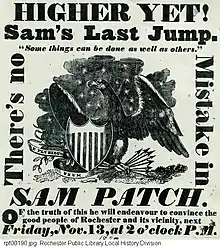
- "Napoleon was a great man and a great general. He conquered armies and he conquered nations. But he couldn't jump the Genesee Falls. Wellington was a great man and a great soldier. He conquered armies and he conquered Napoleon, but he couldn't jump the Genesee Falls. That was left for me to do, and I can do it and will!"[96]
- — Sam Patch, American daredevil (13 November 1829), prior to fatal leap from Genesee Falls
- "Quick, quick! some vinegar! I am fainting."[13]:101
- — Joseph Fourier, French mathematician and physicist (16 May 1830), calling to his physician, who had stepped out of the room
- "Fuck, a bullet wound!"[97]
- ("¡Carajo, un balazo!")
- — Antonio José de Sucre, Venezuelan independence leader and President of Peru and Bolivia (4 June 1830), after being shot while riding in the jungle of Colombia. He was said to be an educated gentleman who had never cursed until that day.
- "O God! I am dying." (To his physician) "This is death."[13]:23
- — George IV, King of the United Kingdom of Great Britain and Ireland (26 June 1830)
- "Well, I've had a happy life."[22][65]
- — William Hazlitt, English essayist and critic (18 September 1830)
- "How do I get out of this labyrinth!"[98]
- — Simón Bolívar, Venezuelan military and political leader (17 December 1830)
- "I regret that I should leave this world without again beholding him."[94][76]
- — James Monroe, president of the United States (4 July 1831), referring to his close friend James Madison
- "Only one man ever understood me.[40] And he really didn't understand me."[22][40][note 50]
- — Georg Wilhelm Friedrich Hegel, German philosopher (14 November 1831)
- "Please open the second window of the bedroom so that more light can enter."[24][note 51]
- — Johann Wolfgang von Goethe, German statesman and writer (22 March 1832)
- "Nurse, it was I who discovered leeches have red blood."[55][note 52]
- — Georges Cuvier, French naturalist and zoologist (13 May 1832), to a nurse who was bleeding him
- "I have written nothing which on my deathbed I should wish blotted."[18][note 53]
- — Walter Scott, Scottish novelist and poet (21 September 1832)
- "Thank God that I have lived to see the day when England is willing to give twenty millions for the abolition of slavery."[13]:35
- — William Wilberforce, British politician (29 July 1833)
- "My mind is quite unclouded. I could even be witty."[22]
- — Samuel Taylor Coleridge, English poet and literary critic (25 July 1834)
- "My bedfellows are cramp and cough – we three all in one bed!"[18]
- — Charles Lamb, English essayist and poet (27 December 1834)
- "Nothing more than a change of mind, my dear."[94][99]
- — James Madison, president of the United States (28 June 1836), to his niece, who had asked him what was the matter
- "Thank you—but don't kiss me; it is the sweat of death. I am dying, and it's for the best."[100]
- — John Field, Irish pianist and composer (23 January 1837), to his friend Gebhard
.jpg.webp)
- "Try to be forgotten. Go live in the country. Stay in mourning for two years, then remarry, but choose somebody decent."[101]
- — Alexander Pushkin, Russian poet (10 February [O.S. 29 January] 1837), to his wife, Natalia Pushkina, after being mortally wounded in a duel with Georges-Charles de Heeckeren d'Anthès, who was rumored to be having an affair with Natalia
- "Sir, I wish you to understand the true principles of the government. I wish them carried out. I ask nothing more."[13]:56[94][102]
- — William Henry Harrison, president of the United States (4 April 1841), to his doctor but possibly intended for John Tyler, his vice-president and successor
- "Ah! very well."[15]
- — Thomas Arnold, English educator and historian (12 June 1842), to his physician, who had described his serious prognosis and treatment
- "Magellan, Magellan!"[103]
- ("¡Magallanes, Magallanes!")
- — Bernardo O'Higgins, Chilean independence leader and statesman (24 October 1842)
- "It is an inexpressible comfort at my time of life to be able to look back and feel that I have not written one line against Religion or Virtue."[13]:70[note 54]
- — Thomas Campbell, Scottish poet (15 June 1844)
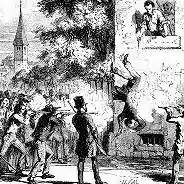
- "Oh Lord My God..."[104]
- — Joseph Smith, founder of Mormonism (27 June 1844), before falling from a window during his murder. Smith's last words may have been an attempt to use a Masonic distress signal.
- "What is the matter with my dear children? Have I alarmed you? Oh, do not cry. Be good children and we will all meet in Heaven."[13]:56[105][note 55]
- — Andrew Jackson, president of the United States (8 June 1845)
- "Happy, happy."[13]:92
- — Andrew Combe, Scottish physician and phrenologist (9 August 1847)
- "Weary, very weary."[7][72]
- — Felix Mendelssohn, German composer (4 November 1847), in response to being asked how he felt
- "Peace! Joy!"[106]
- — Henry Francis Lyte, Anglican poet (20 November 1847)
- "This is the last of Earth. I am content."[7][13]:55[15][41][47][94][107]
- — John Quincy Adams, president of the United States (23 February 1848), after collapsing in the United States Capitol
- "If you will send for a doctor I will see him now."[108]
- — Emily Brontë, English novelist (19 December 1848), to her sister Charlotte
- "Take courage, Charlotte; take courage."[22][109]
- — Anne Brontë, English novelist (28 May 1849), to her sister Charlotte
- "I love you, Sarah. For all eternity, I love you."[94]
- — James K. Polk, president of the United States (15 June 1849), to his wife, Sarah Childress Polk
- "Lord, help my poor soul."[47][54][110][42][note 56]
- — Edgar Allan Poe, American writer (7 October 1849), quoting one of his poems
- "Not yet."[22][note 57]
- ("Pas encore.")
- — Frédéric Chopin, Polish composer and pianist (17 October 1849), asked by his physician if he was suffering
- "The South! The poor South![111] God knows what will become of her."[47][55][note 58]
- — John C. Calhoun, vice president of the United States (31 March 1850)
- "Is that you, Dora?"[18][note 59]
- — William Wordsworth, English poet (23 April 1850)
- "I regret nothing, but I am sorry to leave my friends."[94][note 60]
- — Zachary Taylor, president of the United States (9 July 1850)
- "'I still live."[22][47][48][note 61]
- — Daniel Webster, American statesman (24 October 1852)
- "Teixeira? If I am in danger, tell me; do not deceive me."[112][note 62]
- ("Ó Teixeira? Se tenho perigo, diga-mo; não me engane.")
- — Maria II, queen regnant of Portugal (15 November 1853), addressing her surgeon during her eleventh childbirth
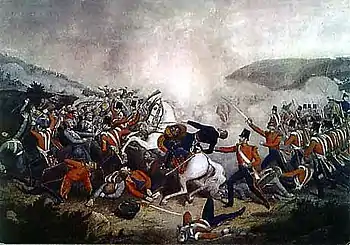
- "I fear we are in a mess."[55]
- — George Cathcart, British general and diplomat (5 November 1854), prior to his death at the Battle of Inkerman
- "I no longer see you."[113]
- ("Eu já o não vejo.")
- — Almeida Garrett, Portuguese author (9 December 1854), addressing his friend Francisco
- "If you wish for another cheerful evening with your old friend, there is no time to be lost."[18]
- — Mary Russell Mitford, English author and dramatist (10 January 1855)
- "I feel that I must come like the poor publican, like the thief on the cross, and like Mary Magdalene. I must come to the foot of the cross and be saved just in the same manner as they."[13]:174
- — Benjamin Parsons, English congregational minister (10 January 1855)
- "Oh, I am not going to die, am I? He will not separate us. We have been so happy."[22]
- — Charlotte Brontë, English author (31 March 1855), addressing her husband Arthur
- "Do not kill me! I did not come to fight you!"[114]
- — Andrew Bolon, American Bureau of Indian Affairs agent (25 September 1855), prior to his throat being cut by a member of the Yakama
- "God will pardon me. That's his line of work."[22][47]
- ("Gott wird mir vergeben. Das ist seine Arbeit.")
- — Heinrich Heine, German writer and literary critic (17 February 1856)
- "This oppression is altogether physical: God is not the less with me. I am waiting for Him in the faith of Jesus Christ and of the Holy Spirit."[76]
- — Adolphe Monod, French Protestant churchman (6 April 1856)
- "Let there be no fuss about me; let me be buried with the men."[13]:119
- — Henry Montgomery Lawrence, British military officer and statesman (4 July 1857), mortally wounded at Siege of Lucknow
- "What an irreparable loss!"[55][49]:196
- — Auguste Comte, French philosopher (5 September 1857)
- "I am looking to the Savior. My only hope is in Jesus."[13]:77
- — James Maitland Hog, Scottish advocate and landowner (1 August 1858), spelling out his final words on a printed alphabet with a reed in his mouth
- "I lost."[13]:77
- ("J 'ai perdu.")
- — Karl August Varnhagen von Ense, German biographer, diplomat and soldier (10 October 1858), playing chess with his young niece
- "How grand those rays! they seem to beckon earth to heaven."[13]:94
- — Alexander von Humboldt, German polymath (6 May 1859)
- "Comfort my Peter."[115]
- ("Consolem o meu Pedro.")
- — Stephanie of Hohenzollern-Sigmaringen, queen consort of Portugal (17 July 1859)
- "Well, I must arrange my pillows for another night – when will this end!"[18]
- — Washington Irving, American writer and diplomat (28 November 1859)
- "No noise, no music, no bohemia!"[116]
- — Henri Murger, French author of Scenes of Bohemian Life (28 January 1861)
- "It is beautiful."[65][117]
- — Elizabeth Barrett Browning, English poet (29 June 1861)
- "Boys, they've killed me, but never give it up!"[7][note 63]
- — Francis S. Bartow, American and Confederate politician and brigade commander of the American Civil War (21 July 1861), mortally wounded at the First Battle of Bull Run
- "There is Jackson standing like a stone wall! Rally behind the Virginians. Let us determine to die here and we will conquer. Follow me."[7]
- — Barnard Elliott Bee Jr., Confederate general of the American Civil War (22 July 1861), before being mortally wounded at the First Battle of Bull Run. His last words gave rise to the nickname of Thomas J. "Stonewall" Jackson.
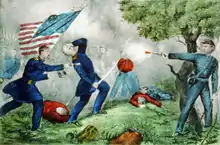
- "See, he falls."[7]
- — Edward Dickinson Baker, United States Senator and Union colonel of the American Civil War (21 October 1861), pointing to a Confederate horseman who had been struck by gunfire at the Battle of Ball's Bluff. Baker was then himself shot four times. He was the only sitting United States Senator ever killed in a military engagement.
- "Good little wife."[7][note 64]
- ("Gutes Weibchen" or "Gutes Frauchen.")
- — Albert, Prince Consort (14 December 1861), to his wife, Queen Victoria
- "Doctor, I am going.[13]:54 Perhaps it is best."[13]:54[94]
- — John Tyler, president of the United States (18 January 1862)
- "I remember that little fellow who said, 'I love God!' Nothing that loves him shall perish. No, they shall not die. I shall meet them soon in heaven. Amen."[13]:136
- — Andrew Reed, English Congregational minister and hymnwriter (25 February 1862), pondering the fate of the souls of intellectually disabled persons
- "Now comes good sailing. Moose...Indian."[65][118][119][note 65]
- — Henry David Thoreau, American writer (6 May 1862)
- "Charge Men! For God's sake charge!"[7][note 66]
- — Turner Ashby, Confederate cavalry commander of the American Civil War (6 June 1862), before being killed at Harrisonburg, Virginia
- "There is but one reliance."[94]
- — Martin Van Buren, president of the United States (24 July 1862)
- "Tell McClellan that my last regret as a military man is that I did not die serving under him."[7]
- — George Dashiell Bayard, Union general of the American Civil War (14 December 1862), mortally wounded at the Battle of Fredericksburg
- "I am dying, carry me to the rear."[7]
- — Hiram Gregory Berry, American politician and Union general of the American Civil War (3 May 1863), mortally wounded at the Battle of Chancellorsville
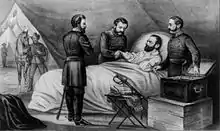
- "Order A.P. Hill to prepare for action! Pass the infantry to the front rapidly! Tell Major Hawks....[69][120] Let us cross over the river and rest under the shade of the trees."[22][69][120][121]
- — Stonewall Jackson, American and Confederate soldier and general of the American Civil War (10 May 1863), dying of pneumonia after being wounded by friendly fire
- "Forward men forward for God's sake and drive those fellows out of those woods."[122]
- — John F. Reynolds, Union general of the American Civil War (1 July 1863), prior to being fatally shot at the Battle of Gettysburg
- "Tell father that I died with my face to the enemy."[7]
- — Isaac E. Avery, Confederate officer of the American Civil War (3 July 1863), written on scrap of paper after being mortally wounded at the Battle of Gettysburg
- "Tell my wife I am shot, but we fought like hell."[7]
- — William Barksdale, Confederate general of the American Civil War (3 July 1863), to a Union surgeon after being mortally wounded at the Battle of Gettysburg
- "Give them the cold steel, boys."[7][15][note 67]
- — Lewis Armistead, Confederate brigadier general of the American Civil War (5 July 1863), prior to being mortally wounded at the Battle of Gettysburg
- "Congestion.[40] Stopped."[40][52]
- — Joseph Henry Green, English surgeon (13 December 1863), breathing with difficulty on his deathbed and then taking his own pulse
- "Good night."[13]:80[note 68]
- — William Makepeace Thackeray, English novelist (24 December 1863), to his valet
- "Colonel, rally your men and advance as soon as possible."[7]
- — Lewis Benedict, American politician and Union colonel of the American Civil War (9 April 1864), before being killed at the Battle of Pleasant Hill
- "Why are you dodging like this? They couldn't hit an elephant at this distance!"[123][49]:197[note 69]
- — John Sedgwick, Union general of the American Civil War (9 May 1864), shortly before being shot in the head by a Confederate sharpshooter
- "Lay me down, and save the flag!"[69]
- — James A. Mulligan, Union Army colonel (26 July 1864), mortally wounded at the Second Battle of Kernstown
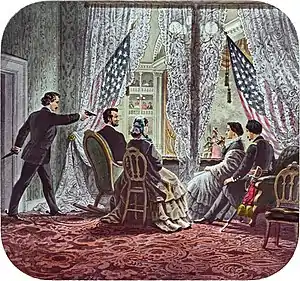
- "She won't think anything about it."[94][124][note 70]
- — Abraham Lincoln, president of the United States (15 April 1865), assuring his wife Mary that their friend Clara would not mind them holding hands, shortly before he was fatally shot from behind
- "Tell mother, tell mother, I died for my country...useless...useless..."[43][47]
- — John Wilkes Booth, American actor and assassin of Abraham Lincoln (26 April 1865), after being fatally shot by Boston Corbett
- "That's Article 98; now go on to the next."[22]
- — Henry John Temple, 3rd Viscount Palmerston, Prime Minister of the United Kingdom (18 October 1865), pondering diplomatic treaties
- "Ah, Luisa, you always arrive just as I'm leaving."[7][41]
- — Massimo d'Azeglio, Italian statesman, novelist and painter (15 January 1866), seeing his estranged wife arrive at his bedside as he died
- "James, take good care of the horses."[13]:121
- — Winfield Scott, United States Army general (29 May 1866)
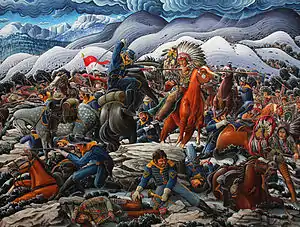
- "Give me 80 men and I'll ride through the whole Sioux nation."[63]
- — William J. Fetterman, United States Army officer (21 December 1866), prior to death in Fetterman Fight
- "Never mind, I shall soon drink of the river of eternal Life."[15]
- — Henry Timrod, American and Confederate poet (7 October 1867), unable to swallow a spoonful of water
- "I do not have to forgive my enemies. I have had them all shot."[54]
- — Ramón María Narváez, 1st Duke of Valencia, Spanish general and Prime Minister of Spain (23 April 1868)
- "Oh, Lord God Almighty, as thou wilt!"[94][note 71]
- — James Buchanan, president of the United States (1 June 1868)
- "One thousand greetings to Balakirev."[72]
- — Hector Berlioz, French composer (8 March 1869)
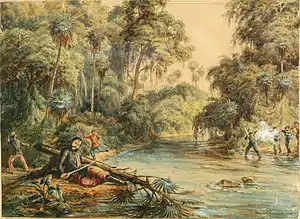
- "I die for my homeland."[128]
- ("Muero por mi patria.")
- — Francisco Solano López, 2nd president of Paraguay (1 March 1870), after his last stand in the Battle of Cerro Corá
- "Yes. On the ground."[22][65]
- — Charles Dickens, English novelist (9 June 1870), to his sister-in-law Georgina Hogarth, who had suggested he lie down after he suffered a stroke
- "Tell Hill he must come up![13]:120[129][130] Strike the tent!"[13]:120[69][129][130][note 72]
- — Robert E. Lee, American and Confederate soldier and general (12 October 1870)
- "Will you tell the Archdeacon?[15]–will you move a vote of thanks for his kindness in performing the ceremony?"[7][15]
- — Henry Alford, English churchman (12 January 1871), requesting that the Archdeacon participate in his funeral
- "I want to go away."[18]
- — Alice Cary, American poet (12 February 1871)
- "Nothing, only 'love one another'."[52]
- — William H. Seward, United States Secretary of State (10 October 1872), when asked if he had any final words
- "I live."[132]
- ("Minä elän")
- — Aleksis Kivi, Finnish author and poet (31 December 1872)
- "Stand up for Jesus in all circumstances."[13]:135
- — Thomas Guthrie, Scottish divine and philanthropist (24 February 1873)
- "Do you know what linen is? Linen is a great thing – I want to make a book of it!"[18]
- — Jules Michelet, French historian (9 February 1874)
- "The nourishment is palatable."[47][94]
- — Millard Fillmore, president of the United States (8 March 1874), referring to soup he had eaten
- "Thou knowest, O Lord, the secrets of the hearts; shut not Thy merciful ear to our prayers, but spare us, O Lord most holy; O God most mighty, O holy and merciful Savior, Thou most worthy Judge Eternal, suffer us not, at our last hour, from any pains of death, to fall from Thee."[13]:169—170
- — Charles Kingsley, English priest, university professor and author (23 January 1875)
- "This is the happiest day I have ever experienced on earth. I shall soon be where the wicked cease from troubling and the weary are at rest."[13]:87
- — Edward Sugden, 1st Baron St Leonards, British lawyer, judge and politician (29 January 1875)
- "I am in a cold sweat. Is it the sweat of death? How are you going to tell my father?"[72]
- — Georges Bizet, French composer (3 June 1875)
- "Oh, do not cry. Be good children, and we shall meet in heaven."[94][note 73]
- — Andrew Johnson, president of the United States (31 July 1875)
- "Farewell, I am going to die. Goodbye Lina, goodbye Maurice, goodbye Lolo, good ..."[18]
- — George Sand, French novelist (8 June 1876)
- "Farewell, the martyrdom is no more!"[113]
- ("Adeus, acabou o martírio!")
- — Inocêncio Francisco da Silva, Portuguese bibliographer (27 June 1876)
- "Joseph! Joseph! Joseph!"[133]
- — Brigham Young, American religious leader and politician (29 August 1877), referring to Joseph Smith
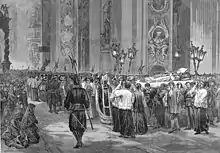
- "Guard the Church I loved so well and sacredly."[134]
- — Pope Pius IX (7 February 1878)
- "Surrender? Your grandmother should surrender, you bastard!"[7]
- ("¿Rendirme? ¡Que se rinda su abuela, carajo!")
- — Eduardo Abaroa, Bolivian hero of the War of the Pacific (23 March 1879), responding to Chilean forces asking him to surrender
- "Tell them I have a great pain in my left side."[22]
- — George Eliot, English novelist (22 December 1880)
- "So this is death … well … "[22]
- — Thomas Carlyle, Scottish philosopher and author (5 February 1881)
- "Who is it? Who is it?"[note 74][137]
- ("¿Quién es? ¿Quién es?")
- — Billy the Kid, American outlaw and gunfighter (14 July 1881), entering a dark bedroom whereupon sheriff Pat Garrett shot him after recognizing his voice
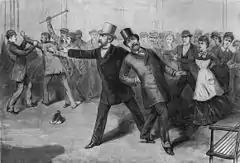
- "Oh, Swaim, this terrible pain.[140][13]:56 Press your hand on it.[13]:56 Oh, Swaim. Oh, Swaim, can't you stop this?"[13]:56[140]
- — James A. Garfield, president of the United States (19 September 1881), to General David G. Swaim
- "I can't see a damned thing."[22]
- — Morgan Earp, American lawman (18 March 1882), to his brother Wyatt; the brothers had each promised to describe to the other what he saw at the moment of death
- "Now I know I must be very ill, since you have been sent for."[49]:197
- — Henry Wadsworth Longfellow, American poet (24 March 1882), to his sister
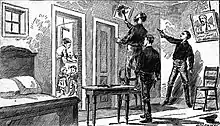
- "That picture is awful dusty."[141]
- — Jesse James, American outlaw (3 April 1882), examining a picture on his wall before being murdered by Robert Ford
- "I am not the least afraid to die."[28][47][63]
- — Charles Darwin, English naturalist and evolutionary (19 April 1882)
- "Go on, get out! Last words are for fools who haven't said enough!"[28][47][65][82][69]
- ("Hinaus! Letzte Worte sind für Narren, die noch nicht genug gesagt haben.")
- — Karl Marx, political theorist (14 March 1883), when asked by his housekeeper about his last words
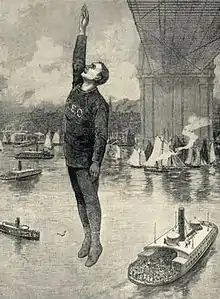
- "Am I spitting blood?"[142]
- — Robert Emmet Odlum, American swimming instructor (19 May 1885), after being fatally injured in dive off Brooklyn Bridge; a friend falsely reassured him that the fluid was only brandy
- "This is the fight of day and night. I see black light."[65][143]
- ("En moi c'est le combat du jour et de la nuit.")
- — Victor Hugo, French novelist (22 May 1885)
- "Water."[94]
- — Ulysses S. Grant, president of the United States (23 July 1885), dying of throat cancer
- "It doesn't seem to go!"[144]
- — Emil Zsigmondy, Austrian mountain climber (6 August 1885), referring to route on south face of the Meije prior to falling to his death
- "I have had no real gratification or enjoyment of any sort more than my neighbor on the next block who is worth only half a million."[66]
- — William Henry Vanderbilt, American multimillionaire (8 December 1885)
- "I must go in, for the fog is rising."[22][52][65][145]
- — Emily Dickinson, American poet (15 May 1886)
- "Water."[15]
- — Samuel J. Tilden, American politician (4 August 1886), suffering from thirst
- "Now comes the mystery."[43][47]
- — Henry Ward Beecher, American clergyman (8 March 1887)
- "Damn. This is funny."[22][40][146][147]
- — Doc Holliday, American gambler and gunfighter (8 November 1887), after a nurse refused him a whiskey
- "I did not answer the letters of my friends because I could not write, as no sooner did I take a pen in my hand than I felt as if I was dying."[18]
- — Edward Lear, English nonsense poet (29 January 1888)
- "Is it not meningitis?"[7][22][47]
- — Louisa May Alcott, American novelist (6 March 1888)
- "Pray, excuse me."[148]
- — Jefferson Davis, President of the Confederate States of America (6 December 1889)
- "A little while and I will be gone from among you. Whither I cannot tell. From nowhere we came, into nowhere we go. What is life? It is a flash of a firefly in the night. It is the breath of a buffalo in the wintertime. It is the little shadow which runs across the grass and loses itself in the sunset."[22][49]:198
- — Crowfoot, Siksika Nation chief (25 April 1890)
- "The sadness will last forever."[149]
- ("La tristesse durera toujours.")
- — Vincent van Gogh, Dutch painter (29 July 1890)
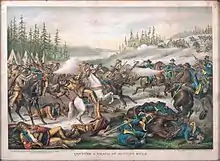
- "I am not going. Do with me what you like. I am not going. Come on! Come on! Take action! Let's go!"[58]
- — Sitting Bull, Hunkpapa Lakota leader (15 December 1890), during unsuccessful attempt by police to arrest him
- "Yes."[7][note 75]
- — P. T. Barnum, American showman (7 April 1891), when asked if he wanted a drink of water
- "God bless Captain Vere!"[65][52]
- — Herman Melville, American novelist (28 September 1891), quoting his final, unfinished novella, Billy Budd

- "May God grant me these last wishes—peace and prosperity for Brazil."[151]
- — Emperor Pedro II of Brazil (5 December 1891)
- "Warry, shift!"[65][note 76]
- — Walt Whitman, American poet (26 March 1892), to a nurse
- "I know I am going where Lucy is."[94]
- — Rutherford B. Hayes, president of the United States (17 January 1893), referring to his wife, Lucy Webb Hayes, who had died in 1889
- "What's that? Do I look strange?"[152]
- — Robert Louis Stevenson, Scottish author (3 December 1894), to his wife, Fanny Stevenson, before collapsing from a cerebral haemorrhage
- "Don't sole the dead man's shoes yet!"[18]
- — Paul Verlaine, French poet (8 January 1896), who spent much of his later life in poverty
- "I want to get mumbo-jumbo out of the world."[153]
- — William Morris, British textile designer, poet and socialist (3 October 1896), to his family doctor
- "Ah, that tastes nice. Thank you."[22][72]
- ("Ah, der schmeckt schön. Danke.")
- — Johannes Brahms, German composer (3 April 1897), after being given a glass of wine
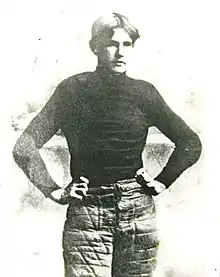
- "No, Bill, I've got too much Georgia grit for that."[154]
- — Richard Von Albade Gammon, American football fullback fatally injured in game (31 October 1897), responding to teammate who asked if he was going to give up
- "Take away these pillows, I won't need them any longer."[65]
- — Lewis Carroll, English mathematician and novelist (14 January 1898)
- "I am imploring you – burn all the indecent poems and drawings."[22]
- — Aubrey Beardsley, English illustrator and author (16 March 1898)
- "Sergeant, the Spanish bullet isn't made that will kill me."[54]
- — Buckey O'Neill, captain in Theodore Roosevelt's Rough Riders (1 July 1898), just before being shot in the mouth prior to charge up Kettle Hill
- "My God, don't shoot!"[155]
- — Soapy Smith, con artist and gangster in the American frontier (7 July 1898), after vigilante Frank H. Reid shot him
- "House."
- ("Haus.")
- — Otto von Bismarck, German statesman (30 July 1898), writing on a piece of paper with unknown meaning
- "I will, whatever happens."[72]
- — Johann Strauss II, Austrian composer (3 June 1899), in response to being asked to get some sleep
- "Keep up the fire, men."[156]
- — Emerson H. Liscum, United States Army colonel (13 July 1900), dying after being shot at the Battle of Tientsin
20th century
- "Bertie."[160]
- — Victoria, queen regnant of the United Kingdom (22 January 1901), calling to her eldest son and heir, Albert, Prince of Wales
- "Are the doctors here? Doctor, my lungs..."[94]
- — Benjamin Harrison, president of the United States (13 March 1901), dying of pneumonia
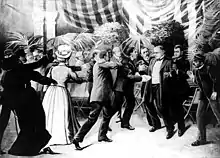
- "Goodbye, all, goodbye. It is God's way. His will be done."[94][note 78]
- — William McKinley, president of the United States (14 September 1901), dying after being shot on 6 September
- "So little done, so much to do."[58]
- — Cecil Rhodes, British businessman and politician (26 March 1902)
- "Have you brought the chequebook, Alfred?"[89]
- — Samuel Butler, English novelist (18 June 1902)
- "I feel sick. The dog is sick, too. We are both ill. It must be something we have eaten."[18]
- — Émile Zola, French novelist, playwright and journalist (29 September 1902), dying of carbon monoxide poisoning from an improperly ventilated chimney
- "It's a long time since I drank champagne."[22][55]
- ("Давно я не пил шампанского...")
- — Anton Chekhov, Russian author and playwright (15 July [O.S. 2 July] 1904), to his wife, Olga
- "On the contrary!"[65][69]
- ("Tvertimod!")
- — Henrik Ibsen, Norwegian playwright (23 May 1906), to his maid, who had said his health was improving
- "Doctor, you have science, I have faith."
- — Dmitri Mendeleev, Russian chemist (2 February [O.S. 20 January] 1907)
- "In spite of it all, I am going to sleep;[7][18][161][162] put out the lights."[7][162]
- — Thomas Bailey Aldrich, American author and editor (19 March 1907)
- "Well, if it must be so."[72]
- — Edvard Grieg, Norwegian composer and pianist (4 September 1907)
- "I perished in latitude 79° north under the hardships of the return journey over the inland ice in November. I reached this place under a waning moon, and cannot go on, because of my frozen feet and the darkness. The bodies of the others are in the middle of the fjord. Hagen died on November 15, Mylius Erichsen some ten days later.–Jørgen Brønlund."[163]
- — Jørgen Brønlund, Greenlandic polar explorer (November 1907), final diary entry
- "I have tried so hard to do right."[55][94][164]
- — Grover Cleveland, president of the United States (24 June 1908), to his wife Frances
- "I am about the extent of a tenth of a gnat's eyebrow better."[18][71]
- — Joel Chandler Harris, American author and folklorist (3 July 1908), on being asked how he felt
- "Never again allow a woman to hold the supreme power in the State... [and] be careful not to allow eunuchs to meddle in government affairs."[55]
- — Empress Dowager Cixi, de facto ruler of China (15 November 1908)
- "Cut 'er loose, Doc!"[58]
- — Frederic Remington, American artist (26 December 1909), prior to emergency appendectomy; he subsequently died of peritonitis
- "Give me my glasses."[165]
- — Mark Twain, American novelist (21 April 1910), to his daughter Clara
- "Yes, I have heard of it. I am very glad."[63]
- — Edward VII, king of the United Kingdom (6 May 1910), on being told by his son that one of his horses had won a race
- "Pull up the shades; I don't want to go home in the dark."[166][note 79]
- — O. Henry, American writer (5 June 1910), to a hospital nurse
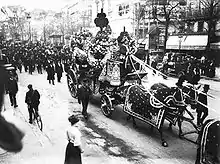
- "Higher. Always higher."[22][55]
- ("Arriba. Siempre arriba.")
- — Jorge Chávez, Peruvian aviator (27 September 1910), after being fatally injured in airplane crash
- "To die this way is stupid... And it would please so many scoundrels!… This very night, Magalhães, I could have died for the Republic!"[167]
- ("Morrer assim é estúpido… E há tanto malandro que ia ficar radiante!… Esta noite, Magalhães, podia eu morrer pela República!")
- — Miguel Bombarda, Portuguese psychiatrist (3 October 1910), after being shot by a mental patient
- "But the peasants...how do the peasants die?"[168][note 80]
- — Leo Tolstoy, Russian novelist (20 November [O.S. 7 November] 1910), to a station master in whose home he died
- "Mozart! Mozart!"[7][52][72]
- — Gustav Mahler, Austrian composer (18 May 1911)
- "Put your hands on my shoulders and don't struggle."[22][169]
- — W. S. Gilbert, English dramatist and librettist (29 May 1911), while saving 17-year-old Ruby Preece from drowning, which caused his fatal heart attack
- "Here I go."[170]
- — Cromwell Dixon, American aviator (2 October 1911), as his biplane crashed sideways
- "One last drink, please."[82]
- — Jack Daniel, American alcohol businessman (10 October 1911)
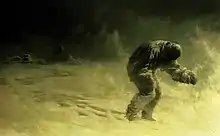
- "I am just going outside and may be some time."[54][171]
- — Lawrence Oates, British Antarctic explorer (17 March 1912), prior to walking out of tent and into blizzard on Terra Nova Expedition
- "Let me go! Let me go!"[7]
- — Clara Barton, American nurse and founder of the American Red Cross (12 April 1912)
- "The ladies have to go first.... Get into the lifeboat, to please me.... Good-bye, dearie. I'll see you later."[7][41]
- — John Jacob Astor IV, American businessman (15 April 1912), remaining aboard the RMS Titanic while his pregnant wife boarded lifeboat
- "Well boys, do your best for the women and children, and look out for yourselves."[172][note 81]
- — Edward Smith, sea captain of the RMS Titanic (15 April 1912), giving orders before walking onto the bridge and staying with the sinking ship
- "Swing low, sweet chariot."[7][52]
- — Harriet Tubman, American humanitarian and activist (10 March 1913)
- "To be a gringo in Mexico – ah, that is euthanasia!"[18]
- — Ambrose Bierce, American writer and journalist (c. 1914), written before his disappearance in Mexico
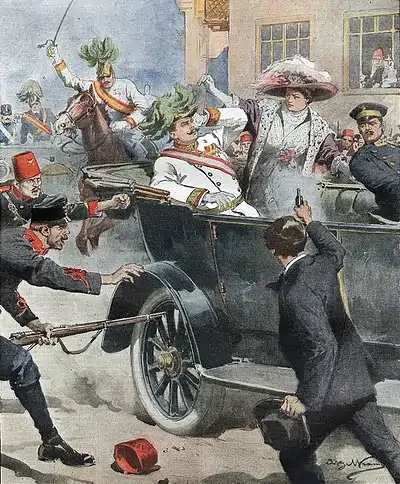
- "It is nothing... it is nothing..."[63][174][175]
- ("Es ist gar nichts... es ist gar nichts...")
- — Archduke Franz Ferdinand of Austria, heir to the throne of Austria-Hungary (28 June 1914), on his way to a hospital after being fatally shot by a Serbian nationalist
- "I know I must go, but I'm satisfied, for we beat Peggy Parratt."[176][177]
- — Harry Turner, Canton Professionals center (15 November 1914), to Canton manager Jack Cusack, after suffering fractured back and severed spinal cord while tackling the Akron Indians' Joe Collins
- "Hullo."[71]
- — Rupert Brooke, English poet (23 April 1915), to William Denis Browne, who visited him on his deathbed
- "Why fear death? Death is only a beautiful adventure."[63]
- — Charles Frohman, American theater manager and producer (7 May 1915), paraphrasing Peter Pan prior to dying in the sinking of the RMS Lusitania
- "Well, they [German Empire] have got us. They are a damn sight worse than I ever thought they were."[22][178]
- — Elbert Hubbard, American writer and publisher (7 May 1915), prior to dying with his wife in the sinking of the RMS Lusitania
- "There does not seem to be anything to do."[22][178]
- — Alice Moore Hubbard, American feminist and writer (7 May 1915), on her husband being asked "What are you going to do?" prior to the sinking of the RMS Lusitania
- "So here it is at last, the distinguished thing."[49]:195
- — Henry James, American-British author (28 February 1916)
- "Put that bloody cigarette out!"[42][179][180]
- — Saki (Hector Hugh Munro), British writer (14 November 1916), prior to being killed by a German sniper during the Battle of the Ancre
- "You know not what you do."[181]
- — Nicholas II of Russia, last Emperor of Russia (17 July 1918), quoting Jesus[182] to Yakov Yurovsky upon being informed he and his family were to be put to death.
- "Please put out that light, James."[183]
- — Theodore Roosevelt, president of the United States and Medal of Honor recipient (6 January 1919), to family servant James Amos
- "Goodbye, until Heaven!"[184]
- ("Adeus, até ao Céu!")
- — Saint Francisco Marto, Portuguese Marian mysticist (4 April 1919), to his cousin Lúcia

- "Now we can cross the Shifting Sands[7][22][82][185] together."[7]
- — L. Frank Baum, American author (5 May 1919), referring to a fictional location in his Oz books
- "Never mind, it is good to die for our country."[186]
- ("אין דבר, טוב למות בעד ארצנו")
- — Joseph Trumpeldor, Jewish Zionist activist (1 March 1920), during the battle of Tel Hai
- "I'm all right; tell Mays not to worry... ring....Katie's ring."[187][188]
- — Ray Chapman, American baseball player (17 August 1920), referring to the pitcher who had fatally beaned him and to his wedding band
- "Even if my fingernails are torn out, my nose and ears are ripped apart, and my legs and arms are crushed, this physical pain does not compare to the pain of losing my nation. My only remorse is not being able to do more than dedicating my life to my country.”[189]
- ("내 손톱이 빠져 나가고 내 귀와 코가 잘리고 내 손과 다리가 부러져도 그 고통은 이길 수 있사오나 나라를 잃어버린 그 고통만은 견딜 수가 없습니다. 나라에 바칠 목숨이 오직 하나밖에 없는 것만이 이 소녀의 유일한 슬픔입니다.")[190]
- — Ryu Gwansun, Korean independence activist (20 September 1920), final writing in prison before being tortured and beaten to death by Japanese prison officers
- "Some day, when things look real tough for Notre Dame [Notre Dame Fighting Irish football], ask the boys to go out there and win one for the Gipper."[40][note 82]
- — George Gipp, American college football player (14 December 1920), to Knute Rockne while dying of pneumonia
- "No."[43][191][192]
- (signing 'no' in sign language)
- — Alexander Graham Bell, Scottish-American inventor (2 August 1922), replying to his deaf wife Mabel's plea "Don't leave me."
- "I believe everything I have written about immortality."[18]
- — William Robertson Nicoll, Scottish minister and writer (4 May 1923)
- "I thought this was the most beautiful spot in the world, and now I know it."[69]
- — W. P. Ker, Scottish literary scholar (17 July 1923), to his hiking companions on the Pizzo Bianco before suffering a heart attack
- "That's good. Go on, read some more."[94]
- — Warren G. Harding, president of the United States (2 August 1923), to his wife, Florence Harding, who had been reading aloud a flattering Saturday Evening Post article about him
- "Good dog."[7][52]
- ("хорошая собака.")
- — Vladimir Lenin, Russian communist statesman and revolutionary (21 January 1924), to his dog who brought him a dead bird
- "When the machinery is broken... I am ready."[94]
- — Woodrow Wilson, president of the United States (3 February 1924)
- "Kill me, or else you are a murderer!"[69][193]
- — Franz Kafka, German-speaking Bohemian novelist and short-story writer (3 June 1924), asking his doctors for morphine overdose while dying of tuberculosis
- "So this is what it is like to die – it takes a long time!"[18]
- — Anatole France, French writer and journalist (12 October 1924)
- "You're too slow...too slow."[194]
- — Floyd Collins, American cave explorer (c. 13 February 1925), to rescue workers trying to free him from his entrapment in Sand Cave, Kentucky
- "I don't feel good."[43]
- — Luther Burbank, American botanist (11 April 1926)
- "I don't want the doctor's death. I want to have my own freedom."[52]
- — Rainer Maria Rilke, Bohemian-Austrian poet and novelist (29 December 1926)
- "So many people who knew the condition of Amritsar say I did right...but so many others say I did wrong. I only want to die and know from my Maker whether I did right or wrong."[195]
- — Reginald Dyer, British army officer (23 July 1927). In 1919, Dyer was responsible for the Amritsar Massacre in the British Raj, where he ordered troops of the British Indian Army to fire their rifles into a crowd of unarmed Indian civilians in Jallianwala Bagh, Amritsar, Punjab, killing at least 379 people and injuring over 1,200 other people.
- "Farewell, my friends. I go to glory!"[63][196][note 83]
- ("Adieu, mes amis. Je vais à la gloire!")
- — Isadora Duncan, American/French dancer (14 September 1927), just before dying in freak car accident
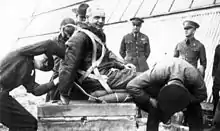
- "Sky deep blue, sun very bright, sand [buoyancy compensator] all gone."[197]
- — Hawthorne C. Gray, American aeronaut (4 November 1927), final journal entry during balloon altitude record attempt
- "I think I'll go for a drive before dinner – anyone coming?"[18]
- — Brian Oswald Donn-Byrne, Irish novelist (18 June 1928), prior to dying in auto accident
- "What is the news?"[7][161]
- — Clarence W. Barron, American newsman and de facto manager of The Wall Street Journal (2 October 1928)
- "Me mudder did it."[58]
- — Arnold Rothstein, American mobster (6 November 1928), when asked who had fatally shot him
- "The prettier. Now fight for it."[69]
- — Henry Arthur Jones, English dramatist (7 January 1929), when his nurse and his niece asked which of them he would prefer to stay with him
- "Dictionary."[52][198]
- — Joseph Wright, compiler of The English Dialect Dictionary (27 February 1930)
- "You are wonderful."[52]
- — Arthur Conan Doyle, British author, physician and spiritualist (7 July 1930), spoken to his wife in their garden; he proceeded to clutch his chest and die
- "Everything's gone wrong, my girl."[22]
- — Arnold Bennett, English writer (27 March 1931), to his mistress, Dorothy Cheston
- "The following is a report on the measurement of the velocity of light made at the Irvine Ranch, near Santa Ana, California, during the period of September 1929 to—."[52]
- — Albert A. Michelson, American physicist (9 May 1931), writing in a scientific log
- "Splendid. The finale just a little too fast."[49]:196
- — Eugène Ysaÿe (12 May 1931), Belgian violinist, composer and conductor, after his Fourth Sonata was played for him
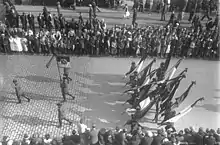
- "So long...Good-bye..."[199]
- ("Wiedersehen...Gruss...")
- — Paul Anlauf, German police captain (9 August 1931), assassinated by members of the Communist Party of Germany including Erich Mielke
- "It's very beautiful over there."[28][63]
- — Thomas Edison, American inventor (18 October 1931), speaking words of unclear meaning as he was dying
- "Goodbye, everybody!"[22][55]
- — Hart Crane, American poet (27 April 1932), prior to jumping off cruise ship
- "Curtain! Fast music! Lights! Ready for the last finale! Great! The show looks good. The show looks good."[48]
- — Florenz Ziegfeld Jr., American Broadway impresario (22 July 1932)
- "Good morning, Robert."[94]
- — Calvin Coolidge, president of the United States (5 January 1933), to a carpenter working on his house
- "Why should I talk to you? I've just been talking to your boss."[69][52]
- — Wilson Mizner, American playwright and entrepreneur (3 April 1933), to a priest at his deathbed

- "So the beginning of the eighth day has dawned. It is still cool. I have no water....I am waiting patiently. Come soon please. Fever wracked me last night. Hope you get my full log. Bill."[200]
- — Bill Lancaster, Australian aviator (20 April 1933), final note written on fuel card while dying after crash in Sahara Desert
- "I butted him."[201][202]
- — Jack Holland, American college football player and boxer (9 May 1933), while leaving ring after loss to Tony Marullo; he then collapsed from a cerebral hemorrhage
- "Last tag."[52]
- — Richard B. Mellon, American banker, industrialist and philanthropist (1 December 1933), to his brother Andrew Mellon; the two had been engaged in a playful game of tag for some seventy years
- "Follow the path for another fifty yards. I am going back to the foot of the rocks to make another climb. If I feel in good form I shall take the difficult way up; if I do not I shall take the easy one. I shall join you in an hour."[7]
- — Albert I of Belgium (17 February 1934), shortly before falling to his death while rock climbing
- "I don't want it."
- ("Je ne le veux pas.")
- — Marie Curie, Polish-French scientist (4 July 1934), upon being offered a painkilling injection
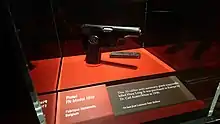
- "I wonder why he shot me."[69][note 84]
- — Huey Long, United States Senator (10 September 1935), after being fatally shot
- "Mother is the best bet."[63][note 85]
- — Dutch Schultz, American mobster (24 October 1935)
- "Give me the glasses."[204]
- ("Dá-me os óculos.")
- – Fernando Pessoa, Portuguese poet (30 November 1935), to the nurse who treated him
- "But I have so little time."[72]
- — Alban Berg, Austrian composer (24 December 1935), to his wife, who had asked him to relax
- "God damn you!"[40][205][note 86]
- — George V, king of the United Kingdom (20 January 1936), to a nurse giving him a sedative. The King was euthanized on the orders of his doctor, Bertrand Dawson, 1st Viscount Dawson of Penn.[206]
- "I think I'm going to make it."[69]
- — Richard A. Loeb, American murderer (28 January 1936), after being slashed 56 times with a razor in a prison fight
- "Indeed – very good. I shall – have to repeat – that – on the Golden Floor."[207]
- — A. E. Housman, English classical scholar and poet (30 April 1936), to his doctor, who had just told a risqué joke
- "I cannot go on."[208]
- ("Ich kann nicht mehr.")
- — Toni Kurz, German mountain climber (22 July 1936), dying on the Eiger north face
- "I can't sleep."[7][18][22][42]
- — J. M. Barrie, Scottish novelist and playwright (19 June 1937)

- "We are running on line north and south."[22][209]
- — Amelia Earhart, American aviation pioneer (c. 2 July 1937), reporting to her headquarters in her last known radio transmission shortly before her disappearance
- "I'm going, but I'm going in the name of the Lord."[52]
- — Bessie Smith, American blues singer (26 September 1937)
- "Snooks, will you please turn this way? I like to look at your face."[49]:198[52]
- — O. O. McIntyre, American newspaper columnist (14 February 1938), to his wife
- "I'm bored. I'm bored."[63]
- — Gabriele D'Annunzio, Italian author and soldier (1 March 1938)
- "Watch out, please."[63]
- — Egon Friedell, Austrian polymath (16 March 1938), before jumping out a window to avoid capture by Gestapo
- "What time is it?"[7][22]
- ("Saat kaç?")
- — Mustafa Kemal Atatürk, President of Turkey (10 November 1938)
- "You can refute Hegel, but not the Saint or the Song of Sixpence."[18]
- — W. B. Yeats, Irish poet and dramatist (28 January 1939)
- "I was going too fast for the conditions - it was entirely my own fault - I am sorry."[210]
- — Richard Seaman, British racing driver (25 June 1939), on his deathbed after being fatally burned in racing crash[note 87]
- "Never felt better."[63]
- — Douglas Fairbanks, American actor and filmmaker (12 December 1939)
- "I feel this time they have succeeded. I do not want them to undress me. I want you to undress me."[66][note 88]
- — Leon Trotsky, Soviet revolutionary (21 August 1940), to his wife, Natalia Sedova, while being prepared for surgery after being mortally wounded by assassin Ramón Mercader
- "Hershey bars will be good enough – they'll be fine."[18]
- — F. Scott Fitzgerald, American novelist (21 December 1940)
- "Does nobody understand?"[18][47][212]
- — James Joyce, Irish novelist (13 January 1941)
- "You heard me, Mike."[7][43][note 89]
- — John Barrymore, American actor (29 May 1942), to his brother, Lionel Barrymore, who had failed to understand something he said
- "The bastards tried to come over me last night – I guess they didn't know I was a Marine."[213]
- — Edward H. Ahrens, United States Marine Raider (8 August 1942), found mortally wounded during the Guadalcanal campaign surrounded by 13 dead Japanese soldiers
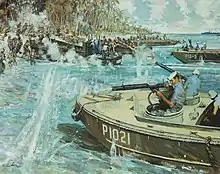
- "Did they get off?"[214]:30[215]
- — Douglas Albert Munro, Second World War Medal of Honor recipient (27 September 1942), to his friend Raymond Evans after using his Higgins boat to direct fire away from evacuating American troops
- "I have no need of your Goddamned sympathy – I want to be entertained by some of your grosser reminiscences."[18]
- — Alexander Woollcott, American critic and radio personality (23 January 1943)
- "What a life!"[18]
- — Radclyffe Hall, English poet and author (7 October 1943)
- "Spade Flush."[216]
- — Joseph P. Kennedy Jr., United States Navy lieutenant (12 August 1944), radioing code phrase prior to explosion of plane on Operation Aphrodite mission
- "I'm going down..."[217]
- — Alexandru Șerbănescu, Second World War Romanian fighter ace (18 August 1944), crashing after being shot down
- "I'm on fire."[218][note 90]
- — Walter Nowotny, Second World War German fighter ace (8 November 1944), crashing due to engine failure after combat with United States Army Air Force planes
- "C'mon you guys! Let's get these guns off the beach."[7]
- — John Basilone, United States Marine Corps Gunnery Sergeant (19 February 1945), prior to being killed at the Battle of Iwo Jima
- "I have a terrific headache."[47][58][94][219][220][note 91]
- — Franklin D. Roosevelt, president of the United States (12 April 1945), before dying of intracerebral hemorrhage
- "Are you all right?"[221]
- — Ernie Pyle, American war correspondent (18 April 1945), to Lt. Col. Joseph B. Coolidge before being fatally shot on Iejima during the Battle of Okinawa
- "Shoot me in the chest!"[222]
- ("Sparami nel petto!")
- — Benito Mussolini, Italian fascist statesman (28 April 1945), facing a partisan leader
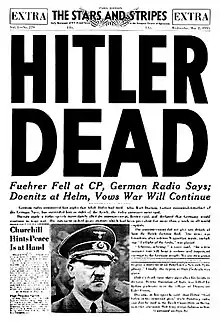
- "Above all, I charge the leadership of the nation and their followers with the strict observance of the racial laws and with merciless resistance against the universal poisoners of all peoples, international Jewry."[223]
- ("Vor allem verpflichte ich die Führung der Nation und die Gefolgschaft zur peinlichen Einhaltung der Rassegesetze und zum unbarmherzigen Widerstand gegen den Weltvergifter aller Völker, das internationale Judentum.")
- — Adolf Hitler, German Nazi statesman (30 April 1945), closing his last will before committing joint suicide with his wife Eva
- "I am Heinrich Himmler."[224]
- — Heinrich Himmler, German Nazi officer (23 May 1945)
- "I am only sad that I have to leave with a full trunk."[7][note 92]
- — Béla Bartók, Hungarian composer (26 September 1945). He died with multiple works left unfinished.
- "No. (And supposing you were?)"[18][89]
- — Robert Benchley, American humorist (21 November 1945); words jotted beside the title of an essay he was reading, "Am I Thinking?"
- "All planes close up tight ... will have to ditch unless landfall ... when the first plane drops to ten gallons, we all go down together."[225]
- — Charles Carroll Taylor, United States Naval Reserve lieutenant (5 December 1945), last transmission before Flight 19 disappeared over Bermuda Triangle
- "Shakespeare, I come."[63]
- — Theodore Dreiser, American novelist (28 December 1945)
- "What is the answer? In that case, what is the question?"[58][226][49]:198
- — Gertrude Stein, American writer (27 July 1946), addressing her life partner Alice B. Toklas
- "Go away. I'm all right."[47][48][68][note 93]
- — H. G. Wells, English author and futurist (13 August 1946)
- "God damn the whole fuckin’ world and everyone in it but you, Carlotta."[7][63][52]
- — W. C. Fields, American entertainer (25 December 1946), addressing his mistress, Carlotta Monti
- "You ass-face!"[227]
- ("¡Cara de poto!")
- — Vicente Huidobro, Chilean poet (2 January 1948); after regaining consciousness, he confessed to his loved ones that he was afraid and made his friend Henriette Petit cry, when he stared at her and shouted this expression
- "The object is directly ahead of and above me now, moving at about half my speed... It appears to be a metallic object or possibly reflection of Sun from a metallic object, and it is of tremendous size... I'm still climbing... I'm trying to close in for a better look."[228]
- — Thomas F. Mantell, Kentucky Air National Guard captain (7 January 1948), during fatal pursuit of UFO[note 94]
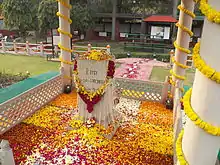
- "Oh God!"[229]
- ("हे राम!")
- — Mahatma Gandhi, Indian revolutionary and pacifist (30 January 1948), shortly after being shot by Hindu nationalist Nathuram Godse
- "I would give anything just to have written this."[72]
- — Richard Strauss, German composer and conductor (8 September 1949), holding a copy of Mozart's Clarinet Concerto
- "Doctor, if I put this here guitar down now, I ain't never gonna wake up."[52]
- — Lead Belly, American folk and blues singer, musician and songwriter (6 December 1949)
- "At fifty, everyone has the face he deserves."[7][52]
- — George Orwell, English author (21 January 1950), dying at the age of 46
- "The Gooks will never drive the Argylls off this hill."[230]
- — Kenneth Muir VC, British Army officer (23 September 1950), mortally wounded by automatic weapon fire during Battle of Hill 282
- "Say goodbye to my wife and kids."[231]
- — Ray Wetmore, American World War II flying ace (14 February 1951), prior to fatal crash of F-86 Sabre
- "Harmony."[72]
- — Arnold Schoenberg, Austrian-American composer (13 July 1951)
- "I'm finished. I don't even trust myself."[232]
- — Joseph Stalin, Soviet statesman (5 March 1953)
- "Life is still full of joy. Thumbs up for joy and adventure."[7]
- — Maude Adams, American actress known for playing Peter Pan (17 July 1953)
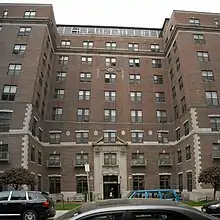
- "I knew it! I knew it! Born in a hotel room and, goddamn it, dying in a hotel room."[52][233]
- — Eugene O'Neill, American playwright (27 November 1953), to his wife Carlotta Monterey
- "I'll show you that it won't shoot."[7][52]
- — Johnny Ace, American rhythm-and-blues singer and musician (25 December 1954), playing with a .32 caliber revolver
- "Doctor, do you think it could have been the sausage?"[22]
- ("Docteur, pensez-vous que cela aurait pu être la saucisse?")
- — Paul Claudel, French writer and diplomat (23 February 1955)
- "I want to go when I want. It is tasteless to prolong life artificially. I have done my share, it is time to go. I will do it elegantly."[234]
- — Albert Einstein, German physicist (18 April 1955), declining surgery the day before his death[note 95]
- "That guy's gotta stop... He'll see us."[236]
- — James Dean, American actor (30 September 1955), to his friend Rolf Wütherich, moments before the car crash
- "I am wiling to be a junior.[7] I am glad to sit in the back row, for I had rather be a servant in the house of the Lord than to sit in the seats of the mighty."[7][94][237]
- — Alben W. Barkley, vice-president of the United States (30 April 1956), alluding to Psalms 84:10 just before dying of a heart attack while giving keynote address at the 1956 Washington and Lee Mock Convention
- "No.[161] Thanks for everything."[7][161]
- — Max Beerbohm, English essayist, parodist and caricaturist (20 May 1956), on being asked by his wife if he had had a good sleep
- "75-Hotel. I'm going into the water."[238]
- — Tom Gastall, American baseball player (20 September 1956), final radio transmission before crash of ERCO Ercoupe into Chesapeake Bay
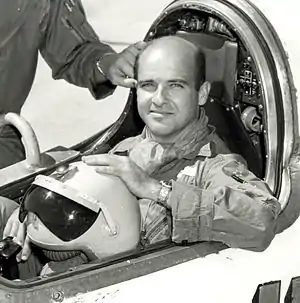
- "There she goes!"[239]
- — Milburn G. Apt, American test pilot (27 September 1956), final radio transmission while losing control of Bell X-2
- "Goodbye, kid. Hurry back."[7][52][25]
- — Humphrey Bogart, American actor (14 January 1957), to his wife Lauren as she left to collect their children, after which he entered a fatal coma
- "Were [sic] a midair collision - midair collision, 10 How we are going in-uncontrollable - uncontrollable - we are...we've had it boy - poor jet too - told you we should take chutes - say goodbye to everybody."[240]
- — Archie R. Twitchell, American actor and aviator (31 January 1957), radio transmission after 1957 Pacoima mid-air collision
- "Mind your business!"[161]
- — Wyndham Lewis, English writer and painter (7 March 1957), when asked on his deathbed about his bowels
- "No.... Awfully jolly of you to suggest it, though."[69]
- — Ronald Knox, English Roman Catholic priest and writer (24 August 1957), when Lady Elton asked if he would like her to read from his translation of the New Testament
- "I wish to announce the first plank in my campaign for reelection...we're going to have the floors in this goddamned hospital smoothed out!"[241]
- — James Michael Curley, American politician (12 November 1958), to his son while being wheeled out of surgery
- "I think I'll be more comfortable."[242][243]
- — Lou Costello, American actor and comedian (3 March 1959), asking a nurse to change his position in bed
- "I'm tired. I'm going back to bed."[58]
- — George Reeves, American actor (16 June 1959), prior to his apparent suicide
- "Are you happy? I'm happy."[7][43][note 96]
- — Ethel Barrymore, American actress (18 June 1959), to her maid, Anna Albert
- "These guys are supposed to be American? My ass!"[244][note 97]
- — Boris Vian, French polymath (23 June 1959), while watching film adaptation of his novel I Spit on Your Graves
- "Dying is easy. Comedy is difficult."[40][note 98]
- — Edmund Gwenn, English actor (6 September 1959)
- "I've had a hell of a lot of fun and I've enjoyed every minute of it."[47]
- — Errol Flynn, Australian-born American actor (14 October 1959)
- "He is safe! He is safe! Oh, joy!"[247]
- ("È salvo! È salvo! Oh, gioia!")
- — Leonard Warren, American operatic baritone (4 March 1960), performing in La Forza del Destino at the Metropolitan Opera before dying on stage
- "Why am I hemorrhaging?"[89]
- — Boris Pasternak, Russian author (30 May 1960), to his wife Zinaida
- "I'm dizzy!"[248]
- — Knud Enemark Jensen, Danish cyclist (26 August 1960), shortly before collapsing to the pavement while competing in the 1960 Summer Olympics
- "I am so bored."[249][note 99]
- — St John Philby, British Arabist and intelligence officer (30 September 1960)
- "It's...It's coming out."[250]
- — Howard Glenn, Titans of New York offensive guard (9 October 1960), in locker room after fatal in-game injury
- "You're the only one I like."[52]
- — Percy Grainger, Austalian-American composer (20 February 1961), to his wife Ella
- "Too much pain....Do something, please...to kill the pain."[251]
- — Valentin Bondarenko, Soviet cosmonaut (23 March 1961), fatally burned in altitude chamber fire
- "I'm not afraid any more."[18]
- — George S. Kaufman, American playwright (2 June 1961)
- "Goodnight my kitten."[7][52][65]
- — Ernest Hemingway, American author (2 July 1961), before committing suicide with a shotgun
- "Remember, Honey, don’t forget what I told you. Put in my coffin a deck of cards, a mashie niblick, and a pretty blonde."[7][52]
- — Chico Marx, American actor and comedian (11 October 1961), giving his wife Mary humorous instructions for his funeral
- "God bless … God damn."[18][66][49]:195
- — James Thurber, American humorist (2 November 1961)
- "Tell Georgie I want to get in the movies one way or another."[52]
- — Lucky Luciano, Italian-American gangster (26 January 1962), after meeting with a producer about a proposed film based on his life
- "Say goodbye to Pat, say goodbye to the president and say goodbye to yourself, because you're a nice guy... I'll see... I'll see."[76][note 100]
- — Marilyn Monroe, American actress (4 August 1962), over the phone to Peter Lawford, John F. Kennedy's brother-in-law
- "I'm going to stop now, but I'm going to sharpen the ax before I put it up, dear."[18][55]
- — E. E. Cummings, American poet (3 September 1962), to his wife, who was worried it was too hot for him to be chopping wood; he then suffered a stroke
- "Yes."[253]
- — Ian James Campbell, American police officer (9 March 1963), just before being fatally shot, in response to his killer asking if he had heard of the Little Lindbergh Law
- "Why crying? This is a moment of joy, a moment of glory."
- ("Perché piangere? È un momento di gioia questo, un momento di gloria")
- — Pope John XXIII speaking to his secretary (3 June 1963)
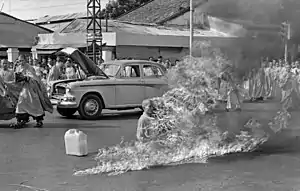
- "Homage to Amitābha Buddha."
- ("Nam mô A Di Đà Phật.")
- — Thích Quảng Đức, Vietnamese Mahayana Buddhist monk (11 June 1963), prior to self-immolation
- "Oh my God, oh my God! Where's my head, where's my head?"[49]:196
- — Stone Johnson, Kansas City Chiefs running back (8 September 1963), after suffering fractured vertebra in neck during kickoff return on 30 August 1963
- "All the damn fool things you do in life you pay for."[254][note 101]
- — Édith Piaf, French singer-songwriter (10 October 1963), to her sister
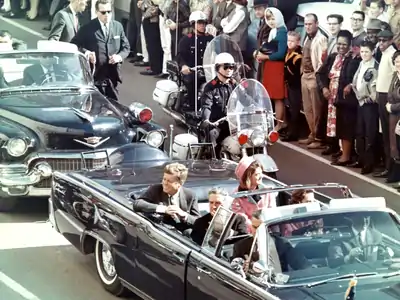
- "No, you certainly can't."[94][256][257][258][note 102]
- — John F. Kennedy, president of the United States (22 November 1963), replying to co-passenger Nellie Connally saying, "You certainly can't say Dallas doesn't love you, Mr. President." while travelling through Dallas in a motorcade, seconds before he was fatally shot by Lee Harvey Oswald
- "10-4."[259][note 103]
- — J. D. Tippit, American police officer (22 November 1963), over his police radio shortly before being shot and killed by Lee Harvey Oswald, minutes after Oswald had assassinated John F. Kennedy
- "LSD, 100 µg, im"[260]
- — Aldous Huxley, philosopher, writer (22 November 1963), to his wife Laura, ("im" being an abbreviation for intramuscular)
- "I will be glad to discuss this proposition with my attorney, and that after I talk with one, we could either discuss it with him or discuss it with my attorney if the attorney thinks it is a wise thing to do, but at the present time I have nothing more to say to you."[54]
- — Lee Harvey Oswald, assassin of President John F. Kennedy (24 November 1963), to United States Secret Service Inspector Thomas Kelly, just before being shot by Jack Ruby
- "You made one mistake. You married me."[7][261][note 104]
- — Brendan Behan, Irish writer (20 March 1964), to his wife Beatrice
- "Am I dying or is this my birthday?"[41][49]:198[note 105]
- — Nancy Astor, Viscountess Astor, American-born British politician (2 May 1964), awakening on her deathbed to see her entire family around her. (Astor died 17 days before her birthday.)
- "This is my final word. It is time for me to become an apprentice once more. I have not settled in which direction."[49]:196
- — Max Aitken, 1st Baron Beaverbrook (9 June 1964), Canadian-British newspaper publisher
- "My God, Ned, help me! I'm on fire!"[262]
- — Fireball Roberts, American stock car racer (2 July 1964), inside his burning car after 24 May 1964 wreck during the World 600 at Charlotte Motor Speedway; Roberts survived for six weeks before dying of his injuries
- "I am sorry to trouble you chaps. I don't know how you get along so fast with the traffic on the road these days."[22][65]
- — Ian Fleming, English naval intelligence officer and novelist (12 August 1964), to ambulance crew
- "Valerie."[52]
- — T. S. Eliot, American-born British poet (4 January 1965), whispering the name of his wife, Valerie Eliot
- "I'm bored with it all."[7][52][65]
- — Winston Churchill, prime minister of the United Kingdom (24 January 1965)
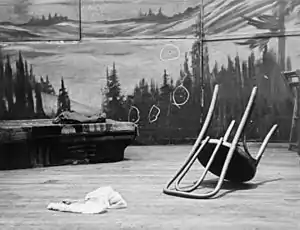
- "Brothers! Brothers, please! This is a house of peace!"[82]
- — Malcolm X, American activist (21 February 1965), trying to calm a 400-person chaos shortly before being killed by gunfire from multiple assailants
- "I'd rather be skiing."
- — Stan Laurel, English actor (23 February 1965), member of the duo Laurel & Hardy
- "I've got to get out!"[263]
- — Lou Everett, American test pilot (27 April 1965), prior to failed ejection from Ryan XV-5 Vertifan
- "Well, Jan, we were lucky at that."[52]
- — Edward R. Murrow, American broadcast journalist and war correspondent (27 April 1965), patting the hand of his wife, Janet Huntington Brewster
- "Dying is a very dull, dreary affair. And my advice to you is to have nothing whatever to do with it."[18][264]
- — W. Somerset Maugham, English author (15 December 1965), to his nephew Robin Maugham
- "Oh, father. Oh, Rama!"[265]
- — Lal Bahadur Shastri, Prime Minister of India (11 January 1966), to his doctors
- "Why can't I give up at last?"[266]
- — Buster Keaton, American actor, comedian and filmmaker (1 February 1966)
- "Final ILS two four."[267]
- — Elliot See, American astronaut (28 February 1966), prior to plane crash that killed him and fellow astronaut Charles Bassett
- "Do you know where I can get any shit?"[43]
- — Lenny Bruce, American comedian (3 August 1966), asking about the availability of drugs

- "Emerg—"[268]
- — Nick Piantanida, American parachutist (29 August 1966), making emergency transmission from Strato Jump III balloon during decompression accident on 1 May 1966; the accident left him in a coma until his death
- "A party! Let's have a party."[52]
- — Margaret Sanger, American birth control activist (6 September 1966)
- "Ron Miller \ Way Down Cellar \ Kirt Russell [sic] \ CIA - Mobley"[269][270]
- — Walt Disney, American animation pioneer and businessman (15 December 1966), written on the bottom of a page
- "The water's dark green and I can't see a bloody thing. Hallo the bow is up. I'm going. I'm on my back. I'm gone."[271]
- — Donald Campbell, British racer (4 January 1967), just before fatal crash of Bluebird K7 hydroplane while trying to set new world water speed record
- "I said how are we going to get to the moon if we can't talk between two or three buildings?"[272][273][274]
- — Gus Grissom, American astronaut (27 January 1967), during Apollo 1 launch rehearsal test moments before a deadly fire broke out
- "We've reached one of our phase lines after the fire fight and it smells bad—meaning it's a little bit suspicious...Could be an amb—"[275]
- — Bernard B. Fall, American war correspondent and historian (21 February 1967); spoken into tape recorder just before stepping on land mine that killed him and U.S. Marine Byron G. Highland
- "Thank you for transmitting all of that. [Separation] occurred. [garbled]"[276]
- — Vladimir Komarov, Soviet cosmonaut (24 April 1967), final transmission before fatal crash of Soyuz 1 spacecraft
- "Excuse my dust."[18]
- — Dorothy Parker, American writer and wit (7 June 1967)
- "On! On! On!"[277][note 106]
- — Tom Simpson, British cyclist (13 July 1967), asking to be put back on his bike prior to his death on Mont Ventoux during the 1967 Tour de France
- "Mayday, Mayday! This is NASA 922, ejecting just off Orlando...I mean Tallahassee!"[278][279]
- — Clifton Williams, American astronaut (5 October 1967), prior to unsuccessful ejection from crashing airplane
- "I know you are here to kill me. Shoot, coward, you are only going to kill a man."[40][280]
- ("Sé que estás aquí para matarme. Dispara, cobarde, solo vas a matar a un hombre.")
- — Che Guevara, Argentinean statesman and revolutionary (9 October 1967), facing his captors
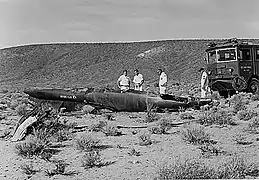
- "I'm in a spin."[281][282]
- — Michael J. Adams, American astronaut (15 November 1967), prior to crash of North American X-15 spaceplane
- "I know this beach like the back of my hand."[283]
- — Harold Holt, Prime Minister of Australia (17 December 1967), prior to disappearing while swimming at Cheviot Beach
- "Never again, never again."[284]
- — Bill Masterton, Canadian American ice hockey player (15 January 1968), after sustaining fatal head injury in NHL game
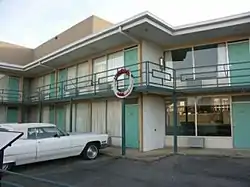
- "Ben, make sure you play 'Take My Hand, Precious Lord' in the meeting tonight. Play it real pretty."[285]
- — Martin Luther King Jr., American civil rights activist (4 April 1968), speaking to musician Ben Branch shortly before being assassinated
- "Don't lift me."[286][287][288]
- — Robert F. Kennedy, American politician (6 June 1968), speaking to medical attendants who lifted him onto a stretcher several minutes after he was shot and fatally losing consciousness shortly thereafter
- "Codeine... bourbon."[7][43][289]
- — Tallulah Bankhead, American actress (12 December 1968)
- "I've always loved my wife, my children, and my grandchildren, and I've always loved my country.[47][63] I want to go. God, take me."[47][94][63]
- — Dwight D. Eisenhower, president of the United States (28 March 1969)
- "Happy anniversary. I love you."[52][290]
- — Vince Lombardi, American football coach (3 September 1970), to his wife
- "Roger."[291]
- — William Schaffner, United States Air Force pilot (8 September 1970), prior to his BAC Lightning crashing into the North Sea; some commentators would allege that a UFO was involved in the incident
- "I feel pain here."[22][292]
- ("Ça fait mal là.")
- — Charles de Gaulle, French statesman (9 November 1970), pointing at his neck seconds before he unexpectedly died from aneurysm
- "Human life is limited; but I would like to live forever."[69]
- — Yukio Mishima, Japanese author (25 November 1970), prior to seppuku
- "You see, this is how you die."
- ("Vous voyez, c'est comme ça que vous mourez.")
- — Coco Chanel, French fashion businesswoman (10 January 1971)
- "How did the Mets do today?"[7][52][293]
- — Moe Berg, American baseball player (29 May 1972), to his nurse
- "Send Mike immediately."[94]
- — Lyndon B. Johnson, president of the United States (22 January 1973), referring to his Secret Service agent
- "Good night my darlings. I'll see you tomorrow."[22]
- — Noël Coward, English playwright, composer and performer (26 March 1973), going to bed the night before he died
- "Drink to me."[47][54]
- — Pablo Picasso, Spanish artist (8 April 1973)
- "It is stuffy, sticky, and rainy here at present – but forecasts are more favourable."[294]
- — J. R. R. Tolkien, English writer and academic (2 September 1973), postscript of letter to his daughter Priscilla

- "Long live Chile! Long live the people! Long live the workers! These are my last words, and I am certain that my sacrifice will not be in vain. I am certain that, at the very least, it will be a moral lesson that will punish felony, cowardice and treason."[7][295]
- ("¡Viva Chile! ¡Viva el pueblo! ¡Vivan los trabajadores! Estas son mis últimas palabras y tengo la certeza de que mi sacrificio no será en vano, tengo la certeza de que, por lo menos, será una lección moral que castigará la felonía, la cobardía y la traición.")
- — Salvador Allende, Marxist President of Chile (11 September 1973), addressing the nation during the 1973 Chilean coup d'état before killing himself
- "Throw it, just throw it."[22]
- — Murray Hudson, GC, New Zealand infantry sergeant (13 February 1974), to a soldier who froze with an armed grenade; the grenade exploded as Hudson tried to release it, killing both men
- "My dear, before you kiss me good-bye, fix your hair. It's a mess."[69]
- — George Kelly, American playwright and actor (18 June 1974), to one of his nieces
- "In keeping with Channel 40's policy of bringing you the latest in blood and guts and in living color, you are going to see another first - an attempted suicide."[296][297]
- — Christine Chubbuck, American news anchor for WXLT (15 July 1974), immediately before shooting herself in the head on air
- "Oh, you young people act like old men. You are no fun."[7][52]
- — Josephine Baker, French-American dancer and singer (12 April 1975)
- "You can't kill this tough Jew."[298]
- — Rod Serling, American screenwriter (28 June 1975), note written from hospital bed to colleague Owen Comora
- "Mark, I've seen God four times, and I'm going to see him again soon. That's No. 1 to me, and you're No. 2."[299]
- — Vaughn Bodē, American cartoonist and illustrator (18 July 1975), to his son
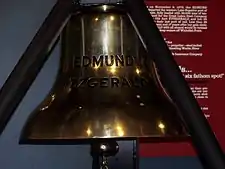
- "We are holding our own."[300][301]
- — Ernest M. McSorley, Canadian sailor and captain of SS Edmund Fitzgerald (10 November 1975), last transmission before ship went down in storm on Lake Superior
- "Oh God! No! Help! Someone help!"[69]
- — Sal Mineo, American actor (12 February 1976), while being murdered
- "I feel ill. Call the doctors."[302]
- ("我很难受,叫医生来。")
- — Mao Zedong, Chinese statesman and revolutionary (9 September 1976)
- "There’s nothing more to say. It’s all in the film."[303]
- — Edith Ewing Bouvier Beale, American socialite (5 February 1977), to her daughter, Edith Bouvier Beale, referring to the documentary Grey Gardens
- "Damn it, don't you DARE ask God to help me."[52][304]
- — Joan Crawford, American actress (10 May 1977), to a housekeeper who was praying for her soul
- "A certain butterfly is already on the wing."[52]
- — Vladimir Nabokov, Russian-American author and entomologist (2 July 1977); he had a keen interest in butterflies
- "TV four just lost -"[305]
- — Francis Gary Powers, American pilot (1 August 1977), last radio transmission before helicopter crash killed him and cameraman George Spears
- "I'm going to the bathroom to read."[7][52]
- — Elvis Presley, American musician (16 August 1977), shortly before being found dead on the bathroom floor
- "This is no way to live!"[7][52][306]
- — Groucho Marx, American actor and comedian (19 August 1977)
- "That was a great game of golf, fellas.[55][307] Let's get a Coke."[308]
- — Bing Crosby, American singer and actor (14 October 1977), moments before collapsing and dying of a heart attack
- "Why not? After all, it belongs to him."[55]
- — Charlie Chaplin, English actor and filmmaker (25 December 1977), to a priest who had said, "May the Lord have mercy on your soul"
- "What do you think I'm gonna do? Blow my brains out?"[309]
- — Terry Kath, American lead singer and guitarist for Chicago (23 January 1978), before accidentally shooting himself
- "Don't worry, I can do it. I can get to land."[7][note 107]
- — Eddie Aikau, American lifeguard and surfer (17 March 1978), leaving voyaging canoe Hōkūleʻa after it began leaking to paddle to shore for help. The rest of the canoe's crew were rescued.
- "This is it, baby."
- — Captain James McFeron, pilot of PSA Flight 182 (25 September 1978), as the Boeing 727 crashed after colliding with a Cessna 172 over San Diego
- "It is hovering and it's not an aircraft."[310]
- — Frederick Valentich, Australian aviator (21 October 1978), last transmission before disappearing after possibly sighting a UFO
- "All stop."[311]
- — Tony Prangley, British commercial diver (26 November 1978), prior to anchor chain severing diving bell connections to MS Star Canopus, causing bell containing Prangley and fellow diver Michael Ward to plummet to the sea floor
- "Leave the shower curtain on the inside of the tub."[40]
- — Conrad Hilton, American hotelier (3 January 1979), on being asked if he had any final words of wisdom
- "It must have been the coffee."[52]
- — Jack Soo, American actor (11 January 1979); speaking to Hal Linden while being wheeled into operating room, referring to the bad coffee Soo's character made on their sitcom Barney Miller
- "Of course I know who you are. You're my girl. I love you."[52][290]
- — John Wayne, American actor (11 June 1979), to his daughter, Aissa Wayne, who had asked if he knew who she was
- "Are you guys okay?"[312]
- — Thurman Munson, American baseball player (2 August 1979), trapped in crashed plane, to his two passengers, who survived
- "I love you very much, my dear Beaver."[52]
- — Jean-Paul Sartre, French philosopher and writer (15 April 1980), to his partner, Simone de Beauvoir
- "One never knows the ending. One has to die to know exactly what happens after death, although Catholics have their hopes."[52][306]
- — Alfred Hitchcock, English filmmaker (29 April 1980)
.jpg.webp)
- "Vancouver! Vancouver! This is it!"[22][313]
- — David A. Johnston, American volcanologist (18 May 1980), reporting the 1980 eruption of Mount St. Helens from observation post
- "I'm shot! I'm shot!"[note 108][316]
- — John Lennon, English musician (8 December 1980), moments after being fatally shot
- "This is where the real fun starts."[18]
- — Ben Travers, English writer (18 December 1980)
- "Money can't buy life."[82][28]
- — Bob Marley, Jamaican musician (11 May 1981)
- "Everybody has got to die, but I have always believed an exception would be made in my case. Now what?"[58]
- — William Saroyan, American author (18 May 1981); final message telephoned to Associated Press
- "Just don't leave me alone."[7][317]
- — John Belushi, American actor and comedian (5 March 1982), before dying of drug overdose
- "I am going."[58]
- — Sobhuza II, King of Swaziland, longest verifiably-reigning monarch in recorded history (21 August 1982), to his minister of health after halting a meeting
- "Mother, I'm going to get my things and get out of this house. Father hates me and I'm never coming back."[22]
- — Marvin Gaye, American singer (1 April 1984), moments before being shot to death by his father
- "Mama— Mama— Mama."[52]
- — Truman Capote, American author (25 August 1984). He had been separated from his mother for several years during his childhood.
- "It's... the end!"[318]
- ("ああ、だめだ")
- — Captain Masami Takahama (12 August 1985), pilot of Japan Airlines Flight 123, just before the plane crashed into a mountain
- "I have a problem, I have a real problem."[319]
- — Art Scholl, American aerobatic pilot (16 September 1985), after his plane entered a flat inverted spin during filming of Top Gun
- "No, I don't believe so."
- — Rock Hudson, American actor (2 October 1985)
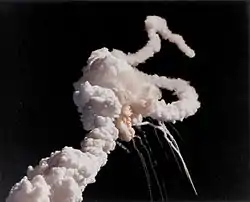
- "Uh oh."[320]
- — Michael J. Smith, American astronaut (28 January 1986), prior to the disintegration of Space Shuttle Challenger one minute and thirteen seconds after liftoff
- "Don't worry. It's all right."[321]
- — Benny Goodman, American clarinetist (13 June 1986), to his friend Carol Smith, who discovered him pale and slumped on his couch after suffering an apparent heart attack
- "Hit the water! Hit the water! Hit the water!"[322][323]
- — Jane Dornacker, American rock musician and traffic reporter (22 October 1986), prior to fatal crash of WNBC Radio helicopter into Hudson River
- "I love you too, honey. Good luck with your show."[7]
- — Desi Arnaz, Cuban-American bandleader, actor and film and television producer (2 December 1986), over the phone to his former wife, Lucille Ball
- "Don't, don't, don't, this will hurt someone. Sit down."[324]
- — R. Budd Dwyer, American politician (22 January 1987), to the reporters who tried to stop him from shooting himself on live television
- "Yeah, country music."[52]
- — Buddy Rich, American jazz drummer and bandleader (2 April 1987), to a nurse who asked him, "Is there anything you can't take?" He then died during surgery.
- "I feel great."[52][325]
- — Pete Maravich, American basketball player (5 January 1988), before dying of undiagnosed heart defect during pickup game
- "This dying is boring."[52]
- — Richard Feynman, American theoretical physicist and raconteur (15 February 1988)
- "Where is my clock?"[22]
- ("Dónde está mi reloj?")
- — Salvador Dalí, Spanish surrealist painter (23 January 1989)
- "I'm begging you, let me work!"[326]
- — Osamu Tezuka, Japanese cartoonist (9 February 1989), to a nurse who tried to take away his drawing equipment
- "My Florida water."[7]
- — Lucille Ball, American actress, television producer and studio executive (26 April 1989), when asked if she wanted anything
- "Ah, shit."[327]
- — Marc Lépine, Canadian perpetrator of the École Polytechnique massacre (6 December 1989), in which he killed fourteen women, before fatally shooting himself
- "I don't want to lay down."[328]
- — Hank Gathers, American basketball player (4 March 1990), after collapsing during game
- "What is this?"[7][329]
- — Leonard Bernstein, American composer and conductor (14 October 1990), on receiving an injection
- "Ow, fuck!"[330]
- — Roald Dahl, British author (23 November 1990), after a nurse pricked him with a needle
- "Will it be an interesting experience? Will I find out what lies beyond the barrier? Why does it take so long to come?"[161]
- — Graham Greene, English novelist (3 April 1991), to his companion Yvonne Cloetta
- "Don't worry. Relax."[331]
- — Rajiv Gandhi, former Prime Minister of India (21 May 1991), spoken to a policewoman at his assassination
- "You're right. It's time. I love you all."[52][290]
- — Michael Landon, American actor (1 July 1991), when one of his sons said it was time to move on
- "Thank you."[332]
- — Freddie Mercury, British lead vocalist of Queen (24 November 1991), to his assistant Peter Freestone, before he slipped into a coma and died shortly thereafter.
- "Okay, okay, okay."[333]
- — Sam Kinison, American comic (10 April 1992), spoken after a fatal car accident
- "I HAVE HAD A HAPPY LIFE AND THANK THE LORD. GOODBYE AND MAY GOD BLESS ALL!"[334]
- — Chris McCandless, American hiker (18 August 1992), final note written before dying of starvation
- "I want the world to be filled with white fluffy duckies."[52]
- — Derek Jarman, English film director, stage designer and author (19 February 1994)
- "Help."[94]
- — Richard Nixon, president of the United States (22 April 1994), to a housekeeper while suffering a stroke

- "The car seems OK ..."[335]
- — Ayrton Senna, Brazilian Formula One driver (1 May 1994), prior to fatal crash at 1994 San Marino Grand Prix
- "Yolanda...158."[336]
- — Selena Quintanilla-Pérez, American singer (31 March 1995), explaining her murderer's name and room number to the hotel staff shortly after being shot
- "You only live so long."[337]
- — Richard Versalle, American operatic tenor (5 January 1996), performing in The Makropulos Case at the Metropolitan Opera before dying on stage
- "Mom, do you hear the rain? Do you hear the rain?[22][63] Mom, I just want to take off in the plane."[63]
- — Jessica Dubroff, seven-year-old American pilot trainee (11 April 1996), before dying in aircraft crash. Pilots at airport later testified that the weather was unsuitable for flight.[338]
- "I love you. Sleep well, my sweetheart. Please don't worry too much."[339]
- — Rob Hall, New Zealand mountaineer (11 May 1996), speaking to his wife by satellite phone before dying on Mount Everest
- "Why? Why not?"[340][note 109]
- — Timothy Leary, American psychologist and writer (31 May 1996)
- "This is for you!"[341]
- — Ricardo López, Uruguayan-born American pest controller (12 September 1996), before committing suicide with a gun after he mailed a bomb to Icelandic musician Björk, attempting to kill her
- "Fuck you."[342]
- — Tupac "2Pac" Shakur, American rapper (13 September 1996), to the first responder police officer at the scene of his murder
- "I'm going to be with Gloria now."[343]
- — James Stewart, American actor (2 July 1997), referring to his late wife
- "My God, what's happened?"[63][344][345]
- — Diana, former princess consort of Charles, Prince of Wales (31 August 1997), shortly after being fatally wounded in a car accident
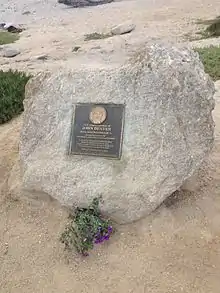
- "Do you have it now?"[346]
- — John Denver, American singer-songwriter (12 October 1997), asking if he had transmitted a four-digit code properly prior to crash of his experimental Rutan Long-EZ aircraft
- "And where do you come from?"[22]
- — Isaiah Berlin, Russian-British philosopher (5 November 1997), to a nurse
- "Please don't leave me."[317]
- — Chris Farley, American actor and comedian (18 December 1997), to a prostitute, leaving a motel where he spent his last night
- "I'm losing it."[7][52]
- — Frank Sinatra, American singer and actor (14 May 1998)
- "I'll finally get to see Marilyn."[290][347][note 110]
- — Joe DiMaggio, American baseball player (8 March 1999)
- "Oooh, the Godfather, just saying his name makes my blue blood boil. OHHH! The Godfather, my arch nemesis, he represents everything that's wrong with the WWF. But fear not, because I, the Blue Blazer, will always triumph over evil doers, and you know why, because I always take my vitamins, say my prayers, and drink my milk, WHOOO!"[348]
- — Owen Hart, Canadian-American professional wrestler (23 May 1999), being interviewed on camera prior to fatal fall into ring at Over the Edge (1999)
21st century
- "Okay, just wondering."[349][note 111]
- — Dale Earnhardt, American race car driver (18 February 2001), after asking teammate Andy Pilgrim if he had any advice for him prior to his fatal crash in the 2001 Daytona 500
- "Are you guys ready? Let's roll."[7][350]
- – Todd Beamer, American passenger on United Airlines Flight 93 (11 September 2001), signaling the start of the revolt against the flight's hijackers, resulting in the plane crashing in the ensuing struggle for the controls, killing all 44 aboard
- "Love one another."[290]
- — George Harrison, English musician and songwriter (29 November 2001), to his wife, Olivia Harrison, and son, Dhani Harrison
- "It was the food!"[351]
- — Richard Harris, Irish actor and singer (25 October 2002), while being wheeled out of the Savoy Hotel
- "Channel 5 is all shit, isn't it? Christ, the crap they put on there. It's a waste of space."[352]
- — Adam Faith, English singer and actor (8 March 2003)
- "Leave me alone, I'm fine."[353]
- — Barry White, American singer and songwriter (4 July 2003), to a nurse
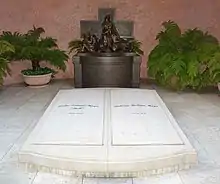
- "Surprise me."[306]
- — Bob Hope, American actor and comedian (27 July 2003), on being asked by his wife, Dolores Hope, where he wanted to be buried
- "I should have been a concert pianist."[22]
- — Edward Teller, Hungarian-American physicist (9 September 2003)
- "It's time."[354]
- — Johnny Cash, American singer-songwriter (12 September 2003), responding to his physical therapist after being unable to complete any of his therapy for the day due to his extremely poor health. He died in a hospital a few hours later after his health suddenly plummeted.
- "I'd like to thank the Academy for my lifetime achievement award that I will eventually get."[52]
- — Donald O'Connor, American actor, dancer and singer (27 September 2003), spoken to his family at his bedside
- "Jeb. Just remember, whatever happens, happens."[355][356]
- — Dwain Weston, Australian BASE jumper (5 October 2003), to fellow skydiver Jeb Corliss prior to fatal wingsuit flight over the Royal Gorge Bridge, during which he struck the bridge while flying at 120 miles per hour (190 km/h)
- "Thank you."[357]
- — Ricardo Alfonso Cerna, Guatemalan criminal (19 December 2003), to a police officer who gave him a bottle of water, seconds before committing suicide with his .45-caliber handgun, which he had concealed within his clothing
- "Now I'll show you how an Italian dies!"[304][358][359]
- ("Vi faccio vedere come muore un Italiano!")
- — Fabrizio Quattrocchi, Italian security officer (14 April 2004), to Islamist militant kidnappers in Iraq forcing him to dig his own grave while wearing a hood. Quattrocchi tried to pull the hood off and shouted his last words, and was then shot in the neck.
- "What are you shooting at?! I'm Pat Tillman! I'm Pat fucking TILLMAN!"[360][361]
- — Pat Tillman, American football player and Army Ranger (22 April 2004), while being fatally wounded by friendly fire in Afghanistan
- "My name is Nick Berg, my father's name is Michael, my mother's name is Suzanne. I have a brother and sister, David and Sara. I live in West Chester, Pennsylvania, near Philadelphia."[362]
- — Nick Berg, American radio tower repairman (7 May 2004), on video before beheading by Islamist militants
- "I look forward to taking that off."[363]
- — Dave Shaw, Australian commercial aviator and technical diver (8 January 2005), referring to his dive mask at beginning of fatal dive to recover body of Deon Dreyer
- "Let me go to the house of the Father."[364]
- ("Pozwólcie mi iść do domu Ojca.")
- — Pope John Paul II (2 April 2005)
- "You're a lifesaver, Andy."[22]
- — William Donaldson, British satirist and playboy (22 June 2005), to the caretaker of his building, who had collected pills for him
- "Roger that, sir. Thank you."[365]
- — Michael P. Murphy, United States Navy SEAL and Medal of Honor recipient (28 June 2005), ending a radio call for help after being shot during Operation Red Wings
- "Don't die like I did."
- — George Best, Northern Irish football player (25 November 2005)
- "I'm dying."[366][367]
- — Steve Irwin, Australian conservationist (4 September 2006), to cameraman Justin Lyons after being pierced in the chest by a stingray barb
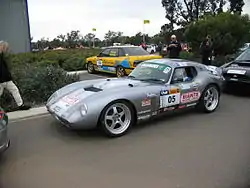
- "C'mon. Let's get this day over and done with."[368]
- — Peter Brock, Australian motor racing driver (8 September 2006), to track marshal before dying in race crash
- "Lucy."[369][370]
- — Augusto Pinochet, Chilean general and statesman (10 December 2006), calling his wife Lucía Hiriart by his affectionate name for her
- "I'm going away tonight."[52][371]
- — James Brown, American musician (25 December 2006), to his manager Charles Bobbit, before dying after falling asleep
- "Katie, Katie, look, it'll be fine, you know, I just need to get some sleep."
- — Heath Ledger, Australian actor (22 January 2008)

- "More milk."[372][373]
- — Michael Jackson, American musician (25 June 2009), asking his doctor for more propofol shortly before he died from an overdose of the same drug
- "I'm the happiest man in the world. I've just summited a beautiful mountain."[374]
- — Clifton Maloney, American businessman (25 September 2009), prior to falling asleep and not waking up at Camp 2 on Cho Oyu
- "Mom, I hope you have a good day at work and I love you very much. Love, Jennifer."[375]
- — Jennifer Daugherty, American mentally handicapped woman who was tortured to death (11 February 2010), note written to her mother
- "Thank you all for the outpouring of support during my latest bout with cancer. It’s true that my cancer is serious, but all cancer is serious. If there is such a thing as a good time for this to happen, then this is it. Physically and mentally, I am in great shape. I am a vegetarian; I exercise and have been clean and sober for 25 years. This combined with the very best medical treatments available I am looking forward to the future. All I ask is for everyone to please remain positive, keep your prayers and warm thoughts coming and together we can remain strong. You all have a special place in my heart and I can’t wait to meet you all and thank you in person. Love, Doug Fieger."
- — Doug Fieger, American musician (14 February 2010) writing his last message on The Knack's website
- "Thanks for your help. Have a great day."[376]
- — Andrew Joseph Stack III, American embedded software developer (18 February 2010), to air traffic control shortly before intentionally crashing his plane into an office building in Austin, Texas
- "Stopping for a beer, be there when I can."[377]
- — Ryan Dunn, American stunt performer (20 June 2011), last text to Bam Margera prior to fatal car crash
- "Oh wow. Oh wow. Oh wow."[7][52][378]
- — Steve Jobs, American electronics businessman (5 October 2011), looking at his family
.jpg.webp)
- "I'm ready to go for this thing; we can win this thing."[379]
- — Dan Wheldon, British motor racing driver (16 October 2011), last radio transmission before fatal crash at the 2011 IZOD IndyCar World Championship
- "Capitalism... Downfall."[380]
- — Christopher Hitchens, English-American author, to his agent Steven Wasserman (15 December 2011)
- "I'm gonna go see Jesus, want to see Jesus."[381][382]
- — Whitney Houston, American musician (11 February 2012)
- "I called you a putz cause I thought you werebeing [sic] intentionally disingenuous. If not I apologize.@CenLamar @dust92"[383]
- — Andrew Breitbart, American conservative publisher and writer (1 March 2012), final tweet before dying of heart attack
- "I love you"[384]
- — Taruni Sachdev, Indian child actress and model (14 May 2012), final text to best friend before dying in 2012 Agni Air Dornier 228 crash
- "I don't want to die, please don't let me die."[385]
- ("No quiero morir, por favor no me dejen morir.")
- — Hugo Chávez, Venezuelan statesman (5 March 2013), whispering unable to speak
- "Get to a safe place. Something really bad might happen."[386]
- — Michael Landsberry, teacher, Marine, victim of the Sparks Middle School shooting (21 October 2013), while attempting to disarm the shooter.
- "Hey, let's go for a drive."[387]
- — Paul Walker, American actor (30 November 2013), prior to dying with his friend Roger Rodas in crash of Porsche Carrera GT
- "I can't breathe. I can't breathe. I can't breathe. I can't breathe. I can't breathe. I can't breathe. I can't breathe. I can't breathe. I can't breathe. I can't breathe. I can't breathe."[388]
- — Eric Garner, American former horticulturist (17 July 2014), after being put in a chokehold by an arresting NYPD officer
- "@ChavesRGB Here i am. A hug, with love from your friend: Chespirito."[389]
- ("@ChavesRGB Aquí estoy. Un abrazo, con cariño de tu amigo: Chespirito.")
- — Chespirito (Roberto Gómez Bolaños), Mexican comedian, screenwriter, actor, and director (28 November 2014), final tweet, responding to a Brazilian fan club account
- "A life is like a garden. Perfect moments can be had, but not preserved, except in memory. LLAP"[383]
- — Leonard Nimoy, American actor, filmmaker and photographer (27 February 2015), final tweet
- "Music has been my doorway of perception and the house that I live in."[390][391]
- — David Bowie, English singer-songwriter and actor (10 January 2016) to his friend Gary Oldman
- "I miss her so much,[290] I want to be with Carrie."[290][392]
- — Debbie Reynolds, American actress and singer (28 December 2016), before dying of intracerebral hemorrhage one day after the death of her daughter, Carrie Fisher
- "Judges! Slobodan Praljak is not a war criminal, with disdain, I reject this verdict. I have taken poison."[393]
- ("Suci! Slobodan Praljak nije ratni zločinac, s prijezirom odbacujem vašu presudu. To je otrov koji sam popio.")
- — Slobodan Praljak, Croatian General (29 November 2017) during the pronouncement of the appeal judgment against him at the ICTY
- "I wouldn't know how to land it. I wasn't really planning on landing it."[394]
- — Richard Russell, American airport worker (10 August 2018), before crashing a Bombardier Dash 8-Q400 into an island in Washington
- "God bless. Take care of my boy, Roy."[395]
- — Stan Lee, American comic book writer and publisher (12 November 2018)
- "I love you, too."[396]
- — George H. W. Bush, president of the United States (30 November 2018), speaking to his son George
- "As no document mentions me and no indication or evidence reaches me, they only have SPECULATION or invent intermediaries. I never sold myself and it's proven."[397]
- ("Como en ningún documento se me menciona y ningún indicio ni evidencia me alcanza sólo les queda la ESPECULACIÓN o inventar intermediarios. Jamás me vendí y está probado.")
- — Alan García, Peruvian statesman (17 April 2019), final tweet, one day before committing suicide
- "I can't fix myself."[398]
- — Elijah McClain, American massage therapist (24 August 2019), after being put in a chokehold by an arresting Aurora, Colorado police officer
- "My stomach hurts, my neck hurts, everything hurts ...[399] Man, I can't breathe."[400]
- — George Floyd, American former restaurant security guard (25 May 2020), whose death gained notoriety as he was held in a physical restraint by Minneapolis Police Officer Derek Chauvin, from which he allegedly stopped breathing and later died
- "I, Ennio Morricone, am dead. So I announce it to all the friends who have always been close to me and also to those who are a little far away and I greet them with great affection. Impossible to name them all. But a special memory is for Peppuccio and Roberta, fraternal friends very present in the last years of our life. There is only one reason that drives me to greet everyone like this and to have a funeral in private; I don't want to disturb. I warmly greet Ines, Laura, Sara, Enzo and Norbert, for having shared a large part of my life with me and my family. I want to remember my sisters Adriana, Maria, Franca and their loved ones with love and let them know how much I loved them. A full, intense and profound greeting to my children Marco, Alessandra, Andrea, Giovanni, my daughter-in-law Monica, and to my grandchildren Francesca, Valentina, Francesco and Luca. I hope they understand how much I loved them. Last but not least, Maria. I renew to you the extraordinary love that has held us together and that I am sorry to abandon. The most painful farewell to you"[401]
- ("Io, Ennio Morricone, sono morto. Lo annuncio così a tutti gli amici che mi sono stati sempre vicino e anche a quelli un po’ lontani che saluto con grande affetto. Impossibile nominarli tutti. Ma un ricordo particolare è per Peppuccio e Roberta, amici fraterni molto presenti in questi ultimi anni della nostra vita. C’è una sola ragione che mi spinge a salutare tutti così e ad avere un funerale in forma privata; non voglio disturbare. Saluto con tanto affetto Ines, Laura, Sara, Enzo e Norbert, per aver condiviso con me e la mia famiglia gran parte della mia vita. Voglio ricordare con amore le mie sorelle Adriana, Maria, Franca e i loro cari e far sapere loro quanto gli ho voluto bene. Un saluto pieno, intenso e profondo ai miei figli Marco, Alessandra, Andrea, Giovanni, mia nuora Monica, e ai miei nipoti Francesca, Valentina, Francesco e Luca. Spero che comprendano quanto li ho amati. Per ultima, ma non per importanza, Maria. A lei rinnovo l’amore straordinario che ci ha tenuto insieme e che mi dispiace abbandonare. A Lei il più doloroso addio")
- — Ennio Morricone, Italian composer and conductor (6 July 2020), writing his final obituary before dying in hospital
- "Help"
- — Naya Marie Rivera, American actress, singer and model (8 July 2020). Shortly after jumping in the water with her son, she told him to get back onto their boat. She helped him back onto the boat; moments later she yelled "Help", with her arm in the air. However, she disappeared into the water.
- "It broke me, man, but we need to do that for them. People deserve abundant life, special moments. They've been through hell battling disease. If we were able to ease their suffering and bring joy for a moment, and hopefully moments (as) he goes through the bags, then we made a difference in his life."[402]
- — Chadwick Boseman, American actor (28 August 2020), his final text to a producer about sending a personalized message to a fan through the Make-A-Wish Foundation.[402]
- "My most fervent wish is that I will not be replaced until a new president is installed."[403]
- — Ruth Bader Ginsburg, Associate Justice of the United States Supreme Court (18 September 2020), dictated to her granddaughter.
- "We messed up. We let our guard down. Please tell everybody to be careful. This is real, and if you get diagnosed, get help immediately."[404]
- — Larry Dixon, Alabama State Senator (4 December 2020), dying of COVID-19
Ironic last words
- "They couldn't hit an elephant at this distance!" General John Sedgwick at the Battle of Spotsylvania Court House immediately before being killed by enemy fire.[405]
- "Let all brave Prussians follow me!" Field Marshal Kurt Christoph Graf von Schwerin at the Battle of Prague, immediately before being struck by a cannonball.[73][406][74]
- "What do you think I'm gonna do? Blow my brains out?" Terry Kath of the band Chicago, just before putting a supposedly unloaded pistol to his temple and pulling the trigger.[407]
Last words of people sentenced to death
- Agis IV, king of Sparta, prior to execution by strangulation: "Weep not, friend, for me,[7][13]:30[15] who dies innocent, by the lawless act of wicked men. My condition is much better than theirs."[7][13]:30
- John André, British Army officer, prior to being hanged as a spy by the Continental Army: "I pray you to bear me witness that I meet my fate like a brave man.[7][15][408] It will be but a momentary pang."[7][13]:66[15]
- Andronikos I Komnenos, Byzantine Emperor, lynched by his former subjects: "Lord, have mercy upon me. Wilt thou break a bruised reed?"[7][15]
- Eugene Aram, asked if he had anything to say before hanging: "No."[7][15]
- Arshadu'd-Dawla, before being executed for involvement in a plot to restore Mohammad Ali Shah Qajar to the Persian throne: "Zindabad Muhammad Ali Shah!" ("Long live Shah Muhammad Ali!")[409]
- Jean Sylvain Bailly, French astronomer, mathematician and politician, to a heckler who asked if he was trembling as he approached the guillotine: "Oui mon ami, mais c'est de froid." ("Yes my friend, but it's from the cold").[410]
- Lena Baker: "What I done, I did in self-defense, or I would have been killed myself. Where I was I could not overcome it. God has forgiven me. I have nothing against anyone. I picked cotton for Mr. Pritchett, and he has been good to me. I am ready to go. I am one in the number.[411] I am ready to meet my God.[7][411] I have a very strong conscience."[411]
- Antoine Barnave: "Better to suffer and to die than to lose one shade of my moral and political character."[13]:39–40[note 112]
- John Yates Beall, hanged as a Confederate spy during the American Civil War: "I protest against this execution. It is absolute murder—brutal murder. I die in the service and defense of my country."[7]
- Arthur Gary Bishop: "I want to offer again my most profound and heartfelt apologies to my victims' families. I am truly sorry. I have tried my best to empathize with their grief and devastation and I hope they come to know of my concerns and prayers for them."[412]
- Black Caesar, nicknamed after the eponymous pirate and one of the first convicts transported in Australia by the British Empire, escaped the penal colony in 1789 and lived as a bushranger in the wilderness. He survived by raiding garden patches with a stolen gun. When he was eventually caught, according to colonial governor David Collins, he was "so indifferent about meeting death, that he declared in confinement that if he should be hanged he would create a laugh before he was turned off, by playing some trick upon the executioner."[413]
- Dmitry Bogrov, before being executed for assassination of the Russian Prime Minister Pyotr Stolypin: (to the executioner) "Should I lift my head a bit?"
- Anne Boleyn: "Oh God, have pity on my soul. Oh God, have pity on my soul."[43][note 113]
- Jerome Bowden: "My name is Jerome Bowden, and I would just like to state that my execution is about to be carried out. And I would like to thank the people at this institution for taking such good care of me in the way that they did. And I hope that by my execution being carried out, that it may bring some light to this thing that is wrong. And I would like to have a final prayer with Chaplain Lizzel if that is possible. Thank you very much."[414]
- John Brown: "I, John Brown, am now quite certain that the crimes of this guilty land will never be purged away but with blood.[43] I had, as I now think, vainly flattered myself that without very much bloodshed it might be done."
- Ted Bundy: "Give my love to my family and friends."[415]
- Edith Cavell, the British nurse executed on 12 October 1915 in German-occupied Belgium because of having helped Allied soldiers escape to the then neutral Netherlands, spoke on the night before her execution to Reverend Stirling Gahan, the Anglican chaplain who had been allowed to see her and to give her Holy Communion, and said: "Patriotism is not enough. I must have no hatred or bitterness towards anyone." These words are inscribed on her statue in St Martin's Place, near Trafalgar Square in London. Her final words to the German Lutheran prison chaplain, Paul Le Seur, were recorded as "Ask Father Gahan to tell my loved ones later on that my soul, as I believe, is safe, and that I am glad to die for my country."
- Charles I of England, asking for his executioner to await his signal before beheading him: "Stay for the sign."[55]
- Pierre de Bocosel de Chastelard, French poet (1563), addressing the window of Holyrood Palace before being hanged for hiding under the bed of Mary, Queen of Scots: "Adieu, toi si belle et si cruelle, qui me tues et que je ne puis cesser d’aimer." ("Farewell, thou who art so beautiful and so cruel; who killest me and whom I cannot cease to love."[13]:72[416]
- Erskine Childers: (Facing a firing squad) "Take a step or two closer, lads. It will be easier that way."[417]
- Roger Keith Coleman: "An innocent man is going to be murdered tonight. When my innocence is proven, I hope America will realize the injustice of the death penalty as all other civilized countries have. My last words are to the woman I love. Love is eternal. My love for you will last forever. I love you, Sharon." In 2006, Coleman was later found to be truly guilty due to DNA evidence.[418]
- Robert Charles Comer: "Go Raiders."[419]
- Giles Corey, before being pressed to death during the Salem witch trials: "More weight."[note 114]
- Thomas Cranmer, alluding to Acts 7:56: "Lord Jesus, receive my spirit...I see the heavens open and Jesus standing at the right hand of God."[422] Also reported as saying "This is the hand that wrote it, and therefore shall it suffer first punishment" (referring to his right hand, with which he had signed his recantations) and "I have sinned, in that I have signed with my hand what I did not believe with my heart. When the flames are lit, this hand shall be the first to burn."[55] after which he reportedly thrust his right hand into the heart of the fire.
- Cratesiclea, queen of Sparta, after seeing the children of her family executed: "O children, whither are you going?"[13]:110
- Thomas Cromwell: "I die in the traditional faith."[22]
- Francis Crowley: "You sons of bitches. Give my love to Mother."[55]
- Leon Czolgosz, assassin of President William McKinley: "I killed the President because he was the enemy of the good people—the good working people. I am not sorry for my crime.[55][423] I am sorry I could not see my father."[423]
- Georges Danton, prior to execution by guillotine: "Tu montreras ma tête au peuple. Elle en vaut la peine." ("Show my head to the people. It is worth seeing.")[22][63][note 115]
- Jacques de Molay, last Grand Master of the Knights Templar, before being burned at the stake: "Pope Clement, Chevalier Guillaume de Nogaret, King Philip! I summon you to the Tribunal of Heaven before the year is out!"[424]
- Charles Deen: "Goodbye, gentlemen, I am going now."[425]
- Edgar Edwards: (To the chaplain, on the way to the scaffold) "I've been looking forward to this a lot!"[426]
- Adolf Eichmann: "Long live Germany. Long live Argentina. Long live Austria. These are the three countries with which I have been most connected and which I will not forget. I greet my wife, my family and my friends. I am ready. We'll meet again soon, as is the fate of all men. I die believing in God."[427]
- Edward Ellis: "I just want everybody to know that I think the prosecutor and Bill Scott [a fellow inmate who testified against Ellis] are some sorry s.o.bs."[415]
- George Engel: "Hurrah for anarchy!"[428]
- Mona Fandey: "Aku tak akan mati." ("I will never die.")[429]
- Thomas de Mahy, marquis de Favras, upon reading his death warrant: "I see that you have made three spelling mistakes."[63]
- Adolph Fischer: "This is the happiest moment of my life!"[63][428]
- Thomas Flamank, leader of the failed Cornish Rebellion of 1497, was executed in London on 27 June 1497, his last words reported as "Speak the Truth and only then can you be free of your chains".
- Simon Fraser, 11th Lord Lovat, when executed as a Jacobite rebel quoted a line of Horace: Dulce et decorum est pro patria mori (It is sweet and seemly to die for one's country).[13]:40[430] He is also mentioned as having laughed when overcrowded timber stand collapsed, killing nine people who came to see him die; his laughter at this incident, even as he was executed, is said to be the origin of the phrase "to laugh one's head off".[430]
- Murderer James French (asked if he had any last words before his death by electric chair): "Everything's already been said."[431][note 116]
- John Wayne Gacy: "Kiss my ass."[432]
- Johnny Garrett: "I'd like to thank my family for loving me and taking care of me, and the rest of the world can kiss my ass."[415][69][40]
- Kenneth Edward Gentry: "Thank the Lord for the past 14 years that have allowed me to grow as a man. To J.D.’s family, I am sorry for the suffering you have gone through the past 14 years. I hope you can get some peace tonight. To my family, I am happy to be going home to Jesus. Sweet Jesus, here I come. Take me home. I am going your way."[433]
- Gary Gilmore: "Let's do it!", before being executed by firing squad.[415][69][434] Gilmore is also oft-quoted as saying a few minutes earlier, as he walked past the Hi-Fi Murderers on his way to be executed was: "Adios, Pierre and Andrews. I'll be seeing you directly."[415][434]
- Thomas J. Grasso: "I did not get my Spaghetti-Os. I got spaghetti. I want the press to know this."[69][52]
- G.W. Green: (Echoing Gary Gilmore) "Lock and load. Let's do it, man."[415]
- Roosevelt Green: "I am about to die for a murder I did not commit, that someone else committed ... I love the Lord, and I hope that you all love him too and that God takes me into his kingdom, and goodbye, [M]other."[415]
- Irma Grese: "Schnell."[435][436] (translated as "Quick" and glossed idiomatically as "Make it quick" or "Get it over with.")[437]
- Lady Jane Grey: "My soul is as pure from trespass against Queen Mary, as innocence is from injustice; I only consented to the thing I was forced into."[13]:12
- Charles J. Guiteau, assassin of President James A. Garfield, at the conclusion of reading his poem "I am Going to the Lordy" prior to his hanging: "Glory hallelujah! I am with the Lord, Glory, ready, go!"[40]
- Nathan Hale, before being hanged by the British for his involvement in the American Revolutionary War: "I only regret that I have but one life to give for my country."[438][note 117]
- Donald Harding: Declined to make a final statement, but signaled the executioner to get started. His asphyxiation in the gas chamber took 11 minutes before death was finally confirmed, and Harding spent his last moments cursing Arizona's state attorney general Grant Woods and giving him the middle finger.[415][439]
- Mata Hari: "It is unbelievable".[40]
- Robert Alton Harris: "You can be a king or a street sweeper, but everyone dances with the grim reaper." (This is a misquotation of a line[440] in the 1991 film Bill & Ted's Bogus Journey, which was in turn a paraphrase of the German danse macabre caption Wer war der Thor, wer der Weiser, wer der Bettler oder Kaiser? Ob arm, ob reich, im Tode gleich ("Who was the fool; who [was] the sage; who [was] the beggar or [the] Emperor? Whether rich or poor, in death [all are] equal.").[415]
- Joe Hill: When on November 19, 1915, Deputy Shettler, who led Joe Hill's firing squad, called out the sequence of commands preparatory to firing ("Ready, aim,") Joe Hill shouted, "Fire – go on and fire!"[441] Just prior to his execution, Hill had written to Bill Haywood, an IWW leader, saying, "Goodbye Bill. I die like a true blue rebel. Don't waste any time in mourning. Organize... Could you arrange to have my body hauled to the state line to be buried? I don't want to be found dead in Utah."[442][443]
- Daryl Holton: "Two words, I do."[444]
- John Huss: "O, holy simplicity!"[40]
- Saddam Hussein recited the Shahada twice as he was executed, dying as he said "and Muhammad" in his second recitation.[445][446]
- Joan of Arc, while she was burning at the stake: "Hold the cross high so I may see it through the flames!"[47][69][note 118]
- Edward Earl Johnson: "I guess no one's going to call."[69]
- Mohammad Jawad al Jaza’iri: "But we coped with the sadness, and we wait for death from one moment to the next."[447]
- Habibullāh Kalakāni: "I have nothing to ask God, he has given me everything I desired. God has made me King."[448]
- Wilhelm Keitel, after being sentenced to death for his role in the crimes of Nazi Germany, shouted "Deutschland über alles!"[449]
- Ned Kelly: Allegedly, "Such is life."[450]
- Louis XVI, king of France, speaking to his executioners: "Messieurs, je suis innocent de tout ce dont on m'inculpe. Je souhaite que mon sang que vous allez répandre ne retombe jamais sur la France." ("Gentlemen, I am innocent of everything of which I am accused. I hope that my blood may cement the good fortune of the French.")[28]
- Marie Antoinette, queen of France, apologizing to her executioner for stepping on his foot: "Pardonnez-moi, monsieur.[52] Je ne l'ai pas fait exprès." ("Pardon me, sir. I did not do it on purpose.")[28][13]:11[82]
- Maximilian I of Mexico, after being shot by firing squad: "Hombre! Hombre!" ("O man! O man!")[451][452]
- Timothy McVeigh: Convicted of the Oklahoma City bombing, McVeigh chose "Invictus" (Latin for "unconquered"), an 1875 poem by the British poet William Ernest Henley, as the final statement prior to his execution.[453][454]
- Monime, wife of Mithridates VI, after failing to hang herself by her crown's strings in fulfillment of her death sentence: "O wretched head-band!—not able to help me even in this small thing!"[13]:15[76]
- James Scott, 1st Duke of Monmouth, to Jack Ketch, his executioner: "Do not hack me as you did my Lord Russell."[69]
- James Graham, 1st Marquess of Montrose: "The covenant which I took, I own it and adhere to it. Bishops, I do not care for them. I never intended to advance their interests."[13]:34
- Breaker Morant, to his firing squad: "Shoot straight, you bastards. Don't make a mess of it!"[455]
- Philippe de Noailles, duc de Mouchy, prior to execution by guillotine: "When I was sixty years of age, I mounted the breach for my king; and now that I am eighty-four I shall not want courage to mount the scaffold for my God."[13]:120
- Michel Ney, Napoleon's Marshal, when executed by firing squad, refused to wear a blindfold and was allowed the right to give himself the order to fire, reportedly saying: "Soldiers, when I give the command to fire, fire straight at my heart. Wait for the order. It will be my last to you. I protest against my condemnation. I have fought a hundred battles for France, and not one against her ... Soldiers, fire![456]
- Ronald Clark O'Bryan: "What is about to transpire in a few moments is wrong! However, we as human beings do make mistakes and errors. This execution is one of those wrongs yet doesn’t mean our whole system of justice is wrong. Therefore, I would forgive all who have taken part in any way in my death. Also, to anyone I have offended in any way during my 39 years, I pray and ask your forgiveness, just as I forgive anyone who offended me in any way. And I pray and ask God’s forgiveness for all of us respectively as human beings. To my loved ones, I extend my undying love. To those close to me, know in your hearts I love you one and all. God bless you all and may God’s best blessings be always yours. Ronald C. O’Bryan. P.S. During my time here, I have been treated well by all T.D.C. personnel."[457]
- Saint John Ogilvie was hanged, drawn and quartered at Glasgow Cross on 10 March 1615, because of having preached the Catholic religion, then illegal in Scotland, and for refusing to pledge allegiance to King James.[458] Ogilvie's last words were: "If there be here any hidden Catholics, let them pray for me, but the prayers of heretics I will not have."
- Johan van Oldenbarnevelt, Dutch statesman, to his executioner: "Be quick about it. Be quick."[7][13]:33[note 119]
- At his public execution, the murderer William Palmer is said to have looked at the trapdoor on the gallows and asked the hangman, "Are you sure it's safe?"[459]
- Albert Parsons: "Will I be allowed to speak, O men of America? Let me speak, Sheriff Matson! Let the voice of the people be heard! O—" (interrupted by opening of gallows trapdoor)[428]
- Sir Walter Raleigh was beheaded in the Old Palace Yard at the Palace of Westminster on 29 October 1618. "Let us dispatch", he said to his executioner. "At this hour my ague comes upon me. I would not have my enemies think I quaked from fear." After he was allowed to see the axe that would behead him, he mused: "This is a sharp Medicine, but it is a Physician for all diseases and miseries." According to many biographers – Raleigh Trevelyan, in his book Sir Walter Raleigh (2002), for instance – Sir Walter's final words (as he lay ready for the axe to fall) were: "Strike, man, strike!"[13]:69[58]
- Joachim von Ribbentrop: "God protect Germany. God have mercy on my soul. My final wish is that Germany should recover her unity and that, for the sake of peace, there should be understanding between East and West. I wish peace to the world."[460]
- James W. Rodgers: (Facing a firing squad) "I done told you my last request ... a bulletproof vest."[461]
- Madame Roland: "O Liberté, que de crimes on commet en ton nom!" ("Oh Liberty, what crimes are committed in thy name!")[13]:87[7][58][462]
- William Russell, Lord Russell: (After bidding farewell to his wife) "Now the bitterness of death is past."[13]:84
- Ronald Ryan: (To the hangman) "God bless you, please make it quick."
- John William Rook: "Freedom. Freedom at last, man."[415]
- Nicola Sacco: "Farewell, mother!"[463]
- Bartolomeo Vanzetti: "I wish to forgive some people for what they are now doing to me."[463]
- Margaret Pole, Countess of Salisbury (quoting Matthew 5:10 while an incompetent executioner attempted to behead her): "Blessed are they who suffer persecution for righteousness' sake."[13]:107
- Hans Scholl, a moment before he was beheaded said "Long Live Freedom!" ("Es lebe die Freiheit!")
- Sophia Scholl, before she was taken for beheading said, "It is such a splendid sunny day, and I have to go. But how many have to die on the battlefield in these days, how many young, promising lives. What does my death matter if by our acts thousands are warned and alerted. Among the student body there will certainly be a revolt."
- Mark Smeaton: "Masters, I pray you pray for me, for I have deserved this death."[13]:107
- Socrates, just before his death by ingestion of poison hemlock which he was forced to drink as a death sentence: "Κρίτων, ἔφη, τῷ Ἀσκληπιῷ ὀφείλομεν ἀλεκτρυόνα· ἀλλὰ ἀπόδοτε καὶ μὴ ἀμελήσητε" ("Crito, we owe a cock to Asclepius. Please, don't forget to pay the debt.")[464]
- John Spenkelink: "Capital punishment; them without the capital get the punishment."[69][52]
- Claus von Stauffenberg, before being executed by the Nazis for his involvement in the failed July 20th Plot: "Es lebe das heilige Deutschland!" ("Long live our sacred Germany!")[465][466]
- Julius Streicher: "Heil Hitler! Dies ist mein Purimfest 1946. Ich gehe zu Gott. Die Bolschewisten werden eines Tages Euch auch hängen" ("Heil Hitler, this is my Purim Fest in 1946! I am going to God. The Bolsheviks will hang you one day!")[467][468]
- Mary Surratt: "Please don't let me fall."[58]
- Elisabeth von Thadden, before her execution by the Nazi regime: "Setzen Sie ein Ende, o Gott, für alle unsere Leiden." ("Put an end, Lord, to all our sufferings.")[22][note 120]
- John Thanos: "Adios."[470]
- Thomas, 2nd Earl of Lancaster, before beheading for treason against his cousin, Edward II of England: "King of heaven, do thou have mercy on me, for the king of earth hath forsaken me."[13]:111[note 121]
- Karla Faye Tucker: "Yes sir, I would like to say to all of you-the Thornton Family and Jerry Dean's family that I am so sorry. I hope God will give you peace with this. Baby, I love you. Ron, give Peggy a hug for me. Everybody has been so good to me. I love all of you very much. I am going to be face to face with Jesus now. Warden Baggett, thank all of you so much. You have been so good to me. I love all of you very much. I will see you all when you get there. I will wait for you."[471][472]
- William Tyndale, before being strangled and burned at the stake: "Lord, open the King of England's eyes."[13]:144[473]
- Vitellius, prior to his killing on the Gemonian stairs: "Yet I was once your Emperor."[13]:12
- Henry Wirz, referring to his noose: "This is too tight."[48]
- Aileen Wuornos: "Yes, I would just like to say I'm sailing with the rock, and I'll be back, like Independence Day, with Jesus. June 6, like the movie. Big mother ship and all, I'll be back, I'll be back."[474]
- Edmund Zagorski: "Let's rock."[475]
See also
- Last words, about the actual final utterings of dying patients
- Gallows humor
- List of unusual deaths
- Death poem
- Last meal
- Last words of Julius Caesar
Notes
- Also reported as, "In Greece, where I traveled to learn the literature and manners of the country, I was allowed to remain in safety; but in my own soil, envy has been the cause of my death."[13]:129
- There are multiple accounts of Pythagoras' death.[13]:130
- Also reported as, "No intelligent ruler arises to choose me as his master."[13]:39
- Also reported as, "O Pericles! those who need a lamp take care to feed it with oil" (when Pericles visited him while he was starving himself to death after his exile).[13]:129
- Alternatively, Alexander's last words may have been "tôi Kraterôi"—"to Craterus", the general leading his Macedonian troops home and newly entrusted with the regency of Macedonia, but with these last words being willfully or erroneously misheard by his successors.[7][17]
- Also reported as, "I come of my own accord; why then call me?"[19] and ""Earth, dost thou demand me? I am ready."[13]:126
- It is a common misconception that the last words was "Et tu, Brute?", meaning "And you, Brutus?". However, this is a misattribution originating from the play of the same name by William Shakespeare.[24][25]
- Also reported as, "It is well done, Eros, you show your master how to do what you had not the heart to do yourself" (to his servant, who had stabbed himself).[7]
- Also reported as, "Livia, conjugii nostri memor, vive, et vale" ("Livia, live on mindful of our union, and farewell") (to his wife).[13]:21
- It is also said that Augustus' last words were "Behold, I found Rome of clay, and leave her to you of marble." This is not entirely incorrect, as these words were his last spoken in public.[25][27][28]
- Only the Gospel of John specifies the words Jesus said during his final utterance, though both the Gospel of Matthew and Gospel of Mark mention him making some sort of vocalization between drinking the beverage and dying. In contrast, the Gospel of Luke's narrative inserts a longer conversation between his fellow condemned that instead ends with Jesus quoting Psalm 31:5: "Father, into thy hands I commit my spirit," a quote not found in any of the other three gospels. For more information, see sayings of Jesus on the cross. Further note that Jesus also has last words attributed to him after his resurrection and before his ascension.)
- Also reported/translated as, "I am trying to lift up the divine within me to the divine in the All", "I am trying to reconcile the divine in myself [or, in us] to the divine in the All", "Try to reconcile the god in yourselves to the divine in the All", or "Try to reconcile the divine in yourselves to the divine in the All."[32]
- Also reported as, "I have not so behaved myself among you, that I should be ashamed to live longer; nor am I afraid to die, because we have a good Master",[7][15] then shouting "He is old but good!" three times when Simplician was mentioned,[7] and as "I see the Lord Jesus at my bedside, smiling at me."[7]
- Also reported as, "Glory to God in the highest."[13]:168
- Also reported as, "I desire to leave to the men that come after me a remembrance of me in good works."[7]
- This quotation is traditional,[15][7] and is described by Gibbon as "an authentic memorial which was found in the closet of the deceased caliph."[39]
- Also reported as "I shall gladly obey His call; yet I should also feel grateful if He would grant me a little longer time with you, and if I could be permitted to solve a question–the origin of the soul."[7][15]
- Also reported as "I commend myself to God, the Blessed Mary, St. Denis, and the patron saints of this Church" and "Father, into your hands I commend my spirit" (quoting Jesus).[43]
- Also reported as, "Why should I die, having so much riches? If the whole realm would save my life, I am able either by policy to get it, or by riches to buy it. Fie! will not death be hired, nor will money do nothing? When my nephew of Bedford died, I thought myself half up the wheel; but when I saw my other nephew of Gloucester deceased, then I thought myself to be equal with kings, and so thought to increase my treasure in order to have worn a triple crown. But I see now the world fadeth me, and so I am deceived,—praying you all to pray for me."[13]:179—180
- Snopes rates this account of Leonardo's last words as "Unproven".[53]
- Agrippa's last words according to a traditional story.[15]
- Also reported as "Father, into Thy hands I commend my spirit" (quoting Jesus).[13]:177
- Also reported as "I owe much; I have nothing; the rest I leave to the poor",[13]:72[58] "I am just going to leap into the dark"[13]:72 and "Je m'en vais chercher le grand peut-être" ("I am going to seek a great perhaps").[58]
- Also reported as, "Keep the rats away now that I am all greased up."[7]
- Also reported as, "Traitor, thou killest me."[13]:109
- Also reported as, "I am taking a fearful leap in the dark."[13]:78
- Also reported as, "Don't let poor Nellie starve."[13]:24
- Egbert incorrectly gives Locke's date of death as 28 October 1714.[13]:87
- Also reported as, "It is a great consolation to a dying poet to have never written anything against morality."[18]
- Also reported as, "I thought that dying had been more difficult."[13]:20
- Also reported as "I have sent for you to see how a Christian can die."[13]:80[7] The story of Addison's last words is disputed.[41]
- Also reported as "There is nothing that is meritorious but virtue and friendship; and, indeed, friendship itself is only a part of virtue."[13]:73
- Also reported as, "What, do they run already? Then I die happy"[48] or "Then God be praised; I die happy."[13]:116
- Also reported "Now the artery ceases to beat",[13]:93 and as "It's beating—beating—beating—it's stopped."[40]
- This is disputed,[78] albeit widely considered his last words. Last words also reported as "The flames already?" on seeing a lamp beside his bed.[49]:196
- Also reported as, "I do not sleep; I wish to meet death awake."[13]:20
- Also reported as "Let me hear those notes so long my solace and delight."[13]:95
- Also reported as "Don't let that awkward squad fire over my grave."[13]:80 Whether these were Burns' very last words is disputed.[22]
- Brahms mistakenly names the occasion of Abercromby's mortal wound as the Battle of Aboukir Bay rather than the Battle of Alexandria.[7]
- Also reported as "This is a mortal wound, doctor."[40]
- Also reported as "And take care of my dear Lady Hamilton, Hardy. Take care of poor Lady Hamilton. Kiss me, Hardy.... Remember that I leave lady Hamilton and my daughter, Horatia, as a legacy to my country – and never forget Horatia."[54]
- Also reported as "Oh, my country! how I leave my country!"[54] and "Oh, my country, how I love my country."[13]:44[54]
- Also reported as "That Horace was very well said; you did not do it so well. But it grows dark, very dark—the boys may dismiss."[7]
- Also reported as "Murder" and "Oh my God."[22]
- Also reported as "Tell the men to fire faster! Don't give up the ship!",[88] or as a combination of the two versions.[13]:59
- Also reported as, "Io lascio qualque cosa di caro nel Mondo" ("I leave something dear to the World"),[22] "Now I shall go to sleep. Good night",[22][40] "I must sleep now"[13]:79 and "The damned doctors have drenched me so that I can scarcely stand."[18]
- Possibly only the name "Jefferson..." or "Thomas Jefferson..." was comprehensible.[7]
- Beethoven's last words are subject to ongoing debate;[28] however, these words were his last recorded.
- Also reported as, "Oh! this is the last of all" (grasping his physician's hand).[13]:95
- Also reported as "Immer nur Du hast mich verstanden … und Sie haben es falsch" ("Only you have ever understood me … and you got it wrong"), addressed to his favorite student.[22]
- Also reported as "Mehr Licht" ("More light"),[22][68][49]:198 "Dass mehr Licht herein komme",[13]:75 and, to his daughter-in-law Ottilie von Pogwisch, "Komm, meine Kleine, und gib mir deine Hand" ("Come, my little one, and give me your hand").[22]
- Also reported as saying to his daughter, who was drinking lemonade he had refused, "It is delightful to see those whom I love still able to swallow."[49]:197–198
- Also reported as, "Be virtuous, be religious, be a good man; nothing else can give you any comfort when you come to lie here" (to his son-in-law).[13]:70
- Not necessarily Campbell's very last words.[13]:70
- Also reported as "I hope to meet each of you in heaven. Be good, children, all of you, and strive to be ready when the change comes."[94] Jackson subsequently asked a slave named George to remove two of his three pillows.[105]
- Also reported as "Nevermore."[54]
- Also reported as "Jouez Mozart en mémoire de moi et je vais vous entendre" ("Play Mozart in memory of me – and I will hear you")[22] and "Now is my final agony. No more."[72]
- Also reported as "I am perfectly comfortable."[13]:35
- Also reported as "God bless you."[13]:79
- Also reported as "I am prepared to die. I have faithfully endeavored to do my duty."[13]:53
- Also reported as "Life, life! Death, death! How curious it is!"[13]:40
- These are the Queen's last recorded words; the Cardinal Patriarch arrived shortly afterward and she is known to have recited the Act of Contrition and confessed.
- Also reported as "My God, boys, they have got me, but never give up the field."[7]
- Also reported as "I have had wealth, rank and power, but if these were all I had, how wretched I should be! 'Rock of Ages cleft for me, Let me hide myself in Thee.'"[7][15]
- Also reported as "I leave this world without a regret."[15]
- Also reported as "Forward my brave men!"[7]
- Also reported as, "Come on boys. Give them the cold steel!"[7] and as "Say to General Hancock for me that I have done him and you all a grievous injury which I shall always regret" (referring to his friend, Union General Winfield Scott Hancock).[7]
- Egbert mistakenly ascribes these words to Charles Dickens while describing the date and circumstances of Thackeray's death.[13]:80
- This comment is reported as being followed by, "All right, my man, go to your place."[58]
- While these were his last words, Lincoln’s final utterance was laughter. As the President watched the play Our American Cousin, actor Harry Hawk delivered one of the best lines of the play: "Well, I guess I know enough to turn you inside out, old gal; you sockdologizing old man-trap!" Lincoln was laughing at this line when he was shot.[125][126][127]
- Also reported as "Whatever the result may be, I shall carry to my grave the consciousness that at least I meant well for my country."[43]
- These reported last words have been questioned due to conflicting accounts and Lee's aphasia at the time of his death.[131]
- Conradt comments on the similarity to Andrew Jackson's last words (ibid.).[94]
- It is also claimed he said "What are those men doing out there, Don Pedro?" (¿Qué hacen esos hombres ahí fuera, don Pedro?").[135][136]
- Also reported as, "Nancy, I want you to know that my last thoughts are of you" (to his wife)[7] and as "How were the circus receipts today at Madison Square Garden?"[7][150] Brahms describes this last version as "unlikely".[7]
- Also reported as, "Oh, dear, he's a good fellow."[18]
- Also reported as, "I am dying as I have lived – beyond my means."[18]
- Also reported as, "We are all going" (when his wife said "I want to go too, I want to go too!").[69]
- Also reported as, "Don't turn down the light. I'm afraid to go home in the dark."[40]
- Also reported as "Even in the valley of the shadow of death, two and two do not make six."[66]
- There are conflicting accounts of Smith's last words. Newspaper reports said that as the final plunge began, Smith advised those on board to "Be British boys, be British!"; this was just a myth popularised by the British press at the time.[173] Not one of the Titanic surviving crew members claimed that Smith had said these words.[173] Because Steward Brown's account of Smith giving orders before walking onto the bridge was the last reliable sighting, this would make Smith's last words as described above.
- The story of Gipp's last words was possibly fabricated by Rockne.[40]
- Also reported as, "I am off to love" ("Je vais à l'amour") by Glenway Wescott.[196]
- Also reported as, "Later, Seymour, later", "I wonder what will happen to my poor university boys", "I have so much to do" and "Shit".[203]
- Also reported as, "Hey, Jimmie! The Chimney Sweeps. Talk to the Sword. Shut up, you got a big mouth! Please come help me up, Henny. Max come over here... French Canadian bean soup...I want to pay, let them leave me alone."[63]
- Also reported as, "Bugger Bognor", "Gentlemen, I am sorry for keeping you waiting like this. I am unable to concentrate" and "How is the Empire?"[40]
- Seaman also said to his wife, "I am afraid you must go to the cinema alone after all".[210]
- Also reported as, "I will not survive this attack. Stalin has finally accomplished the task he attempted unsuccessfully before."[211]
- Also reported as, "Tell me Gene, is it true that you are the illegitimate son of Buffalo Bill?" (to Gene Fowler) and as "This is wonderful! What a wonderful place!" (to Lionel Barrymore).[7]
- Also reported as "It's on fire."[218]
- Also reported as "We have fifteen minutes more to work" by Elizabeth Shoumatoff.[219]
- Also reported as, "The sad thing is that I leave with so much to say."[72]
- Also reported as "God damn you all; I told you so."[49]:196
- Mantell was also reported to have said, "My God, I see people in this thing!"[228]
- His true last words are unknown, as he spoke them in German to the attending English nurses, who could not understand him.[235] These are therefore his last known words.
- Also reported as, "Is everybody happy? I want everybody to be happy. I know I'm happy."[7][43]
- Also reported as, "Ah, non ..."[245]
- Also reported as, "It is. But not as hard as farce", when told that dying must be hard.[49]:196
- Also reported as, "God, I'm bored."[42]
- Also reported as, "Say goodbye to Pat, say goodbye to Jack and say goodbye to yourself, because you're a nice guy, Charlie" (referring to Lawford's Rat Pack nickname).[252]
- Also reported as, "Every damn thing you do in this life, you have to pay for."[255]
- Also reported as, "That's obvious"[69] and "My God, I've been hit."[94]
- This was Tippit's last radio transmission. He apparently spoke to his killer just before being shot.
- Also reported as, "Bless you, Sister. May all your sons be bishops." (to a nursing nun)[7][43]
- Also reported as "Jakie, is it my birthday or am I dying?"[7]
- Incorrectly reported as, "Put me back on my bloody bike."[277]
- Also reported as, "I'll be okay. Everything will be okay."[7]
- Lennon is rumoured to have additionally said, "Yes, I am." when asked by a police officer if he was John Lennon. This is however highly doubted and conflicted by other accounts. Reportedly, officer James Moran asked, "Are you John Lennon?" to which Lennon nodded and replied, "Yes."[314] According to another account by officer Bill Gamble, Lennon nodded slightly and tried to speak, but could only manage to make a gurgling sound, and lost consciousness shortly thereafter.[315]
- Also reported as "Why not? Why not? Why not? Why not? Yeah."[69]
- DiMaggio's final words according to his lawyer, Morris Engelberg, an account challenged by Dom DiMaggio and a hospice worker.[347]
- Earnhardt's last specifically reported words. According to Pilgrim, he was subsequently heard "cheering on and yelling for Michael (Waltrip) and (Dale Earnhardt) Junior" prior to the crash.[349]
- Also reported as "This then is my reward?"[7]
- Also reported as "Lord Jesus, receive my soul."[13]:20
- Also reported as"More rocks"[420] and "Damn you. I curse you and Salem!"[421]
- Also reported as "I leave it all in a frightful welter. Not a man of them has an idea of government. Robespierre will follow me; he is dragged down by me. Ah! better be a poor fisherman than meddle with the government of men."[13]:41
- Incorrectly reported as "How about this for a headline? French fries."[69] French actually made a similar comment to reporter Bob Gregory days earlier.[431]
- Also reported as "I only regret that I have but one life to lose for my country."[13]:65 See Nathan Hale#Impact.
- Also reported as "Those voices have not deceived me. My revelations came from God; and all that I have done, has been done by his command."[13]:121
- Also reported as "Oh, God, what then is man?" and as "Maak het kort, maak het kort." ("Make it short. Make it short.")[7]
- Also reported as "Mach End', o Herr, mach' Ende mit aller unserer Not."[469]
- Egbert incorrectly names the king as Edward III.[13]:111
References
- Erard, Michael (January 16, 2019). "What People Actually Say Before They Die". The Atlantic. Retrieved January 8, 2021., republished at Getpocket
- Robin Winks, quoted at Arends, Brett (May 18, 2015). "Opinion: Piketty is wrong for the same reason 'Dow 36,000' was wrong". MarketWatch. Retrieved January 9, 2021.
- Kastenbaum, Robert. "Last Words". Encyclopedia.com. Retrieved January 9, 2021.
- Kastenbaum, Robert (April 1993). "Last Words". The Monist: Philosophical Aspects of Death and Dying. 76 (2): 270–290. doi:10.5840/monist199376214. JSTOR 27903337. Retrieved January 8, 2021.
- Bible, Judges 9:54—55, Hebrew source
- Bible, Judges 9:54, English translation by King James Version
- Brahms, William (2012). Last Words of Notable People: Final Words of More than 3500 Noteworthy People Throughout History. ASIN B009TJOL5S.
- Bible, Judges 16:30, Hebrew source
- Bible, Judges 16:30, English translation by King James Version
- Bible, 1 Samuel 31:4, Hebrew source
- Bible, 1 Samuel 31:4, English translation by King James Version
-
 Laërtius, Diogenes (1925). . Lives of the Eminent Philosophers. 1:1. Translated by Hicks, Robert Drew (Two volume ed.). Loeb Classical Library.
Laërtius, Diogenes (1925). . Lives of the Eminent Philosophers. 1:1. Translated by Hicks, Robert Drew (Two volume ed.). Loeb Classical Library. - Egbert, Walter R. (1898). Last Words of Famous Men and Women. Norristown, Pennsylvania: Herald Printing and Binding Rooms.
- Vajira, Sister; Story, Francis, eds. (1998). "Mahaparinibbana Sutta". Retrieved 28 February 2018.
- Marvin, Frederic Rowland (2019). The Last Words (Real and Traditional) of Distinguished Men and Women. Good Press.
- Barr, Stringfellow (1966). The Mask of Jove: A History of Graeco-Roman Civilization from the Death of Alexander to the Death of Constantine. Lippincott. pp. 6.
- Shipley, Graham (2014). The Greek World After Alexander 323–30 BC. p. 40. ISBN 978-1-134-06531-8.
- Haining, Peter (2015). "Dying is the Last Thing I Want to Do: A Literary Graveyard of Final Words". Wrotten English: A Celebration of Literary Misprints, Mistakes and Mishaps. Pavilion Books. ISBN 9781910232804.
-
 Laërtius, Diogenes (1925). . Lives of the Eminent Philosophers. 2:7. Translated by Hicks, Robert Drew (Two volume ed.). Loeb Classical Library. § 1–160.CS1 maint: ref=harv (link)
Laërtius, Diogenes (1925). . Lives of the Eminent Philosophers. 2:7. Translated by Hicks, Robert Drew (Two volume ed.). Loeb Classical Library. § 1–160.CS1 maint: ref=harv (link) - "Archimedes the mathematecian [sic]". Greeka. Retrieved 15 September 2020.
- Holodny, Elena (15 February 2017). "Famous last words of 19 famous people". Business Insider. Retrieved 28 February 2018.
- Grounds, Eric (2014). The Bedside Book of Final Words. Amberley Publishing. ISBN 9781445644646.
-
 This article incorporates text from a publication now in the public domain: Chisholm, Hugh, ed. (1911). "Ennius, Quintus". Encyclopædia Britannica. 9 (11th ed.). Cambridge University Press. p. 648–49.
This article incorporates text from a publication now in the public domain: Chisholm, Hugh, ed. (1911). "Ennius, Quintus". Encyclopædia Britannica. 9 (11th ed.). Cambridge University Press. p. 648–49. - "6 Mythical Final Words of Famous People". History Rundown. 29 December 2013. Retrieved 10 February 2018.
- Cain, Áine; Pelisson, Anaele (24 October 2017). "8 'famous last words' that were probably made up". Business Insider. Retrieved 25 October 2019.
- Suetonius, Julius 82.2
- "Real Last Words and death-bed quotes". Retrieved 10 February 2018.
- Holodny, Elena (13 October 2015). "Famous last words of 18 famous people". Retrieved 10 February 2018.
- Suetonius, Life of Vespasian, 23:4
- McKeown, J. C. (2010). A Cabinet of Roman Curiosities: Strange Tales and Surprising Facts from the World's Greatest Empire. Oxford, England: Oxford University Press. p. 224. ISBN 978-0-19-539375-0.
- Ward 2004, p. 20
- Edwards, Mark (2016). Christians, Gnostics and Philosophers in Late Antiquity. Variorum Collected Studies Series. Abingdon: Routledge. p. 267. ISBN 978-1-4094-4822-8.
- "Saint John Chrysostom, Archbishop of Constantinople". Orthodox Church in America. Retrieved 14 January 2021.
- Georgian royal annals, Life of Vakhtang Gorgasali, page of edition 203, line of edition 9-10-11-12-13; 16—17
- Haylamaz, Reşit (2013). The Luminous Life of Our Prophet. Tughra Books. p. 355. ISBN 9781597846813. Archived from the original on 22 January 2018.
- Gülen, Fethullah (2000). Muhammad The Messenger of God. The Light, Inc. p. 24. ISBN 978-1-932099-83-6.
- Tafsir Ibn Kathir (Volume 5). DARUSSALAM. 2003. p. 214. ISBN 9789960892764.
- "Charlemagne: Famous Last Words". Look and Learn. 16 February 2011. Retrieved 26 February 2018.
- Gibbon, Edward. "LII: More Conquests By The Arabs.—Part III.". The History of the Decline and Fall of the Roman Empire.
- "Last Words of Real People: Garfield to Huss". Retrieved 18 November 2019.
- "Last Words of Real People: Abelard to Azeglio". Retrieved 4 November 2019.
- Ward 2004, p. 16
- "Last Words of Real People: Bailly to Burbank". Retrieved 5 November 2019.
- Lee, Christopher (2012). This Sceptred Isle: The Making of the British. Constable & Robinson. p. 97. ISBN 978-1-84901-939-2.
- Sturla Tordsson: HÃ¥kon HÃ¥konssons saga, kap. 241
- Down, Jim (9 August 2002). "I did not tell half of what I saw". NEWSFINDER. Retrieved 10 February 2018.
- McGuire, Michael S. (2012). Turner, Mary G (ed.). "Famous Last Words". Tribute to William Wolfe. 8483. Union College: 84830F. Bibcode:2012SPIE.8483E..0FW. doi:10.1117/12.2011228. S2CID 121188632. Archived from the original on 3 March 2012. Retrieved 3 November 2019. Cite journal requires
|journal=(help) - "Last Words of Real People: Washington to Zizka". Retrieved 3 December 2019.
- Shields, David (2008). The Thing About Life Is That One Day You'll Be Dead. New York: Alfred A. Knopf. ISBN 978-0-307-26804-4.
- Rubio Celada, Abraham (2004). Suárez Fernández, Luis; Manso Porto, Carmen (eds.). Isabel la Católica en la Real Academia de la Historia. Real Academia de la Historia. p. 37. ISBN 9788495983541.
- Gibson, Christine (20 May 2017). "Christopher Columbus, Failure". American Heritage. Retrieved 26 February 2018.
- Higgins, Chris (12 February 2016). "64 People and Their Famous Last Words". Mental Floss. Retrieved 11 January 2021.
- MacGuill, Dan (22 November 2017). "Leonardo Da Vinci's Surprising Last Words?". Snopes. Retrieved 28 August 2020.
- "Last Words of Real People: Narvaez to Pompadour". Retrieved 28 August 2020.
- "Last Words of Real People: Caesar to Czolgosz". Retrieved 9 November 2019.
- Lawson, Steven (18 March 2013). "Martin Luther's Last Words". Ligonier Ministries. Retrieved 9 February 2018.
- "Luther's Last Words". B&H Academic Blog. 7 June 2016. Retrieved 9 February 2018.
- "Last Words of Real People: Rabelais to Surratt". Retrieved 25 November 2019.
- Quinn, David B. (1979) [1966]. "Gilbert, Sir Humphrey". In Brown, George Williams (ed.). Dictionary of Canadian Biography. I (1000–1700) (online ed.). University of Toronto Press.
- Tondu, Gerard (18 August 2013). "1583 - Sir Humphrey Gilbert". U.S. Timeline. Retrieved 9 January 2021.
- "Admiral Yi Sun-Shin (1545-1598) - Find A Grave..." findagrave.com. Retrieved 2020-10-31.
- Bisbort, Alan (2001). Famous Last Words: Apt Observations, Pleas, Curses, Benedictions, Sour Notes, Bons Mots, and Insights from People on the Brink of Departure. Rohnert Park, California: Pomegranate. p. 18. ISBN 0-7649-1738-2.
- "Last Words of Real People: D'Annunzo to Frohman". Retrieved 4 November 2019.
- Fairholt, Frederick W., ed. (1850). Poems and Songs Relating to George Villiers, Duke of Buckingham; and His Assassination by John Felton, August 23, 1628. Percy Society. p. xviii. Retrieved 13 January 2021.
- Reimann, Matt (26 August 2015). "A List of Authors' Famous Last Words". Book Tell You Why. Retrieved 10 February 2018.
- "Last Words of Real People: Thurber to Villa". Retrieved 3 December 2019.
- Martyrs (1883). Martyrs for the truth: being the last words and dying testimonies of the worthies of Scotland who suffered for the truth since the year 1680, collated, with notes, by a clergyman of the Church of Scotland.
- Ward 2004, p. 15
- "Last Words of Real People: Ibsen to Murders & Other Sociopaths". Retrieved 25 November 2019.
- Chalmers, Alexander. "Lagny, Thomas Fantet De". General Biographical Dictionary. Retrieved 11 January 2021.
- Ward 2004, p. 18
- "Composers' famous last words". Global. Retrieved 11 January 2021.
- Grant, James (1859). The Cavaliers of Fortune, Or, British Heroes in Foreign Wars. London: Routledge, Warnes, and Routledge. p. 151.
- Smollett, Tobias George (1864). The history of England, from the Revolution to the death of George the second. III. London: Longman, Green, Longman, Roberts, & Green. p. 47.
- Parkman, Francis (1885). Montcalm and Wolfe. II. London: MacMillan and Co. p. 297. Retrieved 12 November 2019.
- Lewis Jr., Joseph W., M.D. (2016). Last and Near-Last Words of the Famous, Infamous and Those In-Between. AuthorHouse. p. 471. ISBN 9781524647872.
- Bulston, Michael E (2007). Teach What You Believe. Paulist Press. p. 105. ISBN 978-0-8091-4481-5.
- "Deathbed Remark: This Is No Time To Be Making New Enemies". Quote Investigator. August 13, 2013. Retrieved 2018-02-10.
- Griswold, Rufus Wilmot; Simms, William Gilmore; Ingraham, Edward Duncan (1856). Washington and the Generals of the American Revolution. J.B. Lippincott. p. 271.
- "Johann DeKalb". Find-a-Grave. July 29, 2000. Retrieved March 27, 2015.
- Miltimore, Jon (May 11, 2016). "Dying Words From 7 Founding Fathers". Intellectual Takeout. Retrieved 2018-02-10.
- Cockerton, Paul (11 March 2014). "Steve Irwin, Karl Marx, Bob Marley: The final words of nine famous faces". Retrieved 9 February 2018.
- Archibald Philip Primrose Earl of Rosebery (1969). Pitt. AMS Press. p. 258.
- Crawford, Mary MacDermot (1907). Madame de Lafayette and Her Family. J. Pot & Company. p. 318.
- Destremau, Noëlle (1996). "Adrienne De Lafayette: L'héroism de l'amour conjugal" (PDF). noelle.destremau.free.fr/.
-
 One or more of the preceding sentences incorporates text from a publication now in the public domain: Chisholm, Hugh, ed. (1911). "Adam, Alexander". Encyclopædia Britannica. 1 (11th ed.). Cambridge University Press. p. 171.
One or more of the preceding sentences incorporates text from a publication now in the public domain: Chisholm, Hugh, ed. (1911). "Adam, Alexander". Encyclopædia Britannica. 1 (11th ed.). Cambridge University Press. p. 171. - Crocker III, H. W. (2006). Don't Tread on Me. New York: Crown Forum. p. 98. ISBN 978-1-4000-5363-6.
- "Famous Navy Quotations". Naval History and Heritage Command. 19 August 2019. Retrieved 7 July 2020.
- Ward 2004, p. 19
- Bisbort, Alan (2001). Famous Last Words: Apt Observations, Pleas, Curses, Benedictions, Sour Notes, Bons Mots, and Insights from People on the Brink of Departure. Pomegranate. p. 24. ISBN 0-7649-1738-2.
- Bear, Jr., James A. (1974). "The Last Few Days in the Life of Thomas Jefferson". Magazine of Albemarle County History. Vol. 32. OCLC 808021656.
- McCullough, David (2001). John Adams. Simon & Schuster. p. 646. ISBN 978-1471104527.
- —— (2003). Founding Brothers: The Revolutionary Generation. Knopf Doubleday Publishing Group. p. 248. ISBN 978-1400077687.
- Conradt, Stacy (4 July 2013). "The Last Words of 38 Presidents". Mental Floss. Retrieved 2019-10-27.
- Thayer (1921) volume 3, p. 307
- Johnson, Paul E. (2004). Sam Patch, the Famous Jumper. Hill and Wang. p. 159. ISBN 0-8090-8389-2.
- https://es.wikiquote.org/wiki/Antonio_José_de_Sucre
- Garcìa Marquez, Gabriel (1989). El General en Su Laberinto. Editorial Oveja Negra. p. . ISBN 978-88-04-68268-4.
- Magnet, Myron (2013). The Founders at Home: The Building of America, 1735-1817. New York: W. W. Norton & Company. p. 322. ISBN 978-0-393-24188-4.
- Piggott, Patrick (1973). The Life and Music of John Field, 1782-1837, Creator of the Nocturne. Berkeley, California: University of California Press. p. 98. ISBN 0-520-02412-5.
- Bisbort, Alan (2001). Famous Last Words: Apt Observations, Pleas, Curses, Benedictions, Sour Notes, Bons Mots, and Insights from People on the Brink of Departure. Pomegranate. p. 26. ISBN 0-7649-1738-2.
- "William Henry Harrison - Key Events". Charlottesville, Virginia: Miller Center of Public Affairs, University of Virginia. October 7, 2016. Retrieved 2019-10-27.
- Méndez Notari, Carlos (2019). "¡Magallanes, Magallanes!, una visión geopolítica" (in Spanish). Academia Nacional de Estudios Políticos y Estratégicos. Retrieved 2019-11-18.
- Vail, Cordell (2003-11-23). "Why was Joseph Smith a Mason?". Retrieved 2020-03-09.
- Meacham, Jon (2008). American Lion: Andrew Jackson in the White House. New York: Random House. p. 345. ISBN 978-1-4000-6325-3.
- Morgan, Robert (2010). Then Sings My Soul Special Edition. Thomas Nelson. ISBN 9781418578244.
- Chapin, Edwin (1848). The Truly Great: A Discourse Appropriate to the Life and Character of John Qunicey Adams.
- Gaskell, Mrs. (1900). The Life of Charlotte Brontë. New York: Harper & Brothers Publishers. p. 392.
- Barker, Juliet (2012). The Brontës: Wild Genius on the Moors: The Story of a Literary Family. Open Road Media. p. 502. ISBN 9781453265260.
- Meyers, Jeffrey (1992). Edgar Allan Poe: His Life and Legacy (Paperback ed.). New York City: Cooper Square Press. p. 255. ISBN 978-0-8154-1038-6.
- "John C. Calhoun". Retrieved November 3, 2019.
- Portugal, Francisco de Almeida (1937). "34". Memórias do Conde do Lavradio (in Portuguese). IV. Lisbon: Imprensa Nacional. pp. 324–344.
- "Ultimas palavras de alguns personagens ilustres" [Last words of some illustrious characters]. A Cidade (in Portuguese). Lisbon. June 1917. Retrieved 19 May 2019.
- "Leschi: Justice in Our Time, Prelude to War, The Murder of A. J. Bolon". Washington State Historical Society. Archived from the original on May 17, 2014. Retrieved 2019-11-01.
- Borges, Alexandre (2012). Histórias Secretas de Reis Portugueses (in Portuguese). ISBN 978-9724621326.
- Rennison, Nick (2017). Bohemian London: From Thomas De Quincey to Jeffrey Bernard. Oldcastle Books. p. 22. ISBN 9781843448198.
- "From Birth to Death: The Life of Elizabeth Barrett Browning". 25 March 2002. Retrieved 10 February 2018.
- "The Writer's Almanac from American Public Media". American Public Media. 5 May 2008. Archived from the original on 2017-07-08. Retrieved 2019-10-18.
- Bisbort, Alan (2001). Famous Last Words: Apt Observations, Pleas, Curses, Benedictions, Sour Notes, Bons Mots, and Insights from People on the Brink of Departure. Pomegranate. p. 8. ISBN 0-7649-1738-2.
- McGuire, Hunter (January–December 1886). "Death of Stonewall Jackson". Southern Historical Society Papers. XIV. Retrieved 25 November 2019.
- "Jackson FAQ - Stonewall Jackson House - Virginia Military Institute". Virginia Military Institute. Retrieved 2019-10-26.
- Gragg, Rod (2013). The Illustrated Gettysburg Reader: An Eyewitness History of the Civil War's Greatest Battle. Washington, DC: Regnery History. pp. 74, 77. ISBN 978-1-62157-073-8.
- Foote, Shelby (1974). Red River to Appomattox. The Civil War: A Narrative. 3. New York: Random House. p. 203. ISBN 0-394-74913-8.
- Swanson, James (2006). Manhunt: The 12-Day Chase for Lincoln's Killer. Harper Collins. ISBN 978-0-06-051849-3.
- Goodrich, Thomas (2006). The Darkest Dawn: Lincoln, Booth, and the Great American Tragedy. Indiana University Press. p. 96. ISBN 9780253218896.
- "1865 April 29: The National Calamity—Further Details of the Assassination". 29 April 2015.
A moment before the attack was made, the President was leaning forward, resting his head on his hand, in his accustomed careless way, his eyes bent upon the stage, and enjoying a hearty laugh.
- "Beatrice resident saw Lincoln shot".
I noticed that Mr. Lincoln was laughing at something in the play. Just then I noticed the curtain in the rear of Mr. Lincoln’s box pulled apart and I looked squarely at the man as he came in. At first I thought he was one of the theater attendants bringing in a glass of water and decanter, for something shone in each of his hands. Just then a shot rang out.
- "HOY / 'Leyendas' del 1 de marzo: "El muero con mi patria es un invento bandeirante"". hoy.com.py (in Spanish). Retrieved 2020-01-26.
- Jones, J. William (1875). Personal Reminiscences, Anecdotes, and Letters of Gen. Robert E. Lee. New York: D. Appleton and Company. p. 451.
- Bisbort, Alan (2001). Famous Last Words: Apt Observations, Pleas, Curses, Benedictions, Sour Notes, Bons Mots, and Insights from People on the Brink of Departure. Pomegranate. p. 21. ISBN 0-7649-1738-2.
- Southerland, Andrew (April 8, 2014). "Robert E. Lee's Last Stand: His Dying Words and the Stroke That Killed Him. (P1.294)". Neurology. 82 (10 Supplement): 1.294. ISSN 0028-3878.
- "Mitä Aleksis Kivi sanoi kuollessaan?". mtvuutiset.fi (in Finnish). 2010-04-13. Retrieved 2020-11-16.
- Quinn, D. Michael (August 1977). "Brigham Young: Man of the Spirit". Ensign. Retrieved 30 December 2020.
- "His Holiness, Venerable Pope Pius IX". StGemma.com Web Productions Inc. Retrieved 30 December 2020.
- Domingo, Alfonso (9 October 2014). "Billy El Niño y la influencia Hispana en el lejano oeste". Cadena SER (in Spanish). Retrieved 25 January 2019.
- Sola, Miguel (29 October 2017). "Las frases más memorables que se dijeron justo antes de morir". El Confidencial (in Spanish). Titania Compañía Editorial, S.L. Retrieved 25 January 2019.
- Cervera, César (11 October 2016). "La controvertida muerte de Billy "el Niño", el pistolero "hispano" de los 21 asesinatos". ABC (in Spanish). Vocento. Retrieved 25 January 2019.
- "NETWATCH: Botany's Wayback Machine". Science. 316 (5831): 1547d. 2007-06-15. doi:10.1126/science.316.5831.1547d. ISSN 0036-8075. S2CID 220096361.
- Knight, Carley (2010-08-10). "World Digital Library2010251World Digital Library. Washington, DC: UNESCO and Library of Congress 2009‐. Gratis Last visited May 2009 URL: www.wdl.org/". Reference Reviews. 24 (6): 6. doi:10.1108/09504121011066923. ISSN 0950-4125.
- Rosen, Fred (2016). Murdering the President: Alexander Graham Bell and the Race to Save James Garfield. Lincoln, Nebraska: Potomac Books. p. 158. ISBN 9781612348636.
- Ford, Robert, Robert Ford described to Governor Thomas Crittenden how he had killed Jessie James (April, 1882), cited in Simkin, John. "Robert Ford". Spartacus Educational Publishers Ltd. Retrieved 13 January 2021.
- Rowland, Tim (2016). Strange and Obscure Stories of New York City: Little-Known Tales About Gotham's People and Places. Skyhorse Publishing. p. 13. ISBN 978-1-5107-0013-0.
- Le Petit Journal (21 mai 1885), Gallica-BnF, http://gallica.bnf.fr/ark:/12148/bpt6k608676z.item
- Gos, Charles (1948). "The Brightness That Will Never Fade". Alpine Tragedy. Translated by Barnes, Malcolm. New York: Charles Scribner's Sons. p. 156.
- Bisbort, Alan (2001). Famous Last Words: Apt Observations, Pleas, Curses, Benedictions, Sour Notes, Bons Mots, and Insights from People on the Brink of Departure. Pomegranate. p. 7. ISBN 0-7649-1738-2.
- Tanner, Karen Holliday; Brewer, Clifton (1 November 2001). "Doc Holliday's Last Days". True West Magazine. Retrieved 22 December 2018.
- "Doc Holliday dies of tuberculosis". History.com. A&E Television Networks, LLC. November 16, 2009. Retrieved December 13, 2018.
- "Last Words Of Jefferson Davis At His Deathbed: Dec. 6, 1889 Reported By Newspapers". American Civil War Forum. January 29, 2013.
- van Gogh, Theo (5 August 1890). "Letter from Theo van Gogh to Elisabeth van Gogh Paris, 5 August 1890". van Gogh's Letters: Unabridged & Annotated.
- Bisbort, Alan (2001). Famous Last Words: Apt Observations, Pleas, Curses, Benedictions, Sour Notes, Bons Mots, and Insights from People on the Brink of Departure. Pomegranate. p. 11. ISBN 0-7649-1738-2.
- Besouchet, Lídia (1993). Pedro II e o Século XIX (in Portuguese) (2nd ed.). Rio de Janeiro: Nova Fronteira. ISBN 978-85-209-0494-7.
- Balfour, Graham (1916). The Life of Robert Louis Stevenson. New York: Charles Scribner's Sons. pp. 330–331.
- Bisbort, Alan (2001). Famous Last Words: Apt Observations, Pleas, Curses, Benedictions, Sour Notes, Bons Mots, and Insights from People on the Brink of Departure. Pomegranate. p. 27. ISBN 0-7649-1738-2.
- Edwards, William Hanford (1916). Football Days: Memories of the Game and of the Men Behind the Ball. New York: Moffat, Yard and Company. p. 244.
- Mayo, Matthew P. (4 May 2015). Hornswogglers, Fourflushers & Snake-Oil Salesmen: True Tales of the Old West's Sleaziest Swindlers. Rowman & Littlefield. p. 25. ISBN 9781493018048.
- Brown, Fred Radford (1909). History of the Ninth U.S. Infantry, 1799-1909. R. R. Donnelley & Sons Company. p. 460. Retrieved 12 April 2018.
- Rickett, Oscar (2 Aug 2015). "Famous last words? Say them now, before it's too late". The Guardian. Retrieved 9 February 2018.
- Miller, Oliver (23 May 2012). "Famous Last Words". Thought Catalog. Retrieved 2018-02-09.
- Roumieu, Graham (April 2016). "What Are the Best Last Words Ever?". The Atlantic. Retrieved 24 November 2019.
- Grounds, Eric, ed. (2016). The Bedside Book of Final Words. Amberley Publishing. ISBN 978-1445655314.
- Ward 2004, p. 17
- Samuels, Charles E. (1966). Thomas Bailey Aldrich. Twayne Publishers.
- "Geographical Notes". Scottish Geographical Magazine. XXIV: 548. 1908.
- Brodsky, Alyn (2000). Grover Cleveland: A Study in Character. St. Martin's Press. p. 448. ISBN 0-312-26883-1.
- "From the archive, 22 April 1910: Mark Twain's last words". The Guardian. 22 April 1910. Retrieved 10 February 2018.
- Bisbort, Alan (2001). Famous Last Words: Apt Observations, Pleas, Curses, Benedictions, Sour Notes, Bons Mots, and Insights from People on the Brink of Departure. Pomegranate. p. 22. ISBN 0-7649-1738-2.
- Araújo, Paulo (2017). Miguel Bombarda: Médico e Político [Miguel Bombarda: Physician and Politician] (in Portuguese) (1st ed.). Caleidoscópio. p. 17. ISBN 978-989-8010-73-5.
- Bisbort, Alan (2001). Famous Last Words: Apt Observations, Pleas, Curses, Benedictions, Sour Notes, Bons Mots, and Insights from People on the Brink of Departure. Pomegranate. p. 10. ISBN 0-7649-1738-2.
- Ford, Tom (8 June 2011). "G&S: the Lennon/McCartney of the 19th century". Limelight. Archived from the original on 15 February 2013. Retrieved 2 November 2019.
- "Daring Cromwell Dixon Fell to His Death at Fairgrounds". Spokane Daily Chronicle. 2 October 1911. Retrieved 29 June 2020.
- Simpson-Housley, Paul (2002). Antarctica: Exploration, Perception and Metaphor. London: Routledge. p. 36. ISBN 9781134891214.
- "Day 9 - Testimony of Edward Brown (First Class Steward, SS Titanic)". British Wreck Commissioner's Inquiry. 16 May 1912. Retrieved 6 June 2015.
- Maltin, Tim; Aston, Eloise (2012-03-25). 101 Things You Thought You Knew about the Titanic - But Didn't!. p. 96. ISBN 9781456608040.
- Remak, Joachim (1959). Sarajevo: The Story of a Political Murder. Criterion. pp. 137–142. ASIN B001L4NB5U.
- Albertini 1953, pp. 37–38.
- Roberts, Milt (1979). "Peggy Parratt MVP" (PDF). The Coffin Corner. Professional Football Researchers Association. 1 (6): 1–5. Archived from the original (PDF) on 22 October 2012. Retrieved 15 September 2020.
- Cusack, Jack (1987). "Pioneer in Pro Football" (PDF). The Coffin Corner. Professional Football Researchers Association (8): 1–18. Archived from the original (PDF) on 11 March 2012. Retrieved 15 September 2020.
- "Elbert Hubbard Papers Manuscript Group 17" (PDF). Indiana University of Pennsylvania. 5 November 2014. Retrieved 15 September 2020.
- Clark, Neil (18 November 2006). "The short story king with a sting". The Daily Telegraph. Retrieved 17 November 2019.
- Gaston, Bruce (15 November 2016). "R.I.P. Lance Serjeant H.H. Munro". The Square Egg Archives - The Annotated Saki. Retrieved 17 November 2019.
- lk 23:34
- "Theodore Roosevelt Dies Suddenly at Oyster Bay Home; Nation Shocked, Pays Tribute to Former President; Our Flag on All Seas and in All Lands at Half Mast". The New York Times. 6 January 1919. p. 1. Retrieved 27 October 2019.
- Lucia, Sister (2007). Memória da Irmã Lúcia [Memories of Sister Lúcia] (in Portuguese). I (13th ed.). Fátima: Secretariado dos Pastorinhos. ISBN 978-972-8524-18-0. Retrieved 19 May 2019.
- Elms, Alan C. (1994). Uncovering Lives: The Uneasy Alliance of Biography and Psychology. New York, Oxford: Oxford University Press. p. 154. ISBN 9780195354331.
- According to Aviel Roshwald, the authenticity of Trumpeldor's final utterance is well-attested and not questioned by historians despite a widespread belief that they are apocryphal. Roshwald, Aviel (2006). The Endurance of Nationalism; Ancient Roots and Modern Dilemmas. Cambridge University Press. p. 148.
- "THE MAYS/CHAPMAN INCIDENT: The Incident". Retrieved October 26, 2019.
- Caple, Jim (21 May 2001). "Classic Box Score: August 16, 1920". ESPN Internet Ventures. Retrieved 26 October 2019.
- Kang, Inyoung (2018-03-28). "Overlooked No More: Yu Gwan-sun, a Korean Independence Activist Who Defied Japanese Rule (Published 2018)". The New York Times. ISSN 0362-4331. Retrieved 2020-10-20.
- "열여덟 소녀가 감옥에서 남긴 마지막 말". news.seoul.go.kr (in Korean). 2015-02-27. Retrieved 2020-10-20.
- "Dr. Bell, Inventor of Telephone, Dies" (PDF). The New York Times. 3 August 1922. Retrieved 3 March 2009.
- Bruce 1990, p. 491.
- "Franz Kafka's Last Words". LoveToKnow, Corp. Retrieved 24 November 2019.
- Murray, Robert K.; Brucker, Roger W. (1979). Trapped!. New York: G. P. Putnam's Sons. p. 127. ISBN 0-399-12373-3.
- Collett, Nigel (2006). The Butcher of Amritsar: General Reginald Dyer. Continuum International Publishing Group. ISBN 9781852855758.
- Baxter, John (2015). French Riviera and its Artists: Art, Literature, Love and Life on the Côte d'Azur. New York: Museyon. pp. 112–113. ISBN 978-1-938450-79-2.
- Ryan, Craig (2003). The Pre-Astronauts: Manned Ballooning on the Threshold of Space. Annapolis, Maryland: Naval Institute Press. pp. 5–8. ISBN 1-55750-732-5.
- Lunnon, Jenny (28 February 2008). "From woollen mills to dreaming spires". Oxford Mail. Retrieved 11 January 2021.
- Koehler, John O. (1999). Stasi: The Untold Story of the East German Secret Police. Boulder, Colorado: Westview Press. p. 48. ISBN 9780786724413.
- Gwynn-Jones, Terry (January 2000). "Bill Lancaster: Lost in the Sahara After Attempting to Break the England-Cape Town Flight Speed Record". Aviation History. Retrieved 18 May 2020.
- "Holland Dies From Effects Of Ring Battle". St. Petersburg Times. 10 May 1933. p. 7. Retrieved 14 September 2020.
- "Jack Holland, Great Football Player Goes Down For Final Count" (PDF). The Evening Leader. 10 May 1933. p. 8. Retrieved 14 September 2020.
- Gaudet, Marcia (2008). "The Kingfish as Trickster Hero". In Lowe, John (ed.). Louisiana Culture from the Colonial Era to Katrina. Baton Rouge: Louisiana State University Press. p. 239. ISBN 978-0-8071-3337-8.
- Leite Ferreira, Marta (19 April 2016). "As últimas palavras de 31 ícones da História do mundo". Observador (in Portuguese). Retrieved 8 March 2019.
- Watson, Francis (1986). "The Death of George V". History Today. 36: 21–30. PMID 11645856.
- Lelyveld, Joseph (28 November 1986). "1936 Secret is Out: Doctor Sped George V's Death". The New York Times. pp. A1, A3. PMID 11646481. Retrieved 3 September 2020.
- Graves, Richard Perceval (2014). A. E. Housman: The Scholar-Poet. Faber Finds. p. 316. ISBN 9780571309474.
- Gilbert, Dave (3 September 2001). "Eiger's grim reputation". BBC News. Retrieved 28 October 2019.
- "Earhart Navigation FAQ". tighar.org. Retrieved 10 July 2010.
- Glancey, Jonathan (1 September 2002). "The master race". The Guardian. Retrieved 9 May 2020.
- "Wounds Fatal". The Age. Australian Associated Press. 23 August 1940. Archived from the original on 2 September 2007. Retrieved 3 December 2019.
- Bisbort, Alan (2001). Famous Last Words: Apt Observations, Pleas, Curses, Benedictions, Sour Notes, Bons Mots, and Insights from People on the Brink of Departure. Pomegranate. p. 12. ISBN 0-7649-1738-2.
- Gilbert, Ed (2012). US Marine Corps Raider 1942–43. Osprey Publishing. p. 17. ISBN 9781780966786.
- Meyers, Donald (9 April 2017). "It Happened Here: South Cle Elum Man Became First Coast Guardsman to Win Medal of Honor". Yakima Herald. ISSN 2158-4745. Archived from the original on 17 February 2019. Retrieved 16 February 2019.
- Patterson, James; Fagen, Cynthia (2020). The House of Kennedy. Little, Brown and Company. p. 48. ISBN 978-0-316-49488-5.
- "cpt. av. Alexandru Serbanescu". 2004. Retrieved 29 June 2020.
- Boehme 1992, p. 63.
- Ferrell, Robert H. (1998). The Dying President: Franklin D. Roosevelt 1944—1945. University of Missouri Press. pp. 118, 167n45. ISBN 0-8262-1171-2.
- "President Franklin D. Roosevelt dies at 63 in 1945". Daily News. New York. 13 April 1945. Retrieved 29 December 2017.
- Shershun, Carroll S. (April 1962). "The Man and the Rock". The Airman. VI (4): 10. Retrieved 16 November 2019.
- Neville, Peter (2004). Mussolini. p. 195.
- Hitler, Adolf. "My Political Testament". Wikisource. Retrieved 9 February 2018.
- Frischauer, Willi (1953). Himmler, the Evil Genius of the Third Reich. p. 257.
- McDonell, Michael (June 1973). "Lost Patrol" (PDF). Naval Aviation News: 8–16. Archived from the original (PDF) on 2 November 2004. Retrieved 1 November 2019.
- Bisbort, Alan (2001). Famous Last Words: Apt Observations, Pleas, Curses, Benedictions, Sour Notes, Bons Mots, and Insights from People on the Brink of Departure. Pomegranate. p. 2. ISBN 0-7649-1738-2.
- "Más últimas palabras de famosos escritores" (in Spanish). 20 January 2013.
- Booth, B J. "1948, The Death of Thomas Mantell". UFO Casebook. Retrieved 9 May 2020.
- "Hey Ram were Gandhi's last words, says grandson". The Times of India. 1 February 2006. Retrieved 9 February 2018.
- "Numb. 39115". Supplement to The London Gazette: 134. 5 January 1951. Retrieved 24 September 2020.
- Brennan, George (1 November 2009). "Mystery of ace pilot's crash unraveled". Cape Cod Times. Archived from the original on 6 March 2012. Retrieved 15 May 2020.
- "Death of Stalin". History in an Hour. 5 March 2011. Retrieved 24 February 2018.
- Bisbort, Alan (2001). Famous Last Words: Apt Observations, Pleas, Curses, Benedictions, Sour Notes, Bons Mots, and Insights from People on the Brink of Departure. Pomegranate. p. 15. ISBN 0-7649-1738-2.
- Cohen, J.R.; Graver, L.M. (November 1995). "The ruptured abdominal aortic aneurysm of Albert Einstein". Surgery, Gynecology & Obstetrics. 170 (5): 455–8. PMID 2183375.
- Highfield, Roger; Carter, Paul (1994). The Private Lives of Albert Einstein. Macmillan. p. 263. ISBN 9780312302276.
- Tremblay, Eliana (17 May 2016). "Famous Celebrities And Their Shocking Last Words". BuzzFuse.net. Retrieved 24 November 2019.
- Hatfield, Mark O. (1997). "Alben W. Barkley (1949–1953)" (PDF). Vice Presidents of the United States, 1789–1993. Washington, D.C.: U.S. Government Printing Office. p. 6. Retrieved 27 October 2019.
- Eisenberg, John (16 September 2006). "Gastall's secret, fatal flight". The Baltimore Sun. Retrieved 29 June 2020.
- Merlin, Peter W. (5 October 2011). "Starbuster: 55 years ago Capt. Mel Apt conquered Mach 3, lost life on fated flight". Archived from the original on 4 March 2016. Retrieved 28 October 2019.
- "ACCIDENT INVESTIGATION REPORT". Retrieved 16 May 2020.
- Bisbort, Alan (2001). Famous Last Words: Apt Observations, Pleas, Curses, Benedictions, Sour Notes, Bons Mots, and Insights from People on the Brink of Departure. Pomegranate. p. 14. ISBN 0-7649-1738-2.
- "Death Takes Lou Costello: Comedian Was 52". The Milwaukee Journal. 4 March 1959. p. 27. Retrieved 4 November 2019.
- "Lou Costello Dies: Heart Attack Fatal to Famed Comedian at 52 in Hospital". Los Angeles Times. 4 March 1959. p. 1. Retrieved 4 November 2019.
- O'Neill, Tony (10 December 2007). "Boris Vian: still spitting from beyond the grave". The Guardian. Retrieved 8 December 2019.
- Gilgenkrantz, Jean-Marie (2016). "Boris Vian: Ses rendez-vous manqués avec la cardiologie (Boris Vian and his failed meetings with cardiology)" (PDF). Histoire des sciences médicales (in French). L (2): 168. Retrieved 8 December 2019.
- "The Man: A Glimpse Behind the Clown Mask". Archived from the original on 21 August 2007. Retrieved 9 December 2019.
- Phillips-Matz, Mary Jane (2000). Leonard Warren, American Baritone. Portland, Oregon: Amadeus Press. pp. 275–276. ISBN 1-57467-053-0.
- Maraniss, David (2008). Rome 1960: The Olympics That Changed the World. New York: Simon & Schuster. p. 112. ISBN 978-1-4165-3407-5.
- Yergin, Daniel (2008). The Prize: The Epic Quest for Oil, Money & Power. New York: Free Press. p. 458. ISBN 9781471104756.
- Pawde, Sandy (19 March 1967). "Death In A Locker Room". Sarasota Herald-Tribune. p. 5-D. Retrieved 16 September 2020.
- Burgess, Colin; Doolan, Kate (2016). Fallen Astronauts: Heroes Who Died Reaching for the Moon. Outward Odyssey: A People's History of Spaceflight. With Bert Vis. Lincoln and London: University of Nebraska Press. p. 234. ISBN 978-0-8032-8509-5.
- Badman, Keith (2012). The Final Years of Marilyn Monroe: The Shocking True Story. Aurum. p. 421. ISBN 9781781310519.
- Wambaugh, Joseph (2007). The Onion Field. New York: Bantam Dell. p. 181. ISBN 978-0-385-34159-2.
- Bisbort, Alan (2001). Famous Last Words: Apt Observations, Pleas, Curses, Benedictions, Sour Notes, Bons Mots, and Insights from People on the Brink of Departure. Pomegranate. p. 17. ISBN 0-7649-1738-2.
- Langley, William (13 October 2013). "Edith Piaf: Mistress of heartbreak and pain who had a few regrets after all". The Telegraph. Retrieved 18 October 2019.
- "Testimony of Mrs. John Bowden Connally, Jr". Warren Commission Hearings. Assassination Archives and Research Center. pp. 146–149. Retrieved 26 November 2012.
- "Testimony of Gov. John Bowden Connally, Jr". Warren Commission Hearings. Assassination Archives and Research Center. pp. 129–146. Retrieved 26 November 2012.
- "Testimony of Mrs. John F. Kennedy". Warren Commission. p. 179. Retrieved 20 December 2013.
- Myers, Dale K. (2013). With Malice: Lee Harvey Oswald and the Murder of Officer J. D. Tippit. Open Road Media. p. 92. ISBN 9781480455023.
- "The most beautiful death". Letters of Note. 2010-03-25. Retrieved 2020-08-11.
- Bisbort, Alan (2001). Famous Last Words: Apt Observations, Pleas, Curses, Benedictions, Sour Notes, Bons Mots, and Insights from People on the Brink of Departure. Pomegranate. p. 4. ISBN 0-7649-1738-2.
- Via, Roland (23 January 2016). "Fireball Roberts Home Page". FireballRoberts.com. Retrieved 17 November 2019.
- Cloud, Wallace (August 1965). "Vertical-Takeoff Planes: How Soon Will You Fly in One?". Popular Science. 187 (2): 44.
- Ward, Laura (2004). Famous Last Words: The Ultimate Collection of Finales and Farewells. Chrysalis Books. p. 14. ISBN 1-85648-708-3.
- Srivastava, C. P. (1998). Lal Bahadur Shastri: a life of truth in politics. Oxford University Press. p. 402. ISBN 0-19-563980-4.
- "skug | MUSIKKULTUR | In gag we trust". skug (in German). 2019-07-31. Retrieved 2020-05-27.
- Burgess 2016, p. 91
- Sherman, Ted (12 October 2012). "A deadly fall: 46 years ago, a Jersey daredevil died while trying to set record". The Star-Ledger. Retrieved 14 July 2020.
- Korkis, Jim (7 September 2011). "Walt's Last Words: NOT Kurt Russell". MousePlanet. Retrieved 9 February 2018.
- Carter, Maria (2 June 2017). "Were Walt Disney's Last Words Really 'Kurt Russell'?". Country Living. Retrieved 9 February 2018.
- "Last words from Bluebird preserved". BBC News. 10 December 2002. Retrieved 15 October 2019.
- NASA (27 January 1967). Apollo One Recording.ogg. Retrieved 15 October 2019.
- "To the Moon". Nova. 13 July 1999. PBS. Retrieved 19 January 2021.
- Houston, Rick; Heflin, Milt (2015). Go, Flight!: The Unsung Heroes of Mission Control, 1965–1992. Outward Odyssey: A People's History of Spaceflight. Lincoln, London: University of Nebraska Press. p. 68. ISBN 978-0-8032-8494-4.
- Fahs, Robert (Spring 2011). "Back to a Forgotten Street: Bernard B. Fall and the Limits of Armed Intervention". Prologue Magazine. 43 (1). Retrieved 6 September 2020.
- Krulwich, Robert (3 May 2011). "A Cosmonaut's Fiery Death Retold". NPR. Retrieved 29 November 2020.
- Rosen, Daniel M. (2008). Dope: A History of Performance Enhancement in Sports from the Nineteenth Century to Today. Westport, Connecticut: Greenwood Publishing Group. p. 33. ISBN 978-0-313-34520-3.
- Shayler, David J. (2000). Disasters and Accidents in Manned Spaceflight. Springer-Praxis Books in Astronomy and Space Sciences. Chichester: Springer-Praxis. p. 83. ISBN 1-85233-225-5.
- Burgess 2016, p. 340
- "The Death of Che Guevara: Declassified". National Security Archive. Retrieved 24 January 2016.
- "Radio Transcript". Check Six. 10 July 2012. Retrieved 18 October 2019.
- Evans, Michelle (2013). The X-15 Rocket Plane: Flying the First Wings Into Space. Outward Odyssey: A People's History of Spaceflight. Lincoln, London: University of Nebraska Press. p. 384. ISBN 978-0-8032-2840-5.
- Griffiths, Tom (7 December 2017). "How Harold Holt was lost". Inside Story. ISSN 1837-0497. Retrieved 16 November 2019.
- Starkman, Randy (28 May 2011). "Star investigation: What really killed NHL's Bill Masterton". The Star. Retrieved 26 October 2019.
- Branch 2007, p. 766.
- Heymann, C. David (1998). RFK: a candid biography of Robert F. Kennedy. New York: Dutton. p. 500.
- Clarke 2008, p. 275
- Witcover 1969, p. 273
- (Lobenthal 2004, p. 533)
- Speirs, Doug (7 January 2017). "Famous last words: Top 5 farewells from stars". Winnipeg Free Press. Retrieved 15 September 2020.
- "Disappearance of RAF pilot". BBC. 16 September 2002. Retrieved 21 August 2020.
- "World Leaders to Gather in Paris to Honour General de Gaulle". The Times. 11 November 1970.
- "THE SHRINE OF THE ETERNALS — 2000". The Baseball Reliquary. 2020. Retrieved 17 December 2020.
- Tolkien, J. R. R. (2014). Carpenter, Humphrey (ed.). The Letters of J. R. R. Tolkien. Houghton Mifflin Harcourt. p. 673. ISBN 9780544363793.
- Dietz, Jon (16 July 1974). "On-Air Shot Kills TV Personality". Sarasota Herald-Tribune. p. 1. Retrieved 23 October 2019.
- Eck, Kevin (10 February 2017). "Long Lost Video of Florida Anchor's On-Air Suicide Posted to YouTube". Retrieved 23 October 2019.
- Bisbort, Alan (2001). Famous Last Words: Apt Observations, Pleas, Curses, Benedictions, Sour Notes, Bons Mots, and Insights from People on the Brink of Departure. Pomegranate. p. 20. ISBN 0-7649-1738-2.
- Frucci, Angela (31 May 2004). "Following a Wiz to a Far-Out Oz; A Son Completes the Legacy Of an Underground Cartoonist". The New York Times. Retrieved 12 August 2020.
- "We Are Holding Our Own". Great Lakes Gazette. 7 November 2018. Retrieved 28 October 2019.
- Ley, Sean. "Edmund Fitzgerald History, The Fateful Journey". Great Lakes Shipwreck Museum. Retrieved 28 October 2019.
- Jinrong, Guo (5 January 2013). "揭秘:毛泽东去世前留下的最后一句话是什么?" (in Chinese). Phoenix Television. Retrieved 1 May 2019.
- Thames, Stephanie (April 11, 2014). "A Trip to Grey Gardens with Albert Maysles". TCM Classic Film Festival Hollywood 2014. Turner Classic Movies. Archived from the original on 5 September 2017. Retrieved 13 January 2021.
- Cheesman, Ian; Koski, Dustin (9 January 2012). "The 9 Most Badass Last Words Ever Uttered: Part 2". Cracked.com. Retrieved 16 September 2020.
- "The Francis Gary Powers Helo Crash". Check Six. 22 November 2016. Retrieved 8 December 2019.
- Higgins, Chris (7 February 2013). "The surprising last words of 11 entertainers". The Week. Retrieved 9 February 2018.
- Corliss, Richard (17 May 2001). "The Book on Bing Crosby". Time.
- Sheridan, Peter (6 May 2016). "Nathaniel Crosby: My dad Bing Crosby was no monster". Daily Express. Express Newspapers. Retrieved 5 February 2019.
- "Alive Again". Retrieved 2 December 2019.
- Australian Department of Transport (27 April 1982). "Valentich Disappearance 3.jpg". Retrieved 1 November 2020.
- Smart, Michael (2011). Into the Lion's Mouth: The Story of the Wildrake Diving Accident. Medford, Oregon: Lion's Mouth Publishing. pp. 348–355. ISBN 978-0-615-52838-0.
- Coffey, Wayne (1 August 2009). "25 years later, Thurman Munson's last words remain a symbol of his life". Daily News. New York. Retrieved 29 June 2020.
- "Family Unhappy With Film Portrayal Of Son". Daytona Beach Morning Journal. Associated Press. 1 December 1980. Retrieved 3 November 2019.
- "The John Lennon Assassination". American Justice. 1997. A&E Home Video.
- "Lennon shot on way to see son". Toronto Star. Toronto. 10 June 2007. Retrieved 20 December 2007.
- "The last words of John Lennon". The Phrase Finder. Retrieved 9 February 2018.
- Olig, Nick (18 December 2017). "Remembering the life and comedy of Chris Farley, 20 years after his death". Milwaukee Record. Retrieved 24 November 2019.
- Japan Airlines Flight 123 Accident (12 Aug 1985) - Cockpit Voice Recorder [English Subbed], retrieved 2020-02-10
- "National Transportation Safety Board Aviation Accident Final Report". National Transportation Safety Board. 15 October 2008. Retrieved 17 November 2019.
- Boffey, Philip M. (29 July 1986). "CHALLENGER CREW KNEW OF PROBLEM, DATA NOW SUGGEST". The New York Times. Retrieved 10 May 2020.
- https://www.upi.com/Archives/1986/06/14/King-of-Swing-Benny-Goodman-spent-his-last-day/6164519105600/
- Benda, Jason Elliot (7 February 2001). "In New Jersey … Hit the water! Hit the water! Hit the water!". Archived from the original on 1 December 2008. Retrieved 27 November 2020.
- ChilloutJr's CVR & ATC Audios (17 May 2015). "BDCST - Death of Jane Dornacker - [Engine Failure due to Maintenance Error] 22 October 1986". Retrieved 27 November 2020 – via YouTube.
- "PA. Treasurer Kills Self at News Conference". Associated Press. January 23, 1987.
- Werle, Len (11 February 2017). "Pete Maravich Predicted His Future In 1974". OpenCourt-Basketball. Retrieved 9 December 2020.
- Takayuki Matsutani (date unknown). Viz Media's English language release of the Hi no Tori manga. In an afterword written by Takayuki Matsutani, president of Mushi Productions.
- Buchignani, Walter (8 December 1989). "Amid the tragedy, miracles of survival". The Gazette. Montreal. p. A3.
- Brigham, Joel (5 March 2018). "NBA AM: Remembering Hank Gathers". Insiders Sports. Retrieved 23 November 2019.
- Felsenfeld, Daniel (15 October 2008). "Leonard Bernstein's Mass, or How I Beat Back the Beast: A Personal Essay". New Music USA. Retrieved 27 October 2019.
- "Big Sometimes Friendly Giant". New York Books. 5 September 2010.
- DelhiMay 21, Prabhash K. Dutta New; May 21, 2017UPDATED; Ist, 2018 16:32. "Remembering Rajiv Gandhi: What exactly happened on that fateful night of May 21 in Madras and New Delhi". India Today. Retrieved 31 October 2019.CS1 maint: numeric names: authors list (link)
- Sadler, Rahni (15 June 2014). "Friends reveal Freddie Mercury's last days". Yahoo! News. Retrieved 15 September 2020.
- "The Strange Death of Sam Kinison". Paul Luvera Journal. Retrieved 31 December 2017.
- Krakauer, Jon (2015). Into the Wild. New York: Anchor Books. p. 239. ISBN 9780307476869.
- Berra, Paul (2016). Grave Tidings: An Anthology of Famous Last Words. Biteback Publishing. p. 99. ISBN 9781785901447.
- "Last Gasp Nabs Killer". The Sydney Morning Herald. 15 October 1995. Retrieved 2 September 2019.
- Fiedler, Johanna (2003). Molto Agitato: The Mayhem Behind the Music at the Metropolitan Opera. New York: Anchor Books. p. 331. ISBN 978-1-4000-3231-0.
- "Aircraft Accident Report: In-Flight Loss of Control and Subsequent Collision with Terrain, Cessna 177B, N35207, Cheyenne, Wyoming, April 11, 1996" (PDF). National Transportation Safety Board. March 11, 1997. pp. 21–22. Retrieved 4 September 2020.
- Krakauer, Jon (2009). Into Thin Air: A Personal Account of the Mount Everest Disaster. New York: Anchor Books. p. 299. ISBN 978-0-307-47525-1.
- Bisbort, Alan (2001). Famous Last Words: Apt Observations, Pleas, Curses, Benedictions, Sour Notes, Bons Mots, and Insights from People on the Brink of Departure. Pomegranate. p. 16. ISBN 0-7649-1738-2.
- Beaumont, Mark (6 September 2016). "The Scariest Stalkers in Pop History". NME. Retrieved 24 October 2019.
- Maloney, Devon (25 May 2014). "Tupac's Last Words: 'F**k You,' Says First Responder Cop (Report)". Billboard. Retrieved 30 March 2019.
- "James Stewart". Classic Cinema Gold. Archived from the original on 14 March 2018. Retrieved 3 January 2021.
- Smith, Lydia (31 August 2017). "Princess Diana's last words revealed by fireman who treated her after the Paris crash". Independent. Retrieved 9 February 2018.
- Tejada, Chloe (1 September 2017). "Princess Diana's Final Words Have Been Revealed, And They're Heartbreaking". HuffPost. Retrieved 9 February 2018.
- Curtius, Mary; Sahagun, Louis (14 October 1997). "Musician John Denver Dies in Experimental Plane Crash". The Tech. 117 (50). Retrieved 16 November 2019.
- O'Keeffe, Michael (11 August 2000). "JOE D'S BROTHER TAKES SWING". Daily News. New York. Retrieved 19 November 2019.
- Anderson, Ken (11 December 2001). "Inside Pulse Video Review: Over The Edge '99". Inside Pulse. Retrieved 18 November 2019.
- Cain, Holly (10 February 2011). "Ten Years After: Sharing Final Moments and a Driver's Seat with Dale Earnhardt". AOL News. Archived from the original on 15 May 2013. Retrieved 17 November 2019.
- McKinnon, Jim (September 16, 2001). "The phone line from Flight 93 was still open when a GTE operator heard Todd Beamer say: 'Are you guys ready? Let's roll'". Pittsburgh Post-Gazette.
- Butler, Jonathan deBurca (23 October 2017). "Remembering Richard Harris - Bull, bard and boozing silverscreen superstar". Irish Independent. Retrieved 24 November 2019.
- "Famous last word". The Guardian. 13 May 2003.
- "Dying rock stars' famous last words". The Guardian.
- Hunter, Michael. "Johnny Cash". Autopsy: The Last Hours of... Season 3. Episode 14. Retrieved 5 September 2020 – via Tubi.
- Jones, Lola (16 November 2008). "The Legend's last jump on the last day - whatever happens happens". XtremeSport. Retrieved 25 October 2019.
- Higgins, Matt (2014). Bird Dream: Adventures at the Extremes of Human Flight. New York: The Penguin Press. p. 120. ISBN 978-1-59420-465-4.
- Pugmire, Lance (23 December 2003). "Suicide Victim Had 2 Strikes". Los Angeles Times. Retrieved 29 October 2019.
- "Italian hostage 'defied killers'". BBC. 15 April 2004. Retrieved 16 September 2020.
- "'I'll show you how an Italian dies': hero hostage". The Sydney Morning Herald. 16 April 2004. Retrieved 16 September 2020.
- Krakauer, Jon (2009). Where Men Win Glory: The Odyssey of Pat Tillman. Doubleday. p. 406. ISBN 9780385528405.
- Bodenner, Chris (18 August 2010). "I'm Pat Fucking Tillman". The Atlantic. Retrieved 26 October 2019.
- Singal, Jesse; Lim, Christine; Stephey, M.J. (19 March 2010). "May 2004 Nick Berg's Execution - Seven Years in Iraq: An Iraq War Timeline". Time. Retrieved 16 November 2019.
- Finch, Phillip (2008). Diving into Darkness: A True Story of Death and Survival. St. Martin's Press. p. 190. ISBN 978-0-312-38394-7.
- https://www.nytimes.com/2005/09/18/international/europe/vatican-details-final-days-of-pope-john-paul-ii.html
- Williams, Gary (2010). SEAL of Honor: Operation Red Wings and the Life of Lt. Michael P. Murphy (USN). Annapolis, Maryland: Naval Institute Press. p. 144. ISBN 978-1-59114-957-6.
- Selby, Jenn (10 March 2014). "Steve Irwin's final words: Cameraman present at death opens up about deadly stingray attack for the first time". The Independent. Archived from the original on 10 March 2014. Retrieved 19 October 2019.
- Bond, Nick (10 March 2014). "Cameraman Justin Lyons reveals Steve Irwin's final words: 'I'm dying'". The Advertiser. Retrieved 19 October 2019.
- Langmaid, Aaron (23 August 2016). "Brock's last words". Herald Sun. Retrieved 16 November 2019.
- "A 10 años de su muerte: esta fue la última palabra que dijo Augusto Pinochet". El Dínamo (in Spanish). 9 December 2016. Retrieved 24 November 2019.
- "La última palabra que pronunció Pinochet antes de morir". The Clinic (in Spanish). 9 December 2016. Retrieved 24 November 2019.
- Mitovich, Matt (26 December 2006). "James Brown's Last Words: "I'm Going Away Tonight"". TV Guide. Retrieved 24 November 2019.
- "Michael Jackson's last words were for 'milk'". The Telegraph. 9 November 2011. Retrieved 9 February 2018.
- "Michael Jackson's Final Words: "Let Me Have Some Milk"". MTV. 9 November 2011. Retrieved 9 February 2018.
- Pearson, Jake; Einhorn, Erin (26 September 2009). "Rep. Carolyn Maloney's husband dies mountain climbing in Tibet: aide". Daily News. New York. Retrieved 28 October 2019.
- Cholodofsky, Rich (13 November 2018). "Mother tells jurors of note left by her daughter before 2010 Greensburg slaying". Pittsburgh Tribune Review. Retrieved 3 December 2020.
- "Pilot's communication with tower before crash into office building". February 20, 2010. Archived from the original on February 25, 2010. Retrieved November 13, 2019.
- Schillaci, Sophie (29 June 2011). "Ryan Dunn 'Flipped' Bam Margera 8 Times in a Previous Car Wreck". The Hollywood Reporter. Retrieved 16 November 2019.
- Simpson, Mona (30 October 2011). "A Sister's Eulogy for Steve Jobs". The New York Times. Retrieved 30 October 2011.
- Burgess, Michael (23 October 2011). "Motorsport: Tragedy at Vegas". The New Zealand Herald. Retrieved 18 November 2019.
- Sullivan, Andrew (2012-04-20). "The Hitch Has Landed". The Dish. Retrieved 2020-04-19.
- "In her last days, Whitney Houston talked about seeing Jesus".
- Elan, Priya (2 December 2012). "Dying rock stars' famous last words". The Guardian. Retrieved 3 September 2018.
- Hutchins, Aaron (20 December 2016). "When last tweets become last words". Maclean's. Retrieved 19 November 2019.
- "Taruni said all her goodbyes before leaving for Nepal". NDTV. 17 May 2012. Retrieved 12 August 2020.
- "Las últimas palabras de Hugo Chávez: "No quiero morir, por favor no me dejen morir"". La Vanguardia (in Spanish). 8 March 2013. Retrieved 24 November 2019.
- McAndrew, Siobhan. "Students recount terror amid Nev. middle school shooting". USA Today. Retrieved 2021-01-04.
- "Paul Walker: Paul Walker's last words: 'Let's go for a drive'". The Times of India. 3 December 2013. Retrieved 17 November 2019.
- Eversley, Melanie; James, Mike (4 December 2014). "No charges in NYC chokehold death; federal inquiry launched". USA Today. Retrieved 2 November 2019.
- Bolaños, Roberto G. (2014-11-26). "@ChavesRGB Aquí estoy. Un abrazo, con cariño de tu amigo: Chespirito". @ChespiritoRGB (in Spanish). Retrieved 2020-05-24.
- https://www.buzzfuse.net/6-1/famous-celebrities-and-their-shocking-last-words/
- Young, Alex (24 February 2016). "Gary Oldman shares David Bowie's final words: "[Music] has been my doorway of perception and the house that I live in"". Consequence of Sound. Retrieved 24 November 2019.
- Chan, Melissa (29 December 2016). "Did Debbie Reynolds Die of a Broken Heart?". Time. Retrieved 19 November 2019.
- "Former Bosnian Croat Official On Trial For War Crimes Dies After Drinking Poison In Court". HuffPost. 29 November 2017. Retrieved 27 March 2020.
- TMZ.com. 11 August 2018 https://www.youtube.com/watch?v=nAc8lybxDv0. Retrieved 29 July 2020. Missing or empty
|title=(help) - "Stan Lee Shared Last Words With Protégé... 2 Days Before Death". TMZ.com. 13 November 2018. Retrieved 17 August 2019.
- Helsel, Phil (1 December 2018). "President George H.W. Bush's last words to his son were: 'I love you, too'". NBC News. Retrieved 12 March 2019.
- https://twitter.com/AlanGarciaPeru/status/1118128949920436224
- Evon, Dan (26 June 2020). "Are These Elijah McClain's Last Words on Police Video?". Snopes. Retrieved 7 July 2020.
- Ockerman, Emma (May 26, 2020). "A Cop Kneeled on a Black Man's Neck Until He Said He Couldn't Breathe. He Died at the Hospital". Vice. Archived from the original on May 26, 2020. Retrieved August 1, 2020.
- Jimenez, Omar (July 15, 2020). "New police body cam footage reveals George Floyd's last words were 'I can't breathe'". Cable News Network. Retrieved August 1, 2020.
- ""Io, Ennio Morricone, sono morto": il necrologio del maestro, la sua ultima opera d'arte". Il Riformista (in Italian). 2020-07-06. Retrieved 2020-08-04.
- Ettinger, Zoë. "A 'Black Panther' producer shared the last text he received from Chadwick Boseman that describes his 'joy' in making a difference in his fans' lives". Insider. Retrieved 22 October 2020.
- Stahl, Jeremy (18 September 2020). "RBG's Dying Words: "My Most Fervent Wish Is That I Not Be Replaced Until a New President Is Installed"". Slate. Archived from the original on 2020-09-19. Retrieved 25 January 2021.
- Wong, Wilson (7 December 2020). "Former Alabama state senator dies of COVID at 78, warns in last words, 'We messed up'". NBC News. Retrieved 11 January 2021.
- Foote, Shelby (1974). The Civil War: A Narrative. 3: Red River to Appomattox. New York: Random House. p. 203. ISBN 0-394-74913-8.
- Percy, Sholto; Percy, Reuben (1856). The Percy Anecdotes. 5. New York City, NY: Harper & Brothers. p. 88.
- Reiff, Corbin (May 11, 2013). "Forgotten Heroes: Terry Kath". Premier Guitar. Archived from the original on 22 January 2018. Retrieved June 6, 2014.
- Thacher, James (1862). Military Journal of the American Revolution: From the Commencement to the Disbanding of the American Army; Comprising a Detailed Account of the Principal Events and Battles of the Revolution, with Their Exact Dates, and a Biographical Sketch of the Most Prominent Generals. Hartford, Connecticut: Hurlbut, Kellogg & Co. p. 228.
- Shuster, William Morgan (1912). The Strangling of Persia (PDF). p. 129.
- Jacotey, Marie-Louise (1995). Le Tribunal révolutionnaire au service de la Terreur (in French). D. Guéniot. p. 89. ISBN 9782878251142.
- Baumgartner, Frank R; De Boef, Suzanna L; Buydstun, Amber E (14 January 2008). The Decline of the Death Penalty and the Discovery of Innocence. Cambridge University Press. p. 85. ISBN 978-1139469203. Retrieved 15 September 2013.
- "Last words on Death Row". Cable News Network. 31 December 2007. Retrieved 15 September 2013.
- Hughes, Robert (1986). The Fatal Shore. New York: Vintage Books. p. 196.
- Loney, Randolph (2001). A Dream of the Tattered Man: Stories from Georgia's Death Row. William B. Eerdmans Pub. p. 188. ISBN 978-0-8028-4280-0.
- McShane, Larry (24 April 1992). "Last Words of Those Executed Express Variety of Emotions". Daily News. Retrieved 29 July 2012.
-
 This article incorporates text from a publication now in the public domain: Chisholm, Hugh, ed. (1911). "Chastelard, Pierre de Bocsozel de". Encyclopædia Britannica. 5 (11th ed.). Cambridge University Press. p. 958.
This article incorporates text from a publication now in the public domain: Chisholm, Hugh, ed. (1911). "Chastelard, Pierre de Bocsozel de". Encyclopædia Britannica. 5 (11th ed.). Cambridge University Press. p. 958. - Boyle, Andrew (1977). The Riddle of Erskine Childers. London: Hutchinson. p. 25. ISBN 0-09-128490-2.
- Douglas, John; Olshaker, Mark (2013). Law & Disorder. ISBN 978-0-7582-7312-3.
- "Infamous last words: "Go Raiders"". The Denver Post. 22 May 2007. Retrieved 29 January 2019.
- Magotra, Corrinne (1987). Salem witchcraft in American drama. Kansas State University. pp. 13–14.
- "Salem Witch Craft Trials". Archived from the original on February 5, 2010.
- MacCulloch, Diarmaid (1996). Thomas Cranmer: A Life. New Haven, Connecticut: Yale University Press. p. 603. ISBN 0-300-07448-4.
- MacDonald, Carlos F. (January 1902). "The Trial, Execution, Autopsy and Mental Status of Leon F. Czolgosz, Alias Fred Nieman, the Assassin of President McKinley". The American Journal of Insanity. 58 (3): 375. Retrieved 2019-11-10.
- "FRIDAY THE 13TH: THE UNLEASHED MASONIC SECRETS FROM '33 & BEYOND: THE ROYAL ART OF FREEMASONRY' – WORLD PREMIERE AT THE GRAND LODGE OF FREEMASONRY IN SAN FRANCISCO". Digital Journal. Los Angeles. 6 October 2017. Retrieved 23 April 2019.
- ""I Am Going Now." A Cingalese Executed". The Register. May 6, 1913. Retrieved 22 November 2019.
- Ward, Laura (2004). Famous Last Words: The Ultimate Collection of Finales and Farewells. p. 58. ISBN 9781856487085.
- Cesarani, David (2005) [2004]. Eichmann: His Life and Crimes. London: Vintage. ISBN 978-0-09-944844-0.
- Avrich, Paul (1984). The Haymarket Tragedy. Princeton, New Jersey: Princeton University Press. p. 393. ISBN 978-0-691-00600-0.
- "Mona Fandey. A modern witchcraft murder". Capital Punishment U.K. Archived from the original on 4 May 2007. Retrieved 14 August 2007.
- "Study of coffin contents could end Old Fox mystery". BBC News. 2017-09-15. Retrieved 2020-09-16.
- Gregory, Bob (1 March 2015). "They Died For Their Sins". This Land. 6 (5). Retrieved 25 November 2019.
- "Movie, Documentary Could Be Adapted From Book By Gacy's Lawyer". CBS. 21 December 2011. Retrieved 21 December 2011.
- "Offender Information (Gentry, Kenneth)". Death Row Information. Texas State Department of Criminal Justice. Archived from the original on 4 March 2014. Retrieved 14 September 2013.
- Spangler, Jerry (28 August 1987). "Selby Pays for 1974 Hi-Fi Murders: Injections painlessly end life of killer by 1:12 a.m." The Deseret News. Retrieved 29 July 2012.
- Pierrepoint, Albert (1974). Executioner. Harrap. ISBN 0-245-52070-8.
- "AUSCHWITZ: Inside The Nazi State Corruption: Episode 4". PBS. Retrieved 26 September 2012.
- "Nazi She-Devils". Mirror. 21 November 2005. Retrieved 26 September 2012.
- "Nathan Hale: The Man and the Legend". Connecticut History | a CTHumanities Project. 2019-06-06. Retrieved 2020-07-09.
- Woods, Grant (14 January 2008). "Reflections on death in the gas chamber". Arizona Republic.
- https://www.imdb.com/title/tt0101452/trivia?tab=qt
- Hickerson, Joe (1 December 2010). "Joe's Last Will". Labor Notes. Archived from the original on 16 October 2012. Retrieved 22 November 2019.
- "h2g2 - Joe Hill - Murderer or Martyr?". 13 March 2009. Retrieved 22 November 2019.
- Zinn, Howard. A People's History of the United States. p. 335.
- Barry, Dan (16 September 2007). "Death in the Chair, Step by Remorseless Step". The New York Times. Retrieved 15 September 2013.
- Carol Lin (30 December 2006). Camera phone in Hussein's execution chamber (Windows Media). CNN. Archived from the original on 7 January 2007. Retrieved 30 December 2006.
- Unidentified videographer (2006). Video (MMS). Anwarweb. Archived from the original on 11 August 2011. Retrieved 30 December 2006.
- Haddad, Fanar (2012). "Political Awakenings in an Artificial State: Iraq, 1914-20". academia.edu.
- "ExecutedToday.com » 1929: Habibullah Kalakani, Tajik bandit-king". Retrieved 16 November 2019.
- Jr, Samuel W. Mitcham; Mueller, Gene (2012). Hitler's Commanders: Officers of the Wehrmacht, the Luftwaffe, the Kriegsmarine, and the Waffen-SS. Rowman & Littlefield Publishers. p. 8. ISBN 9781442211544.
- Munro, Peter (5 February 2012). "Famous last words: a story of remorse and gallows humour". The Age. Retrieved 15 September 2013.
- Hall, Frederic (1868). Life of Maximilian I., Late Emperor of Mexico, With a Sketch of the Empress Carlota. New York: James Miller. p. 299.
- Abbott, John S. C. (1873). The History of Napoleon III. Emperor of the French. Boston: B. B. Russell. p. 665.
- Quayle, Catherine (11 June 2001). "Execution of an American Terrorist". Court TV.
- Cosby, Rita (12 June 2001). "Timothy McVeigh Put to Death for Oklahoma City Bombings". Fox News. Archived from the original on 13 April 2008. Retrieved 2008-04-15.
- Shapiro, Fred R., ed. (2006). The Yale Book of Quotations. Yale University Press. p. 536. ISBN 978-0-300-10798-2. Retrieved 16 November 2009.
- Tsouras 2005, p. 245.
- "Offender Information (O'Bryan, Ronald Clark)". Death Row Information. Texas State Department of Criminal Justice. Archived from the original on 4 March 2014. Retrieved 15 September 2013.
- "10. mars: Den hellige John Ogilvie (~1580–1615)". 13 March 2010. Archived from the original on 13 March 2010. Retrieved 14 May 2017.CS1 maint: bot: original URL status unknown (link)
- "Witticisms Of 9 Condemned Criminals". Canongate Books. Archived from the original on 14 March 2008. Retrieved 22 November 2019.
- Andrus, Burton C. (1969). I Was the Nuremberg Jailor. New York: Coward-McCann. p. 195.
- "National Affairs". Newsweek. 61 (1). 7 January 1963. p. 34. Retrieved 19 December 2010.
Usually, by choice, the doomed man is strapped into a scarred old chair facing the firing-squad enclosure 23 feet away. His head is hooded, and a white cloth heart, trimmed in red, is pinned to his chest. Precisely at sunup, five .30-30 rifles-one loaded with a blank—do the job. Utah's unique tradition has its own gallows humor. Just before he was shot in 1960 for killing a uranium miner, James W. Rodgers made a last request: a bulletproof vest
- McShane, Larry (24 April 1992). "Last Words of Those Executed Express Variety of Emotions". Daily News. Retrieved 29 July 2012.
[alternately reported as] "O, Liberty! How they have duped you.
- "Sacco and Vanzetti Put to Death Early This Morning". The New York Times. 23 August 1927. Retrieved 13 November 2019.
- Plato, Phaedo (in Greek), retrieved 26 February 2018
- Dean, M. (2001-10-01). "Book Review: Terror und Politik: Die Deutsche Polizei und die polnische Widerstandsbewegung im Generalgouvernement 1939-1944". German History. 19 (4): 636–638. doi:10.1177/026635540101900430. ISSN 0266-3554.
- Komar, Kathleen L.; Kluncker, Karlhans (1987). "Das Geheime Deutschland: Uber Stefan George und seinen Kreis". The German Quarterly. 60 (2): 299. doi:10.2307/407275. ISSN 0016-8831. JSTOR 407275.
- Wistrich, Robert (1995). Who's Who In Nazi Germany. New York: Routledge.
- Conot, Robert E. (2000). Justice at Nuremberg. New York: Carroll & Graf Publishers.
- "Von Thadden". Bürgerverein Oberreut e. V. Archived from the original on 17 December 2005. Retrieved 3 November 2019.
- Small, Glenn (17 May 1994). "Unrepentant Thanos put to death". The Baltimore Sun. Retrieved 15 September 2013.
- "Last Statement – Karla Faye Tucker." Texas Department of Criminal Justice. Retrieved September 29, 2010. Archived September 25, 2011, at the Wayback Machine
- "The day the Pickax killer Karla Faye Tucker was executed in 1998". Daily News. New York, New York. February 3, 2016. Archived from the original on April 13, 2016. Retrieved April 8, 2016.
- Foxe, John (1570). Actes and Monuments, VIII.1229. Foxe's Book of Martyrs Variorum Edition Online.
- "Aileen Carol Wuornos". The Clark County Prosecuting Attorney. Archived from the original on September 27, 2008. Retrieved September 26, 2008.
- "Tennessee man says "let's rock" before being executed by electric chair". CBS Interactive Inc. 1 November 2018. Retrieved 10 December 2020.
Further reading
- Read, Michael (January 16, 2019). "What People Actually Say Before They Die. Insights into the little-studied realm of last words". The Atlantic.
External links
 Quotations related to Last words at Wikiquote
Quotations related to Last words at Wikiquote
